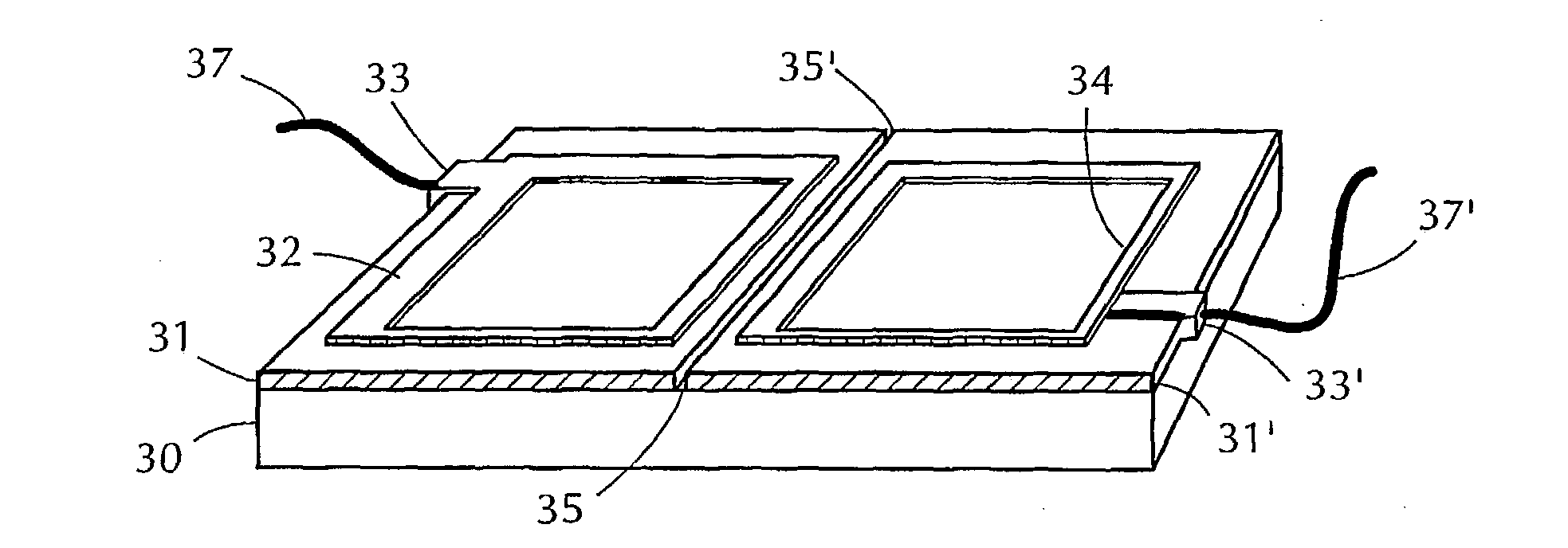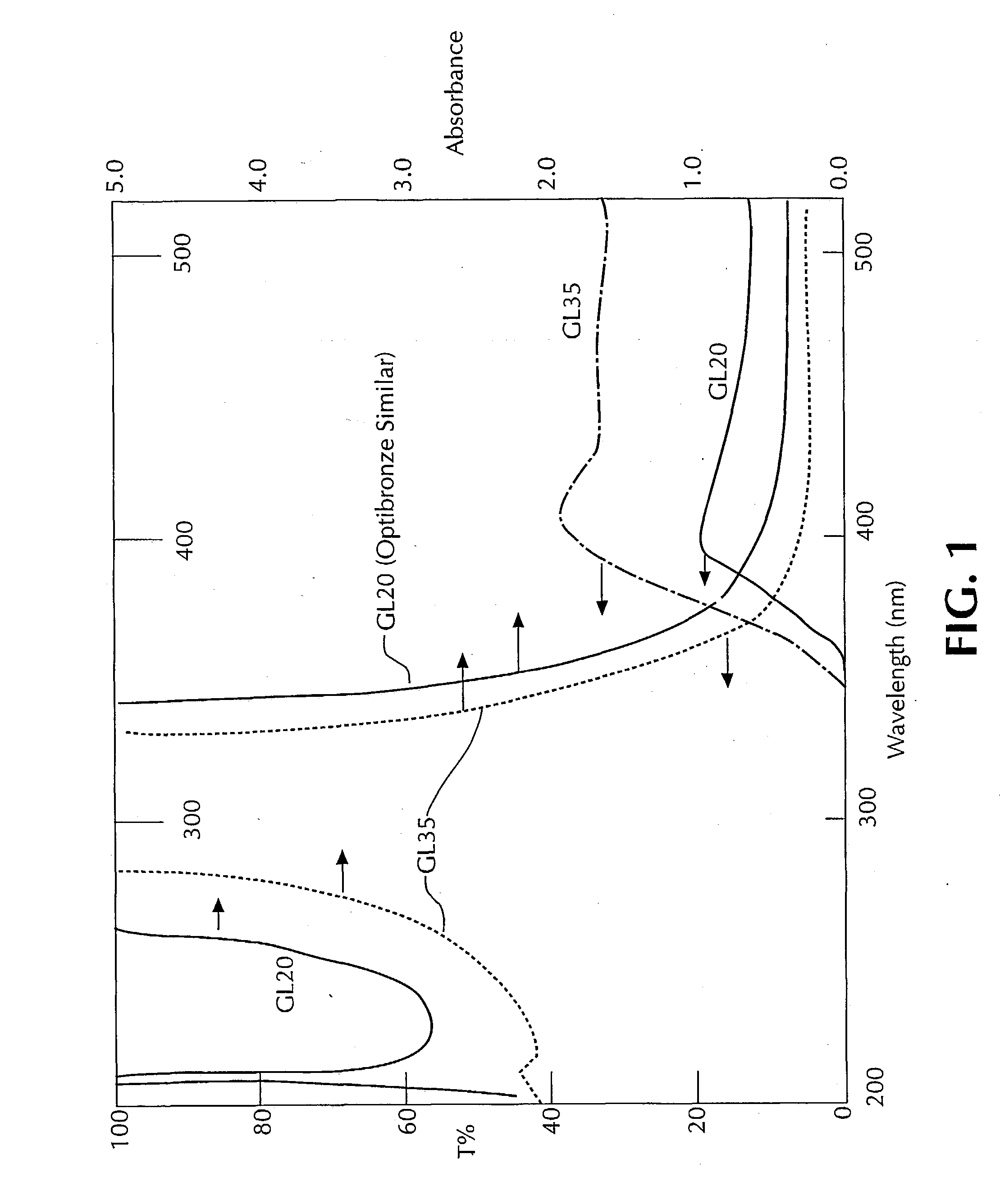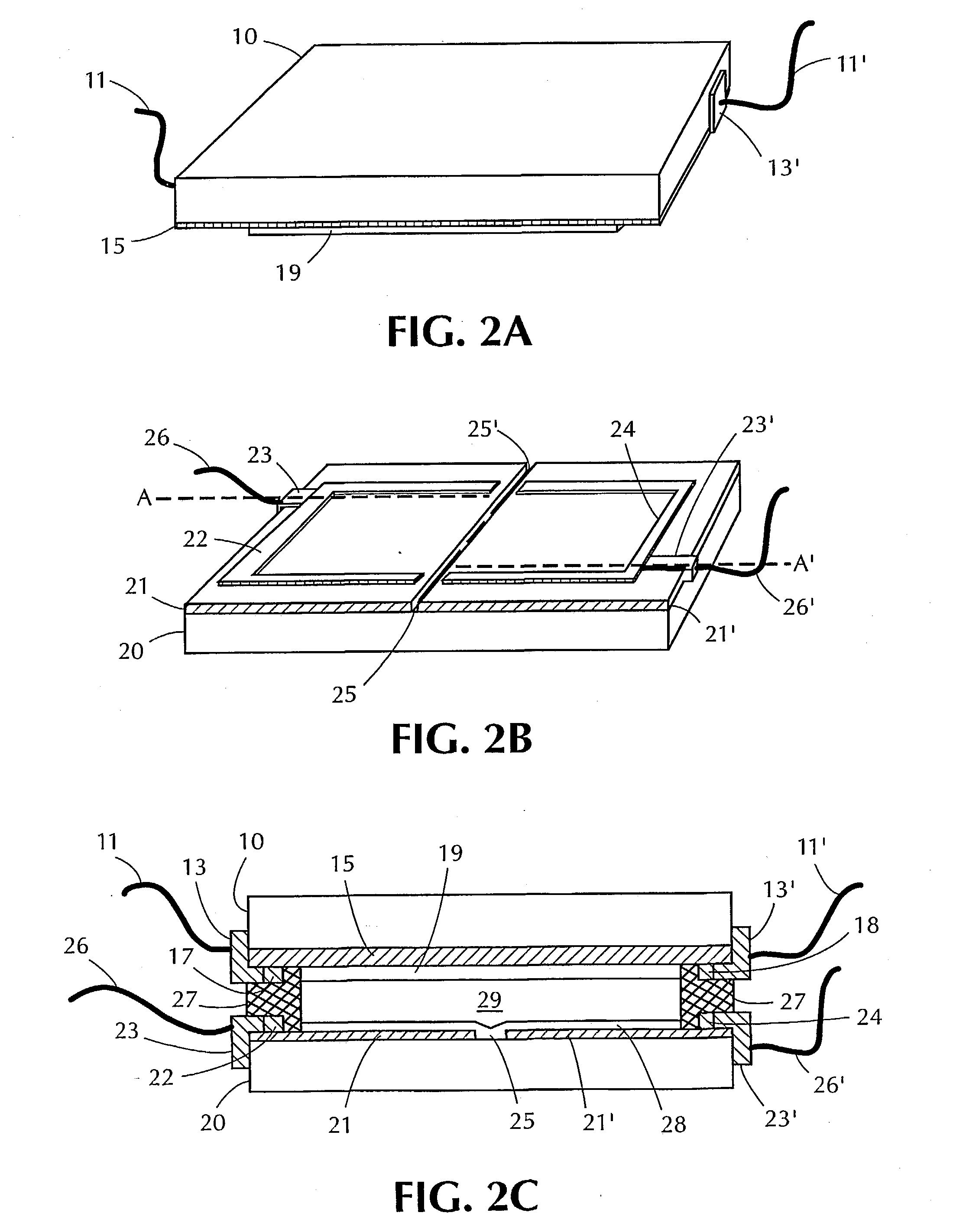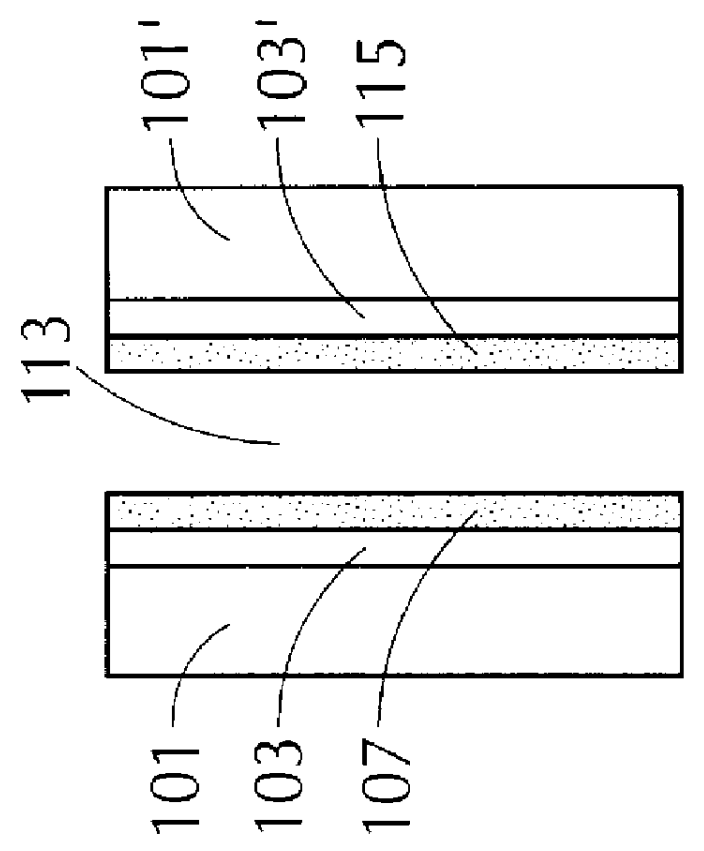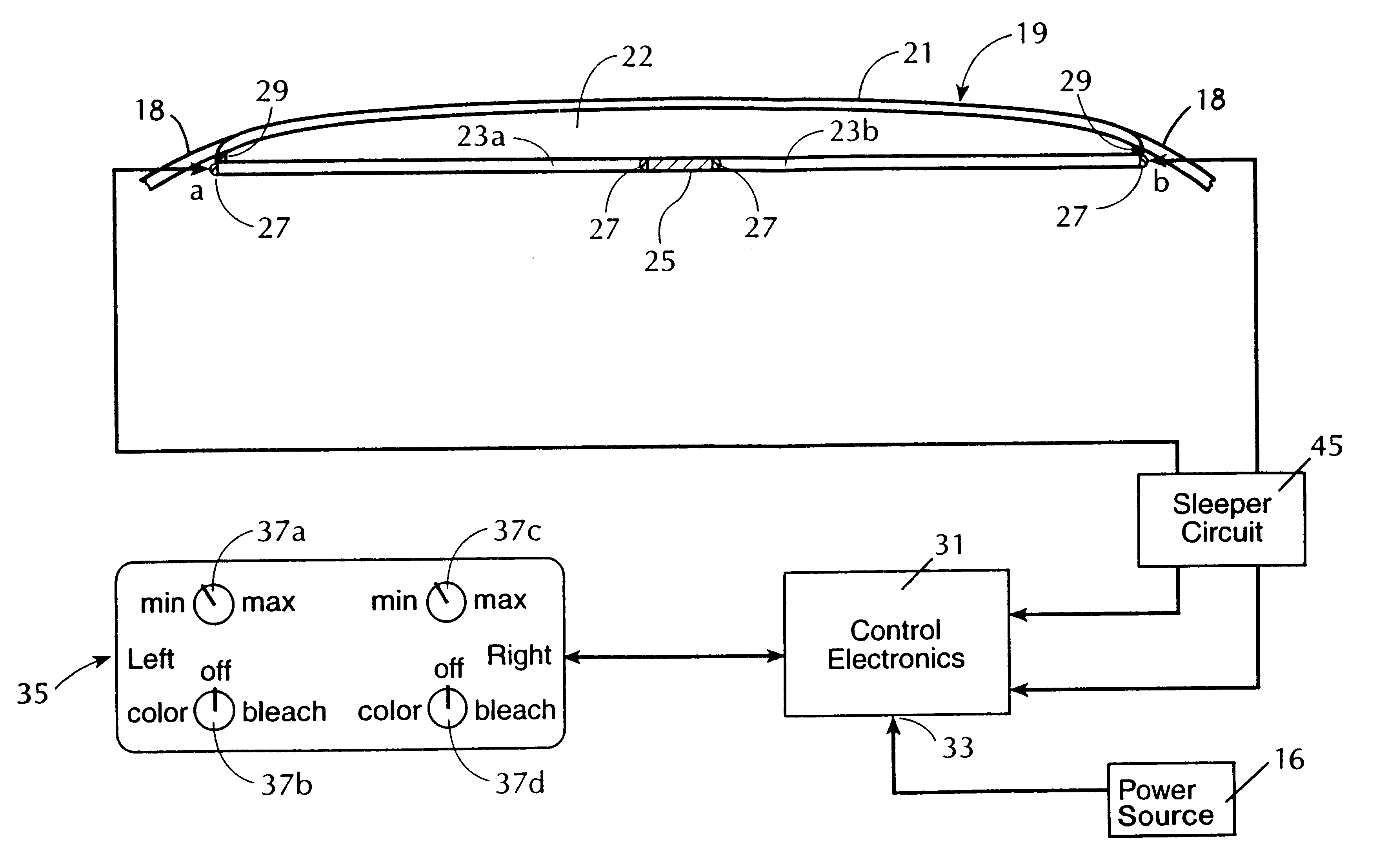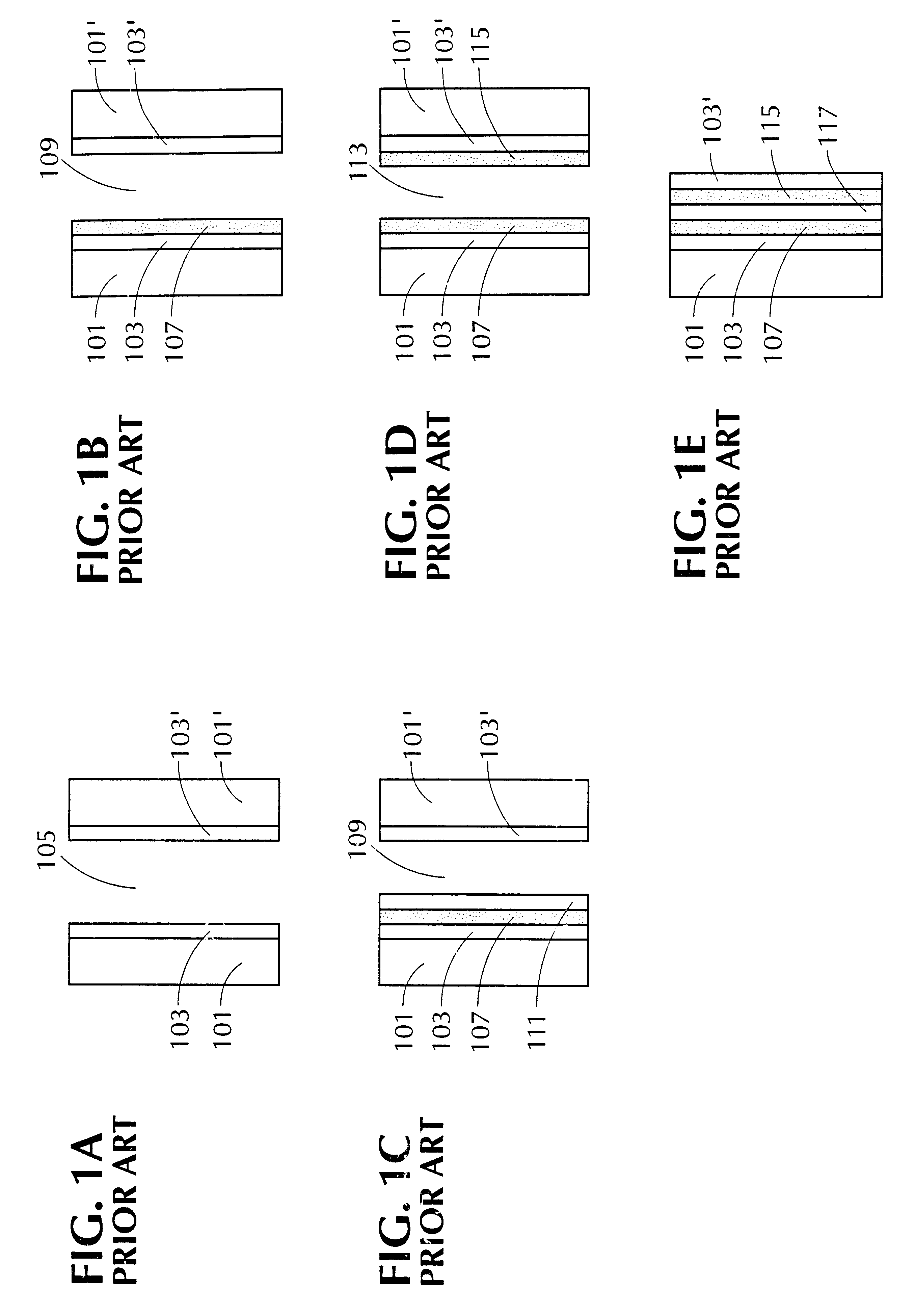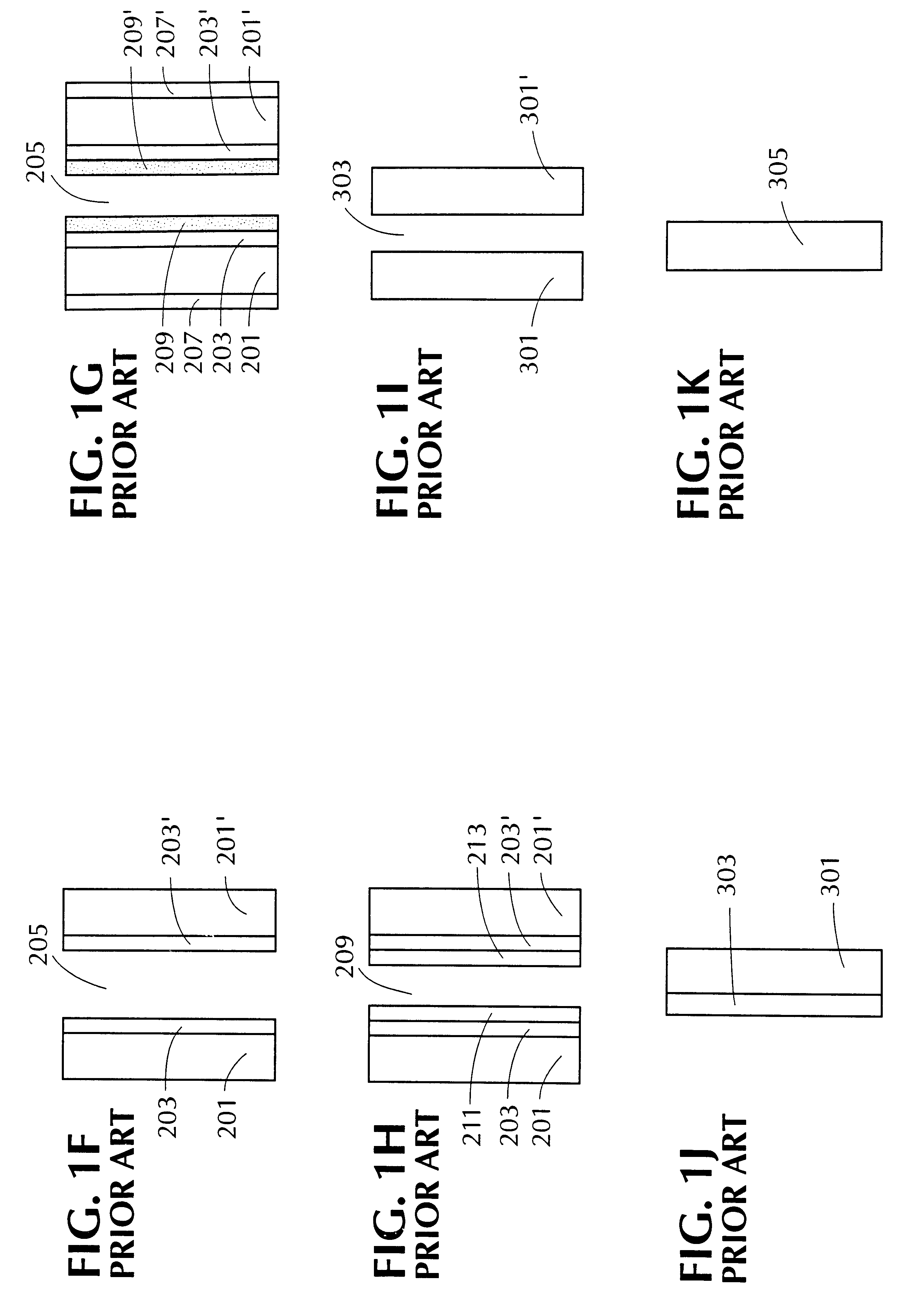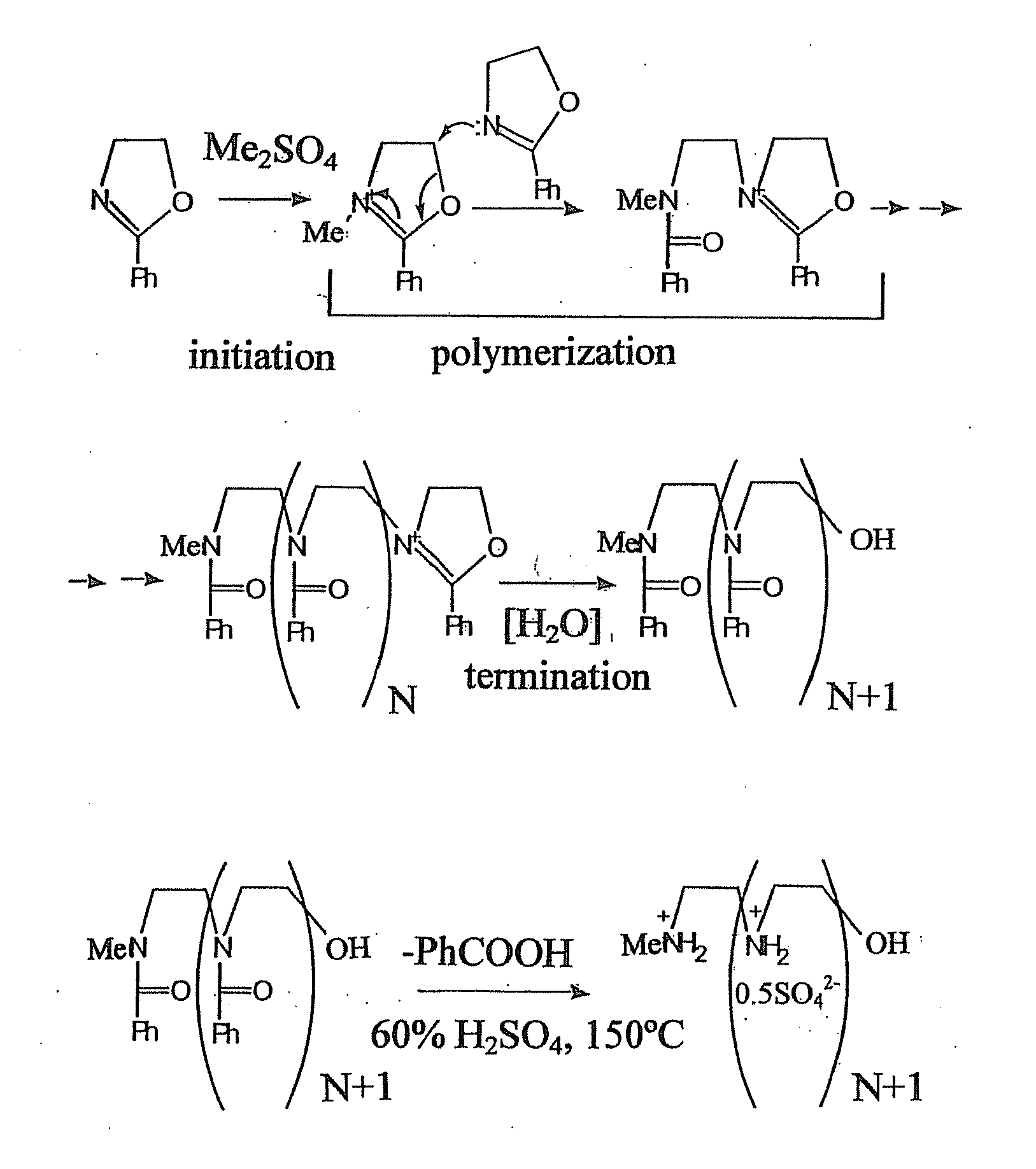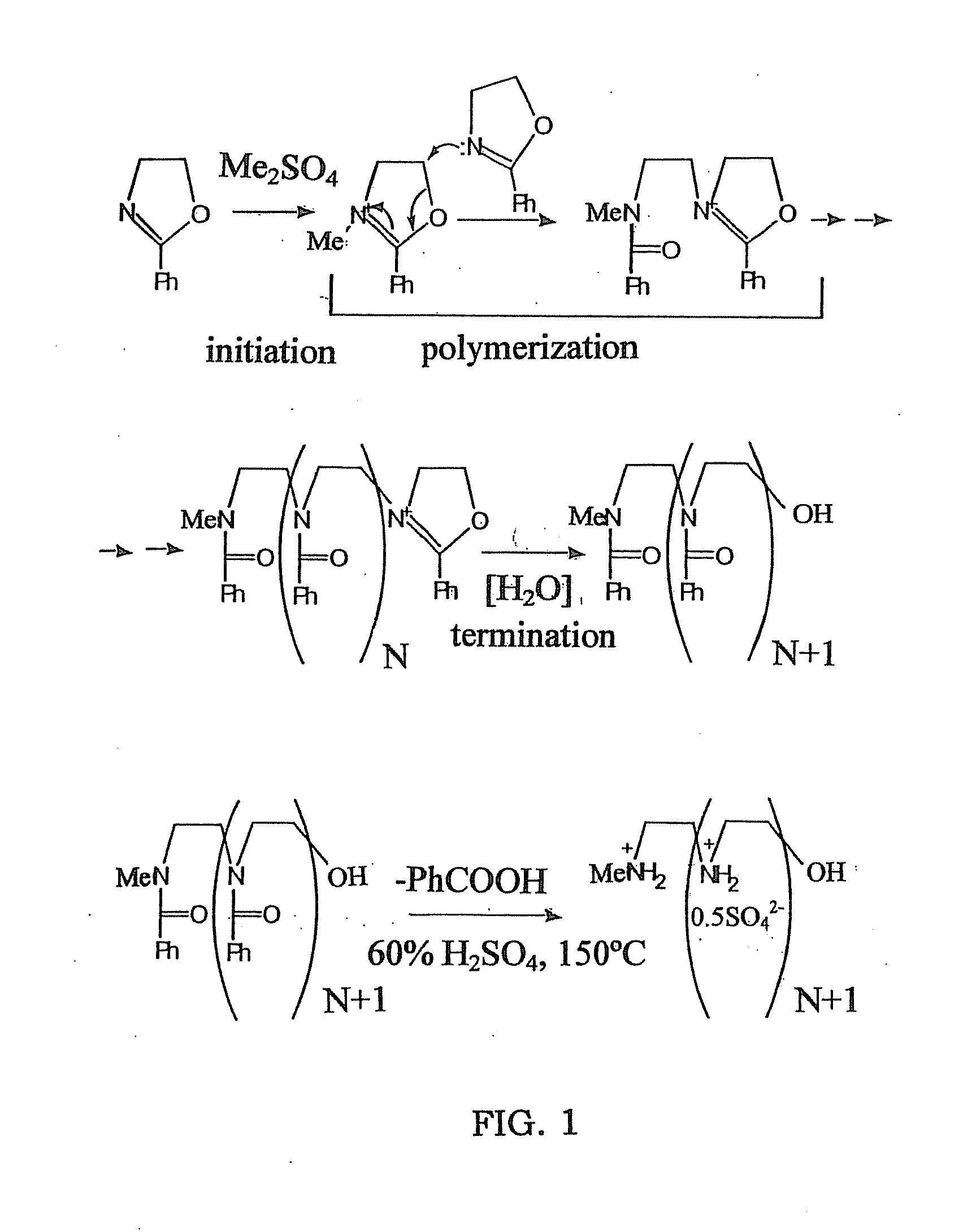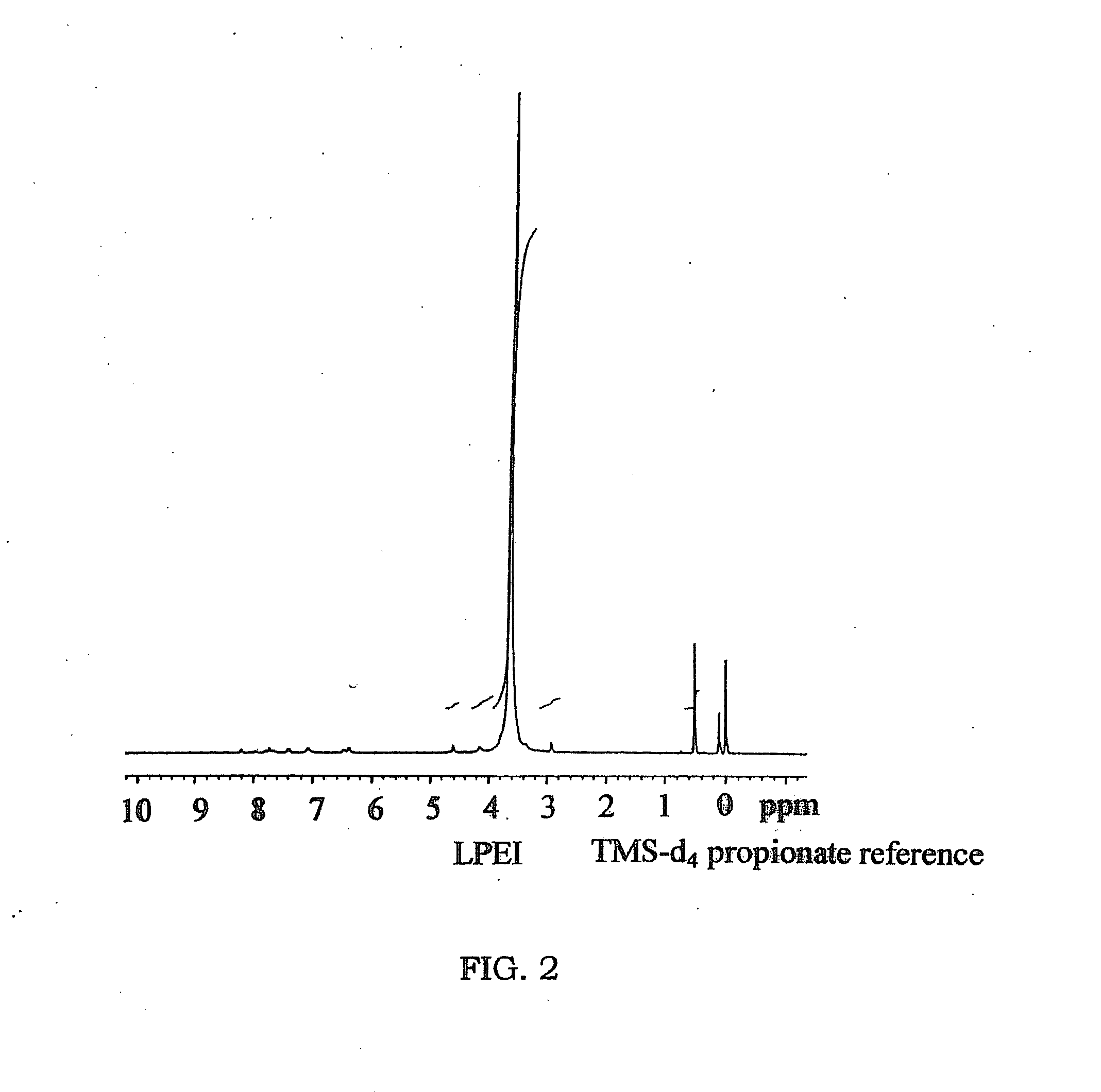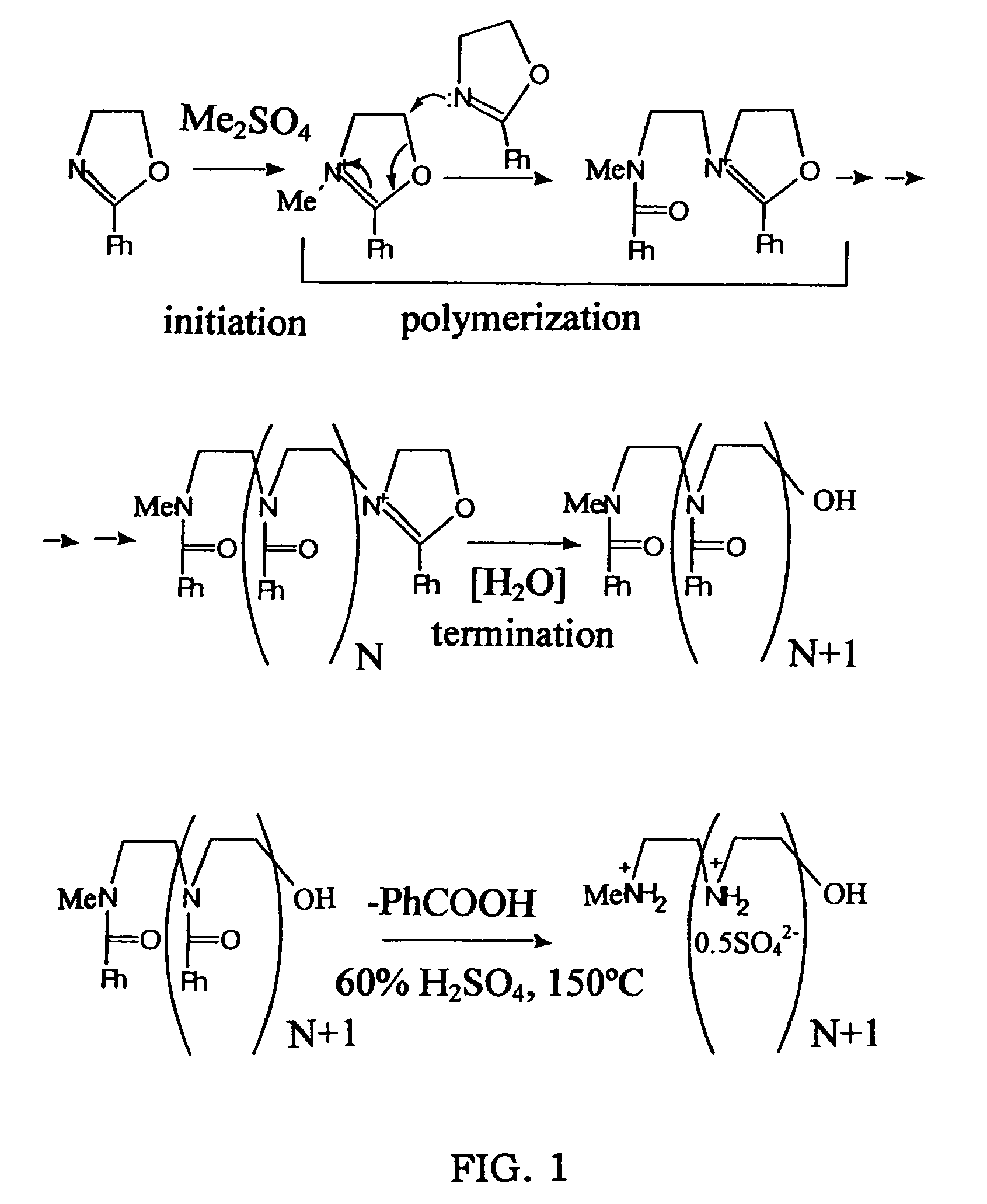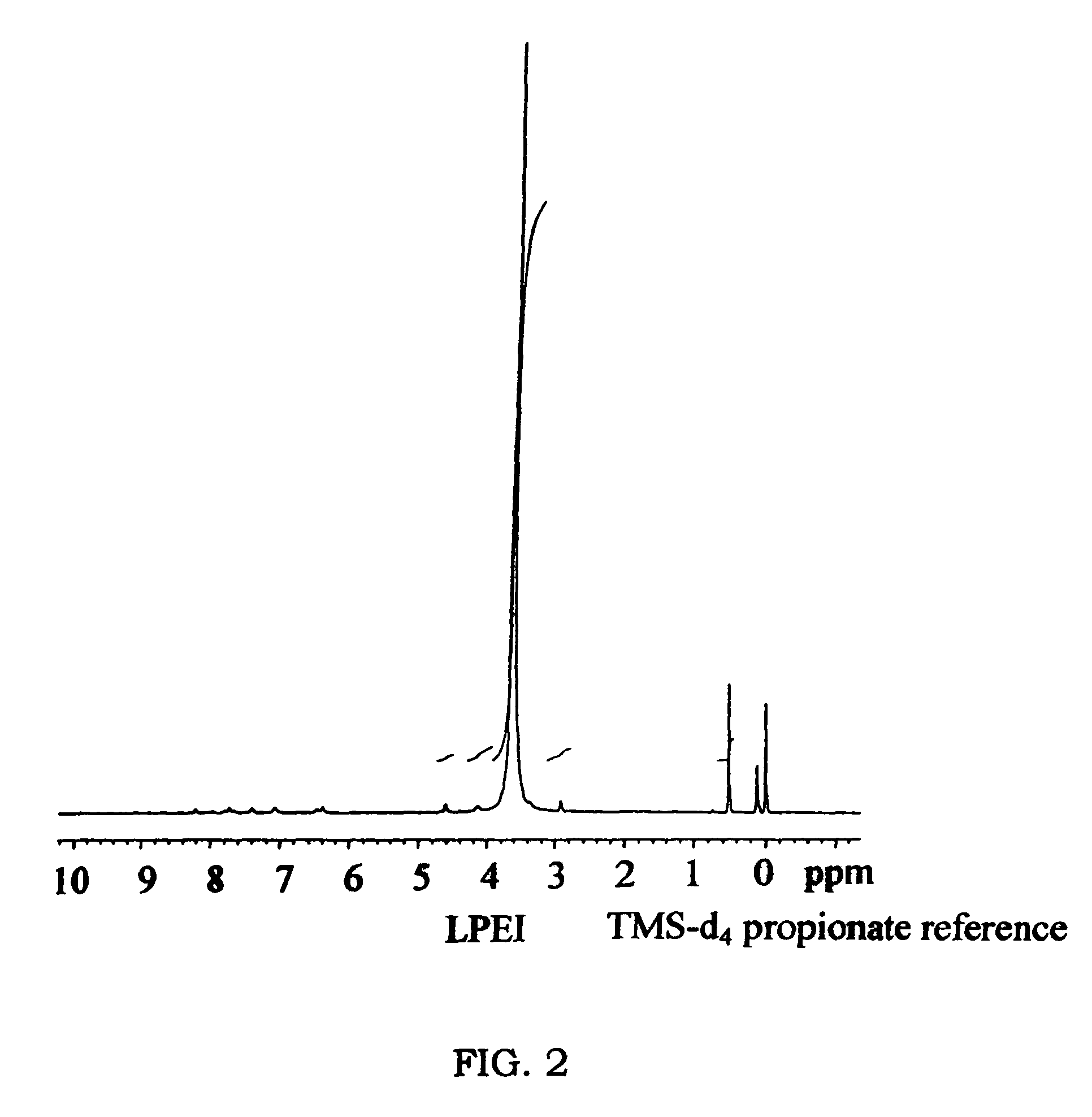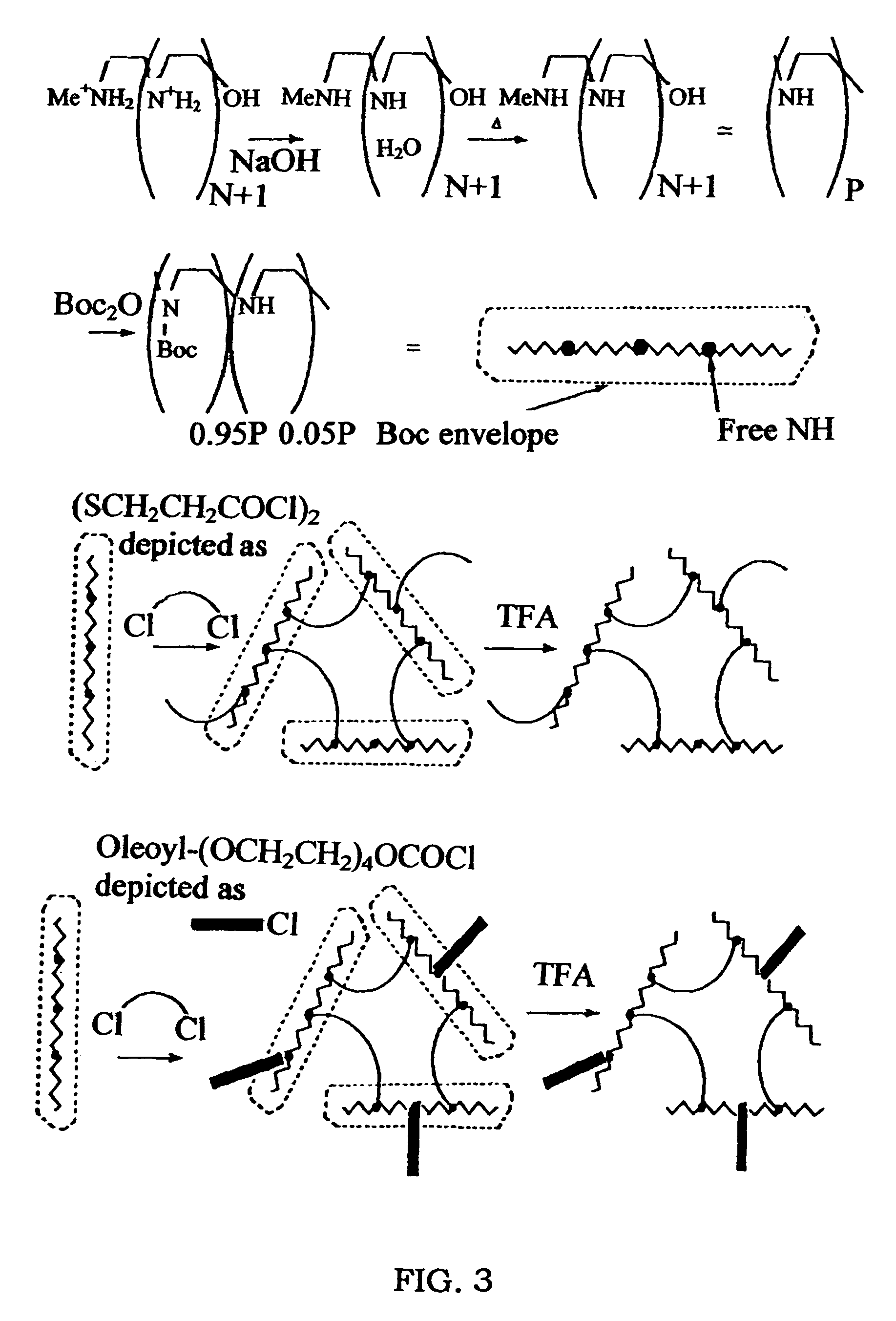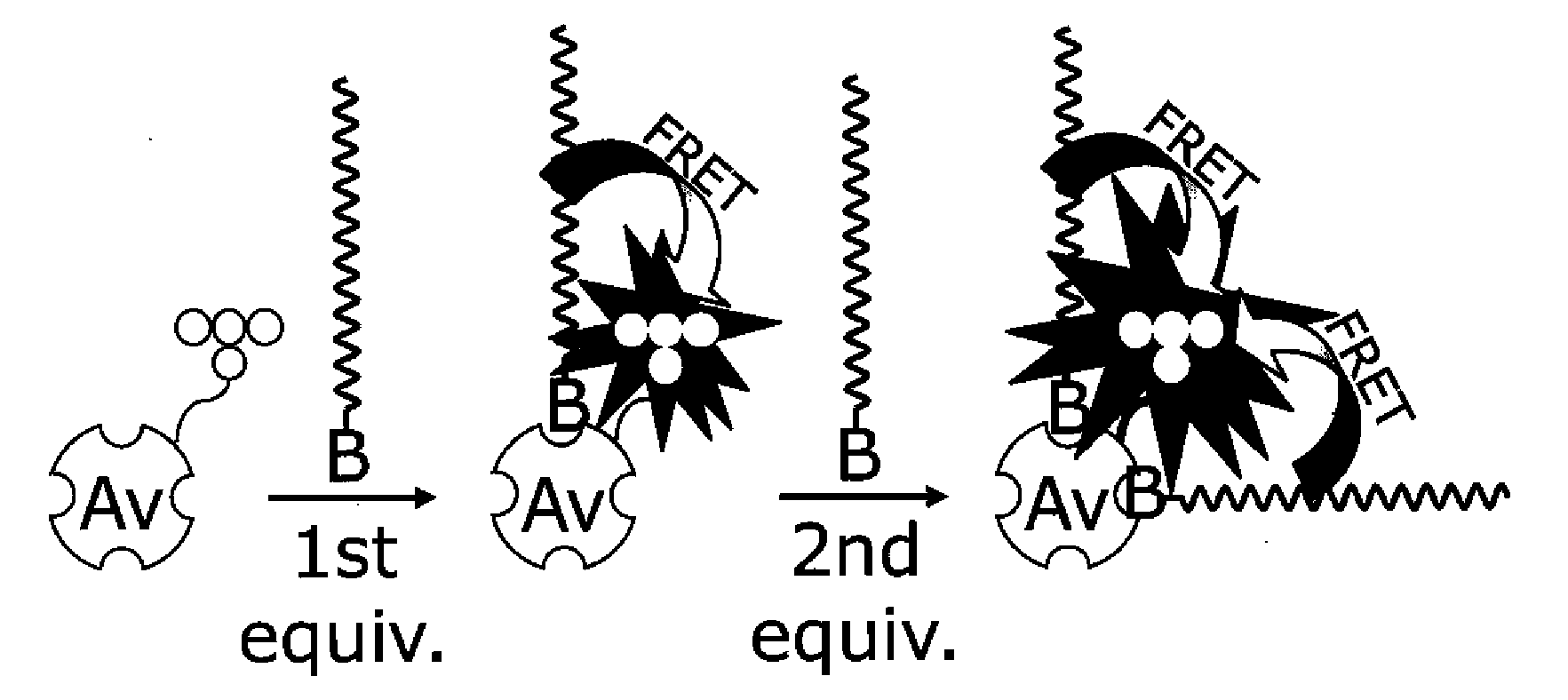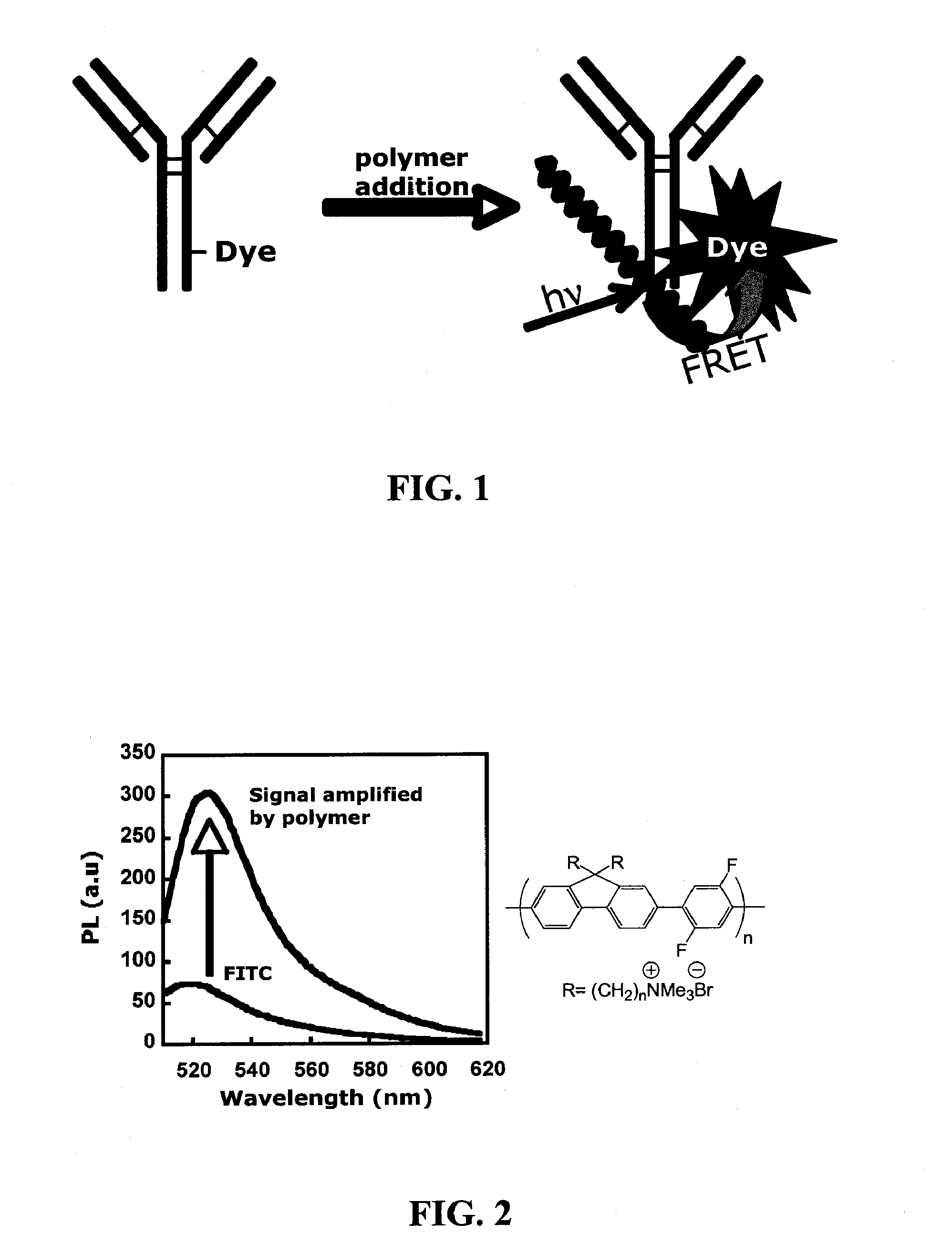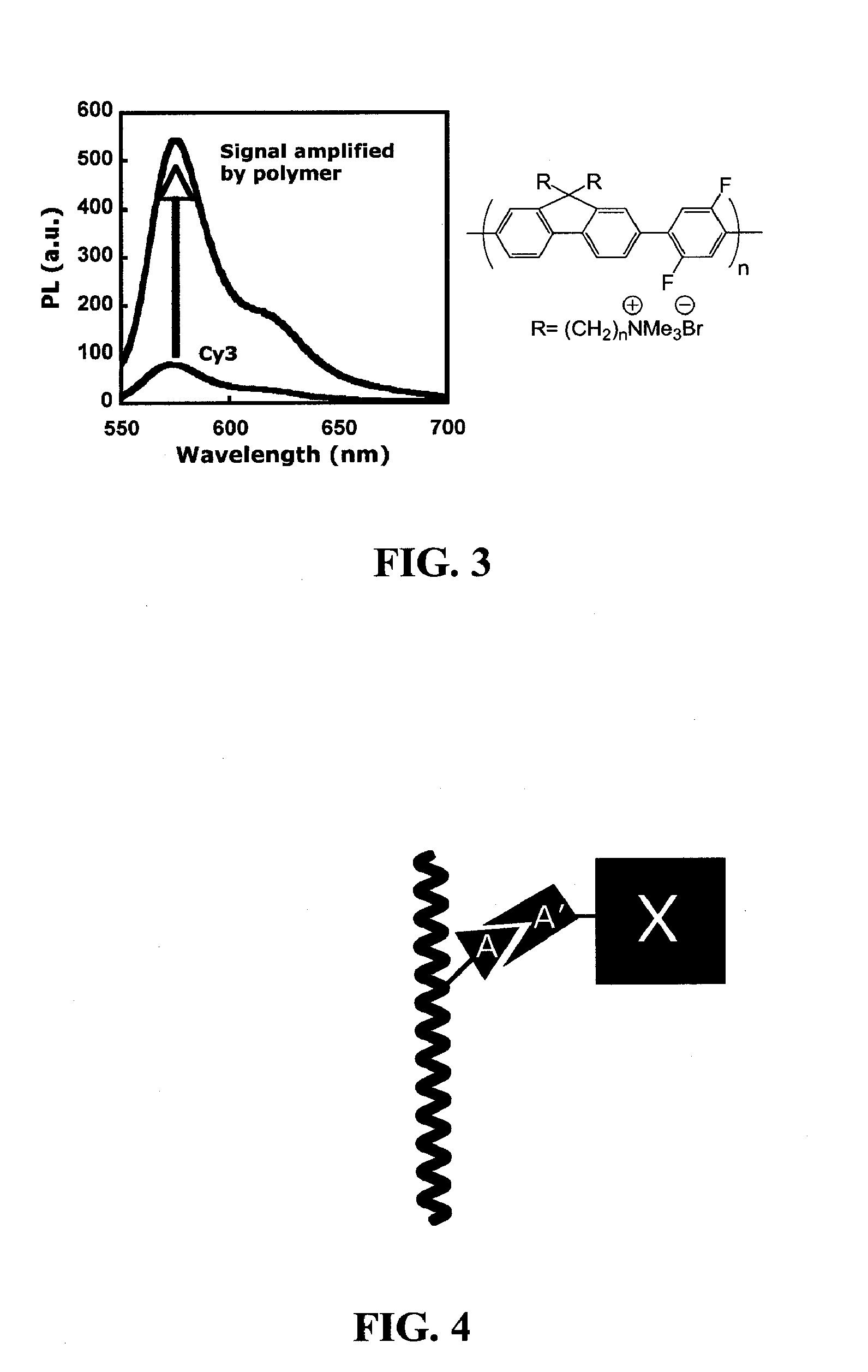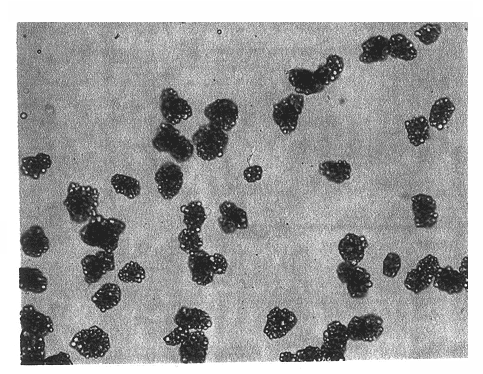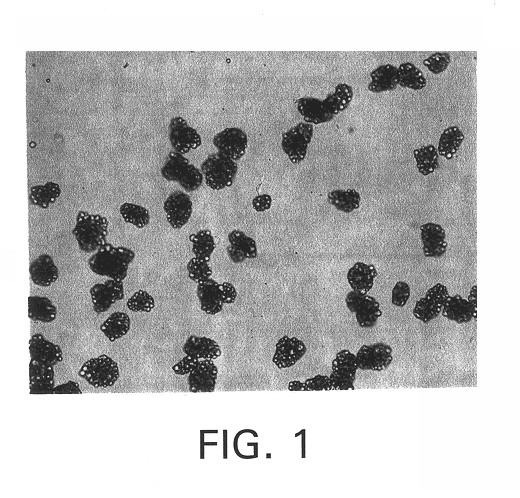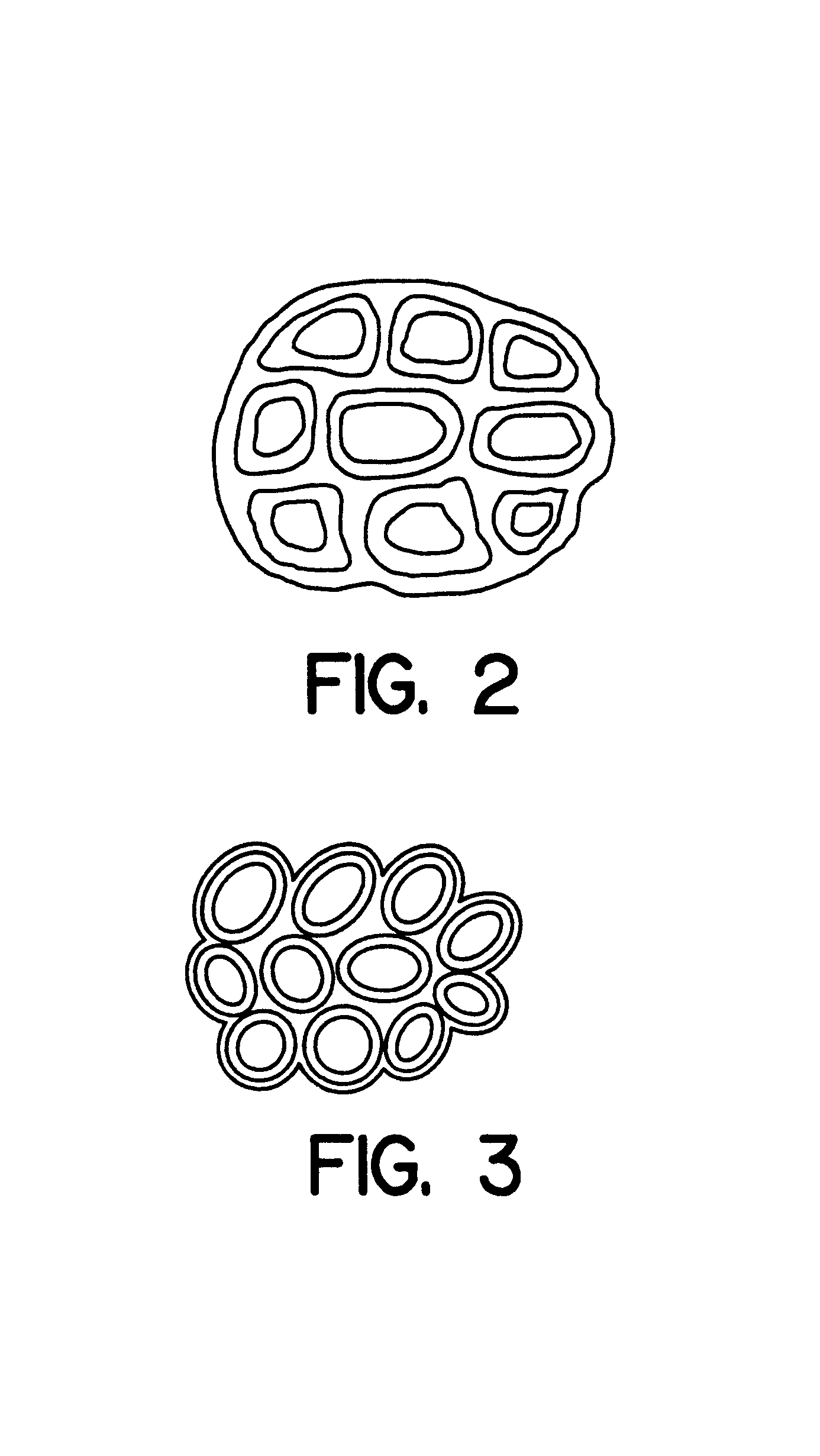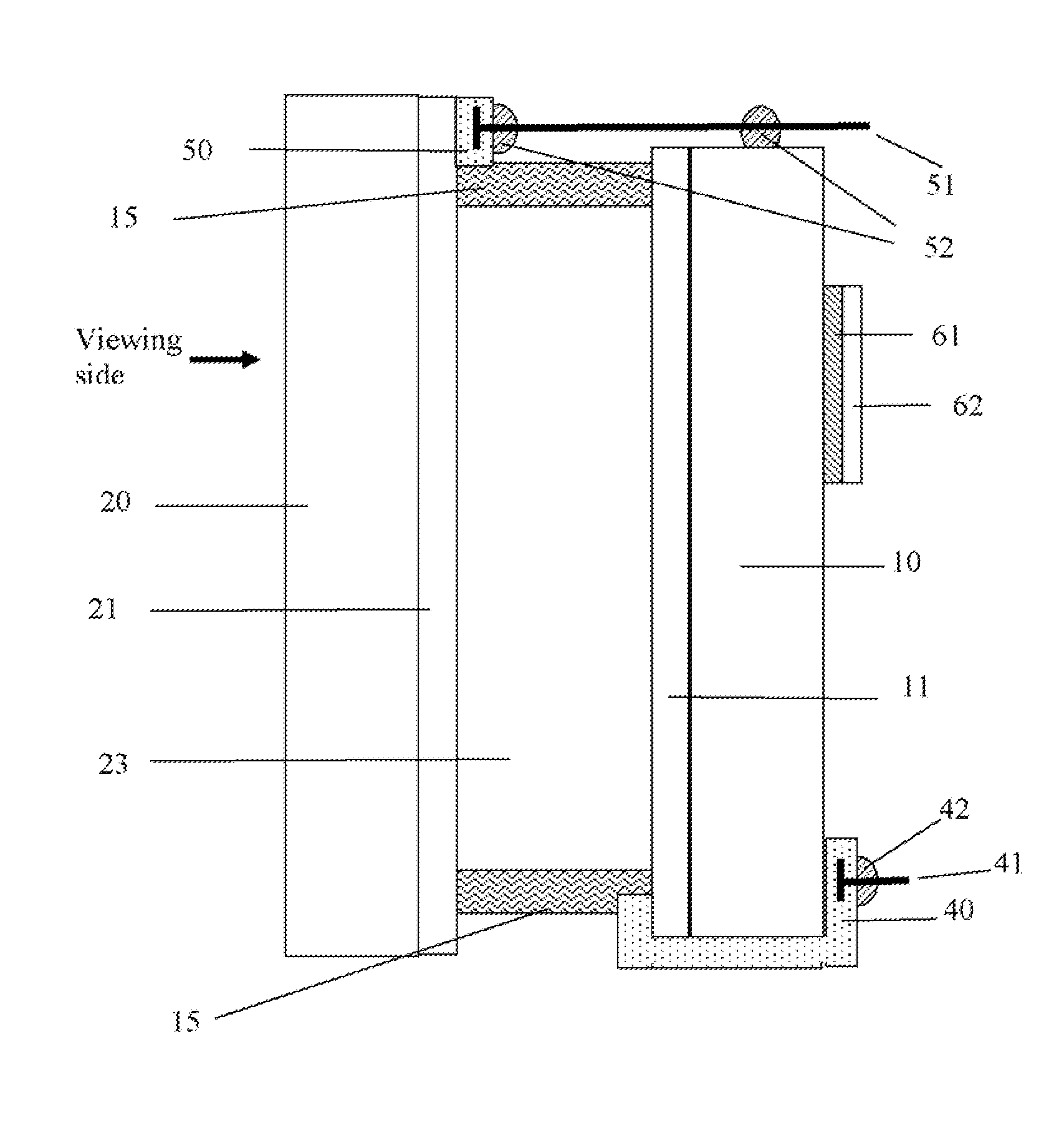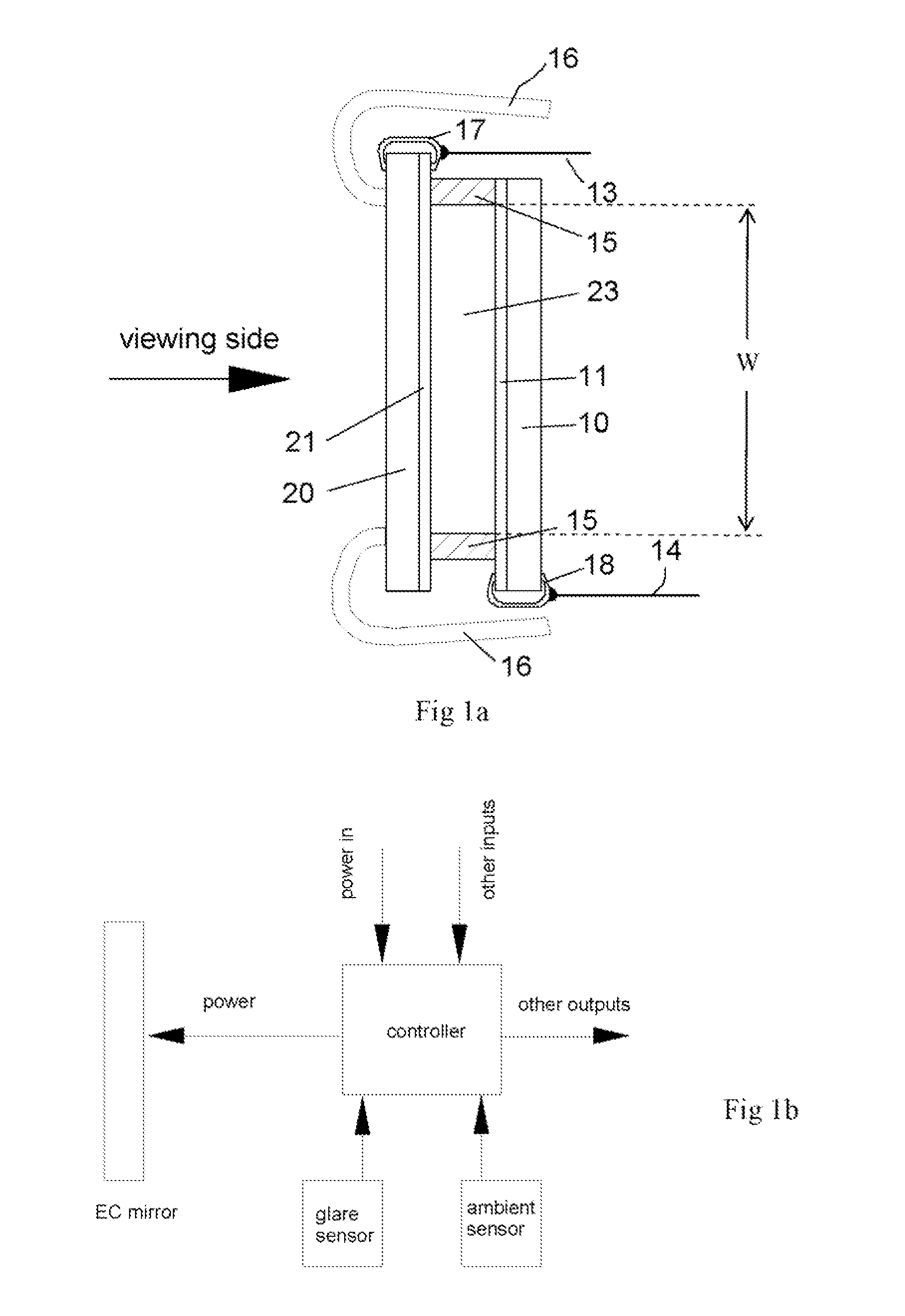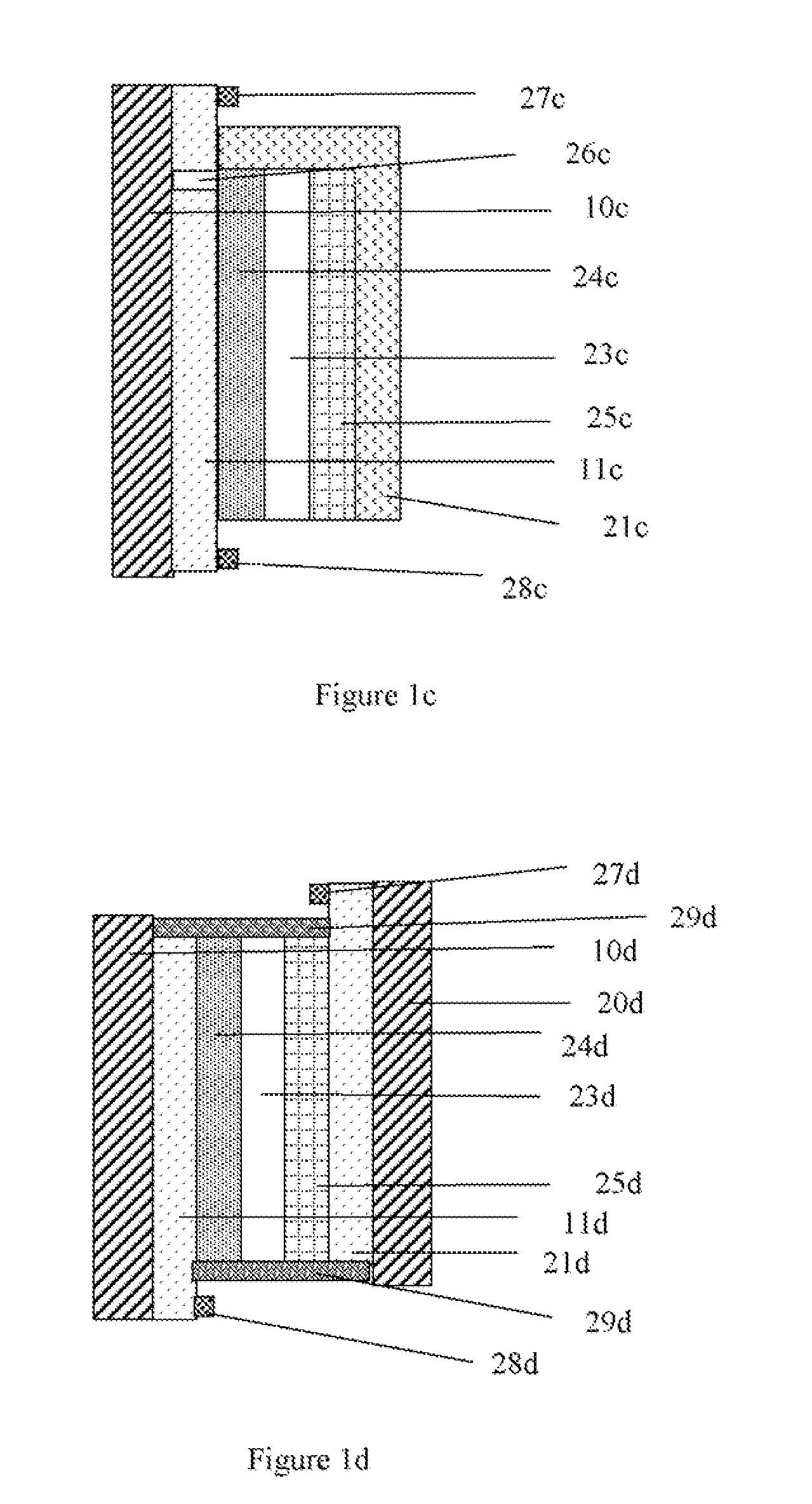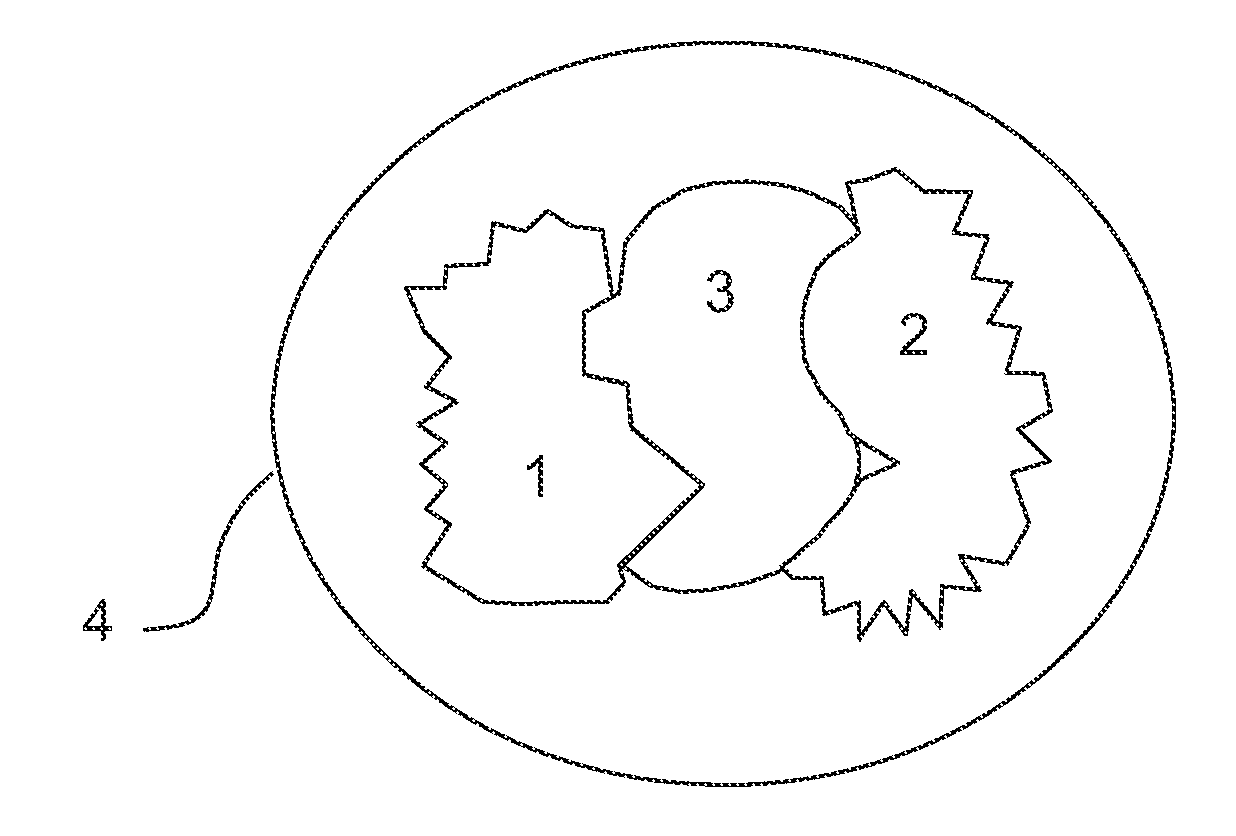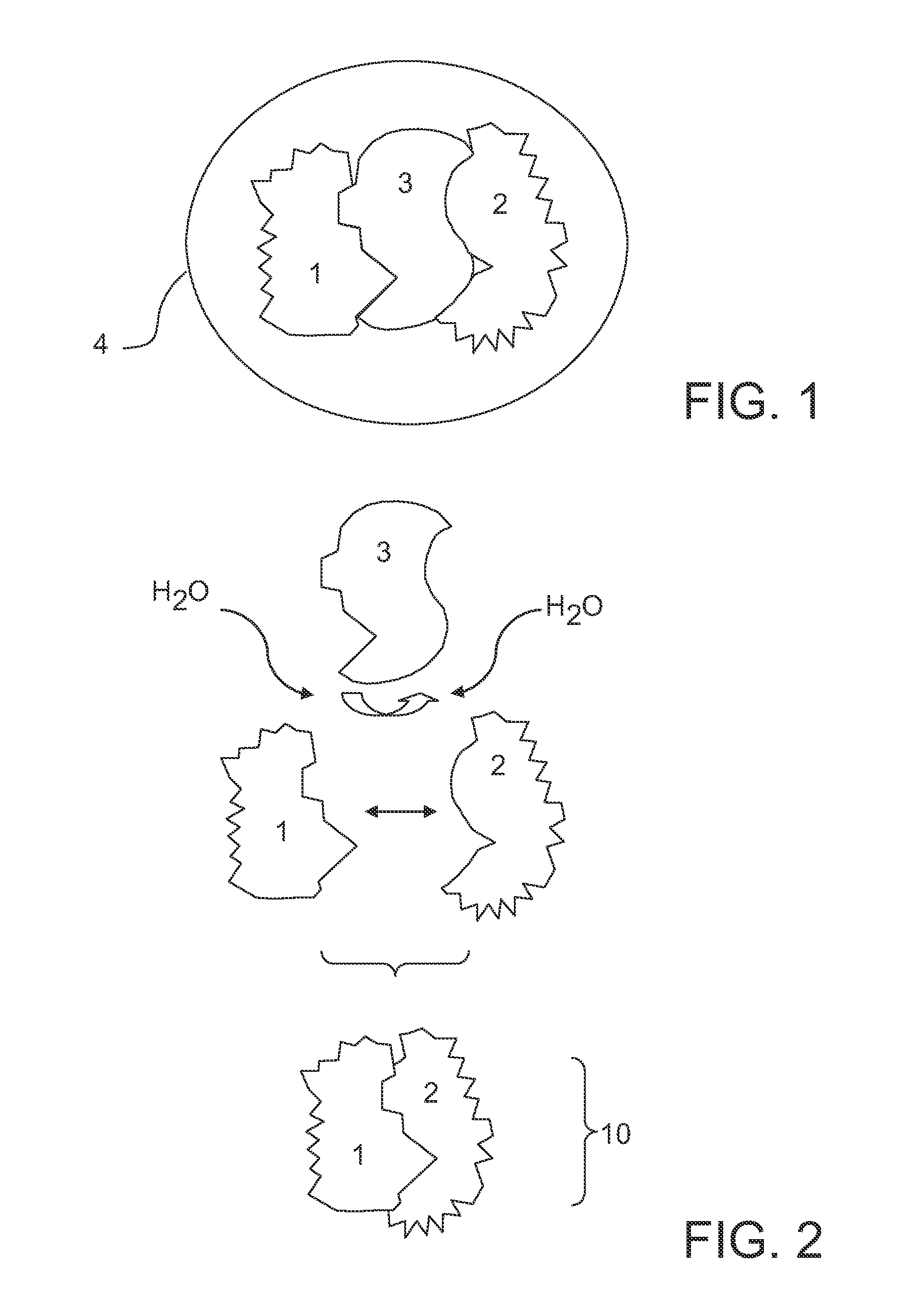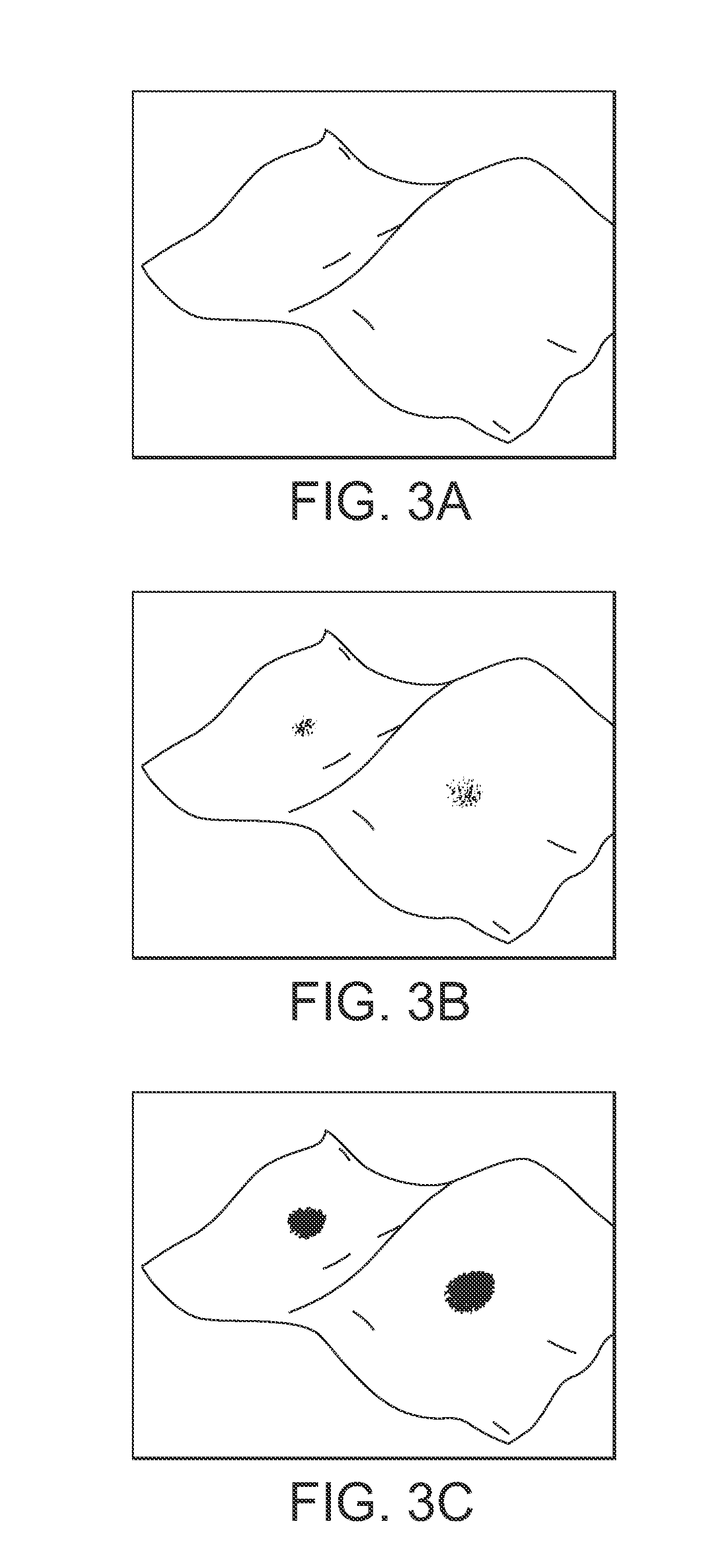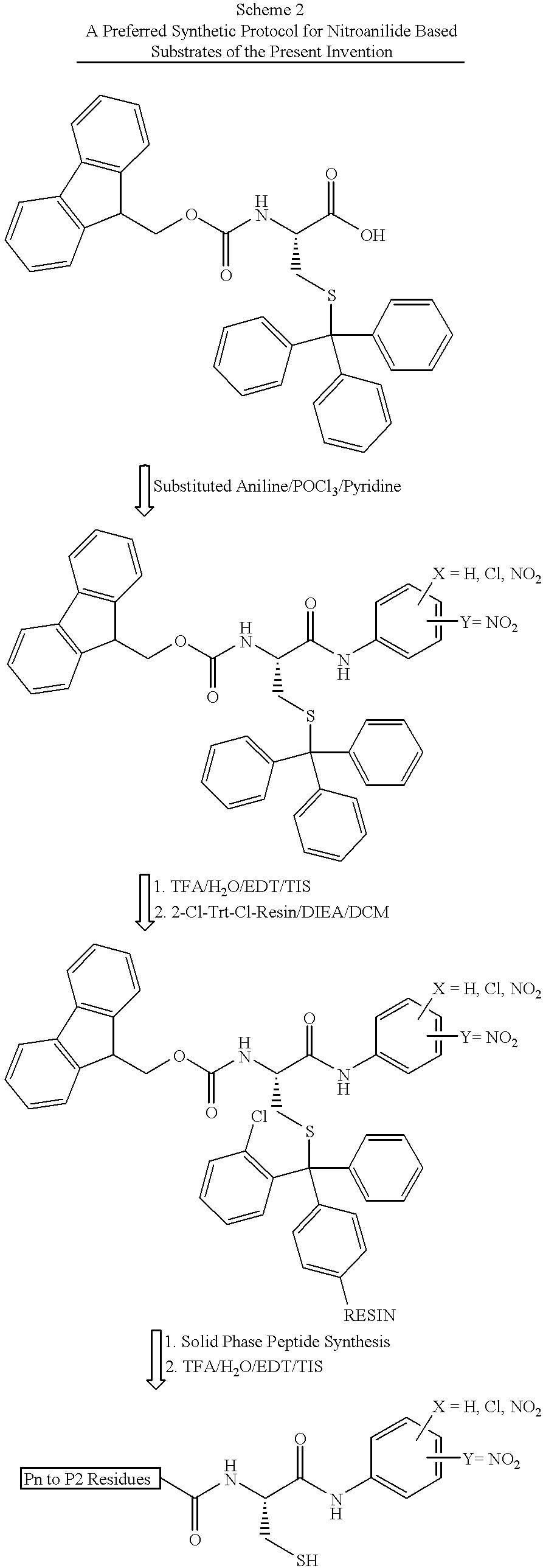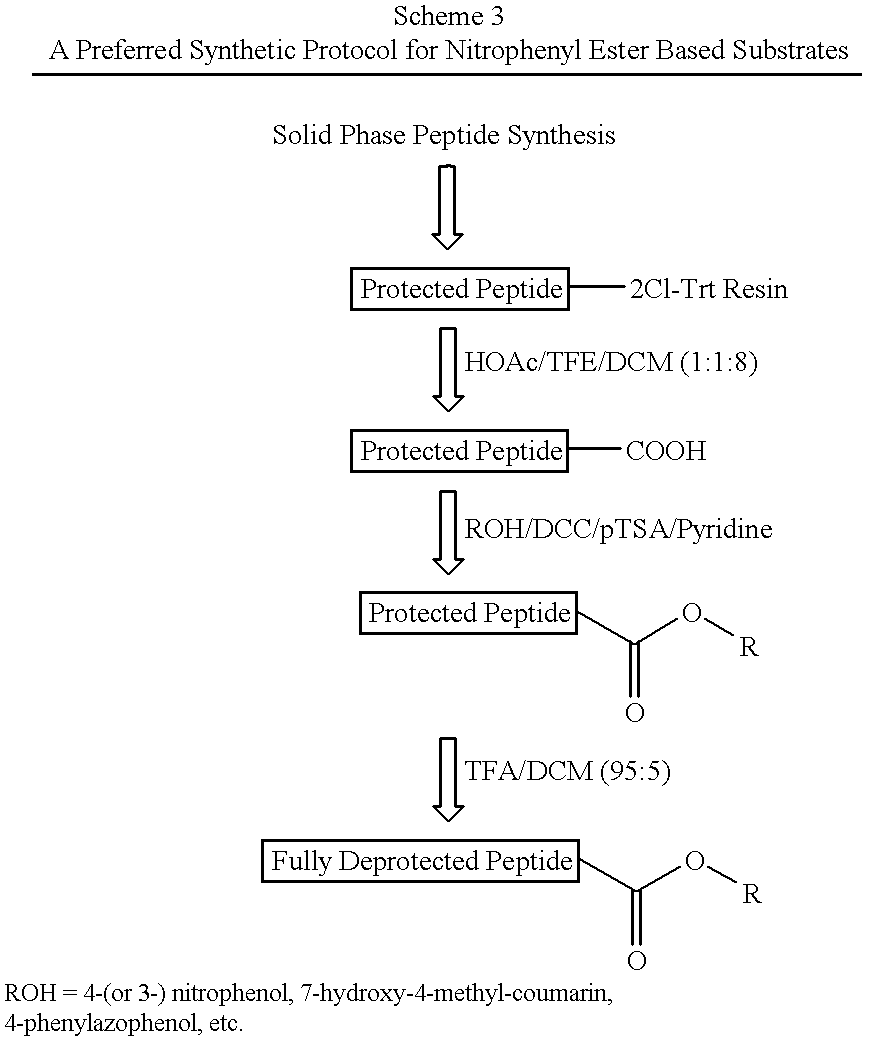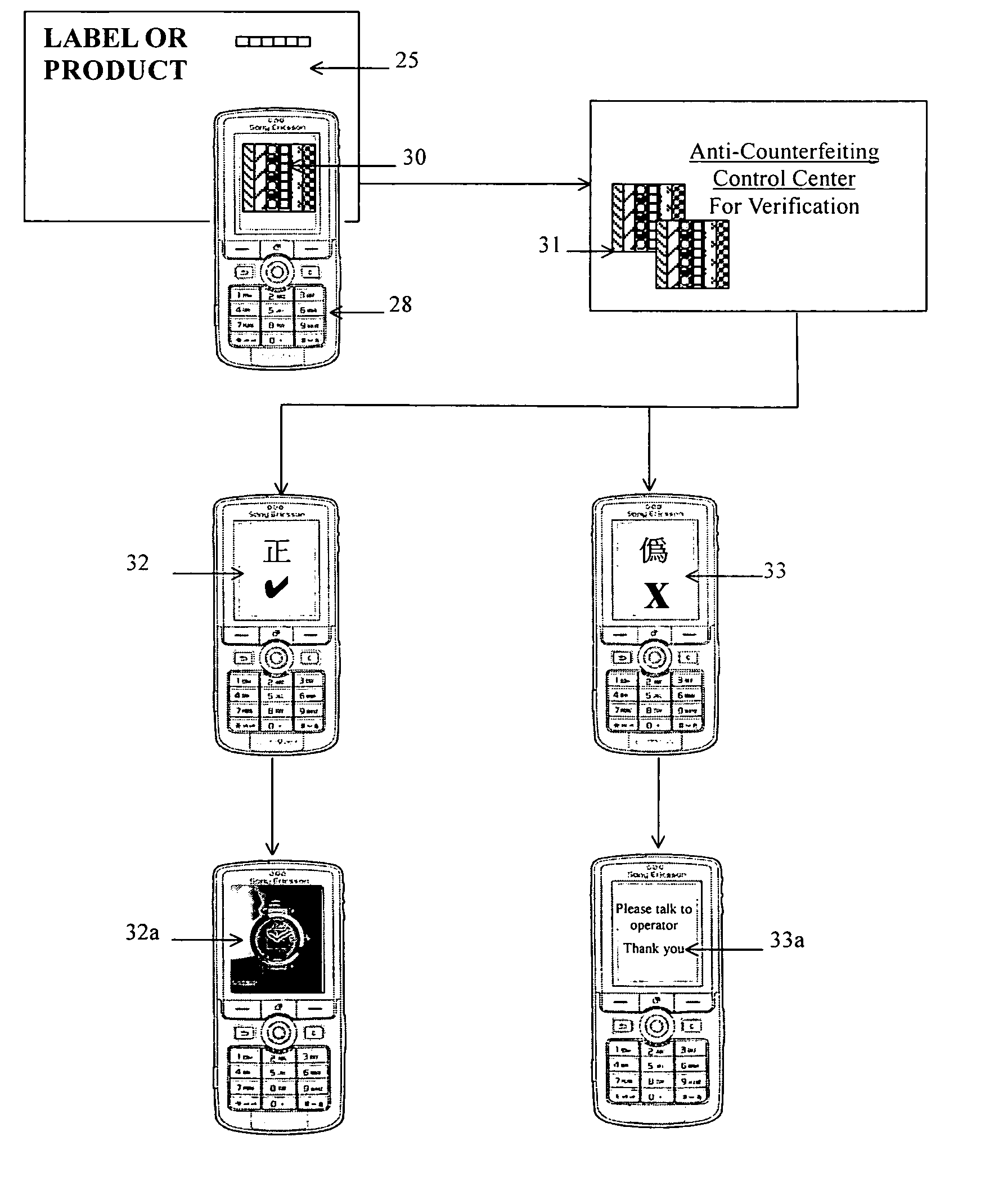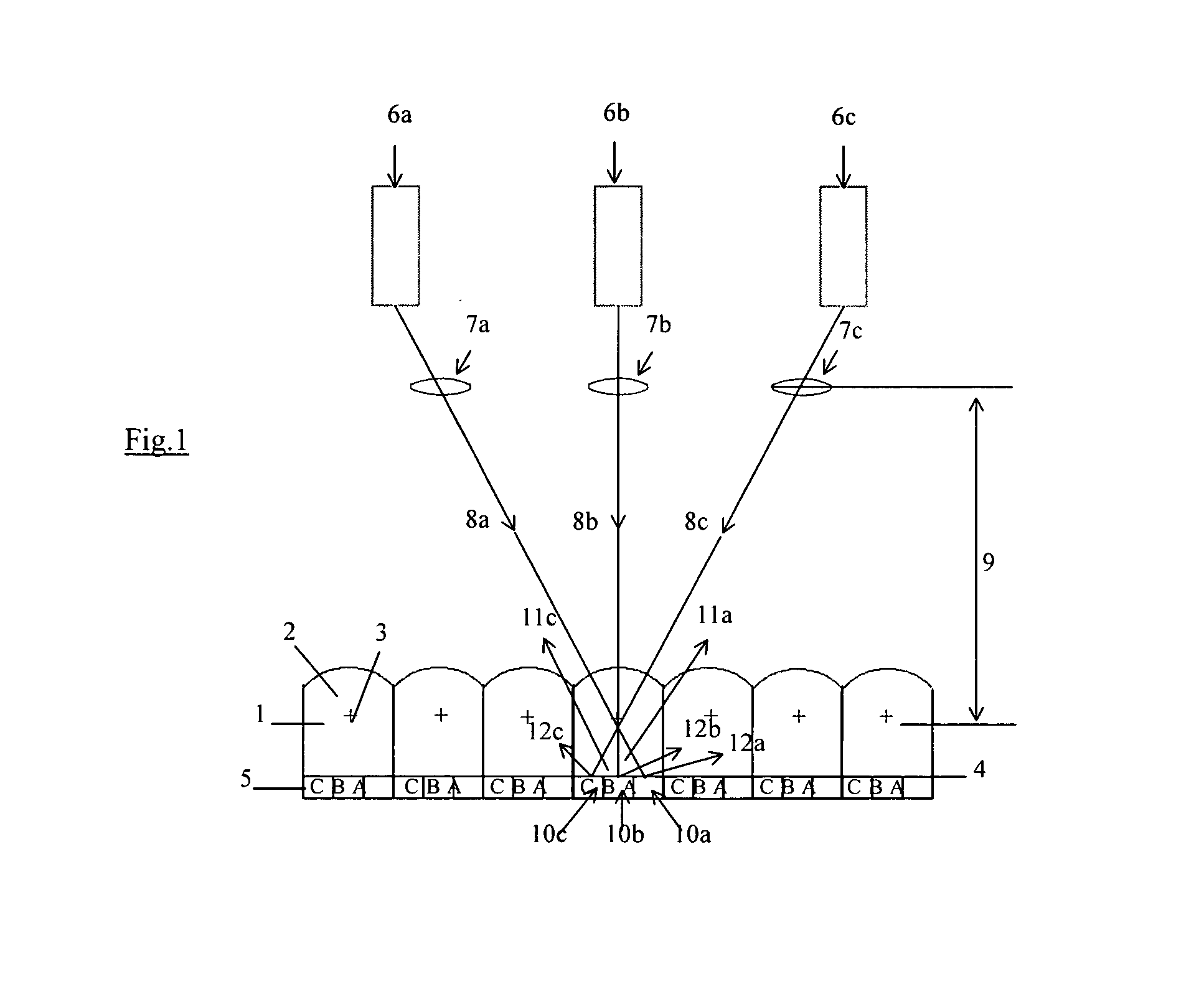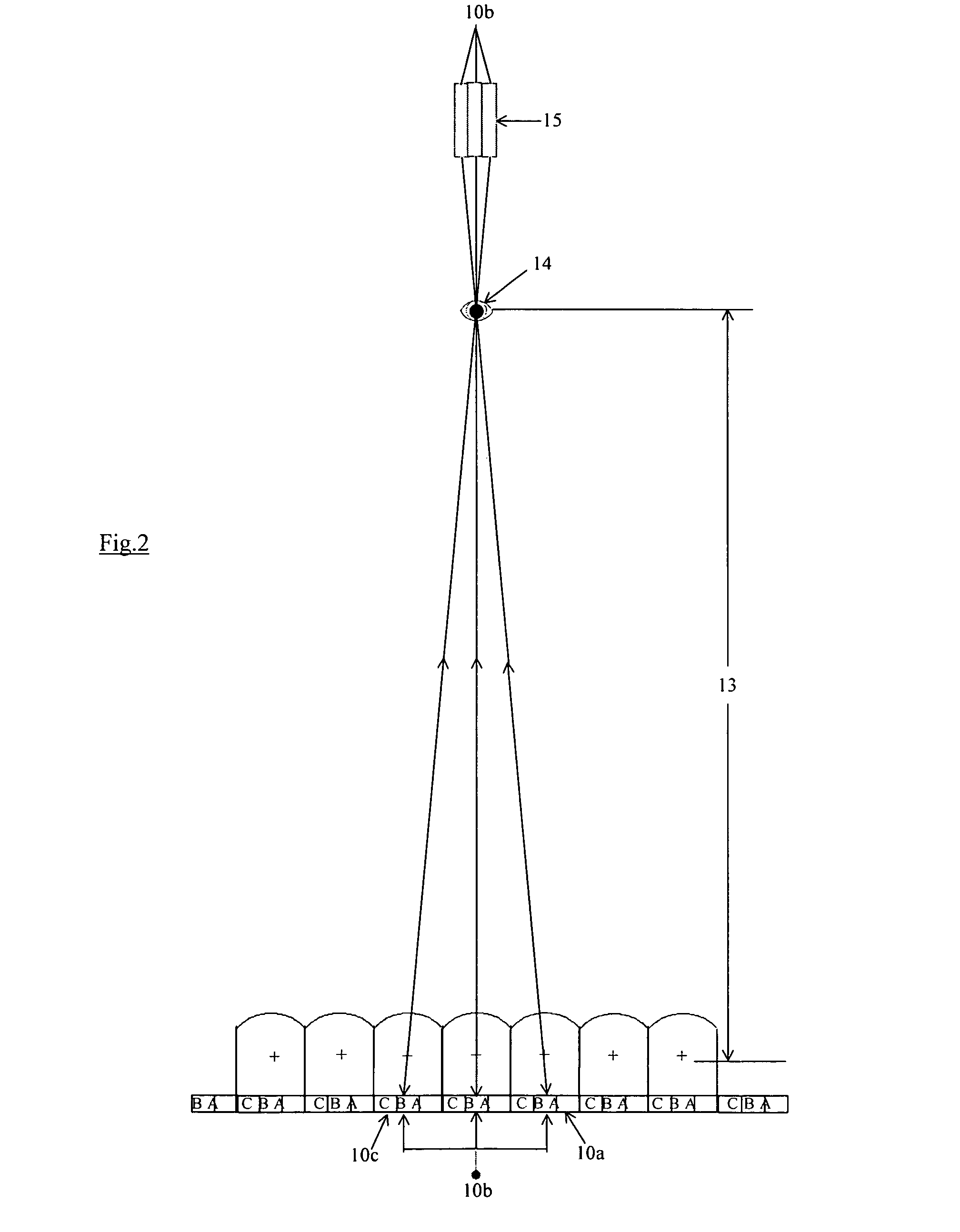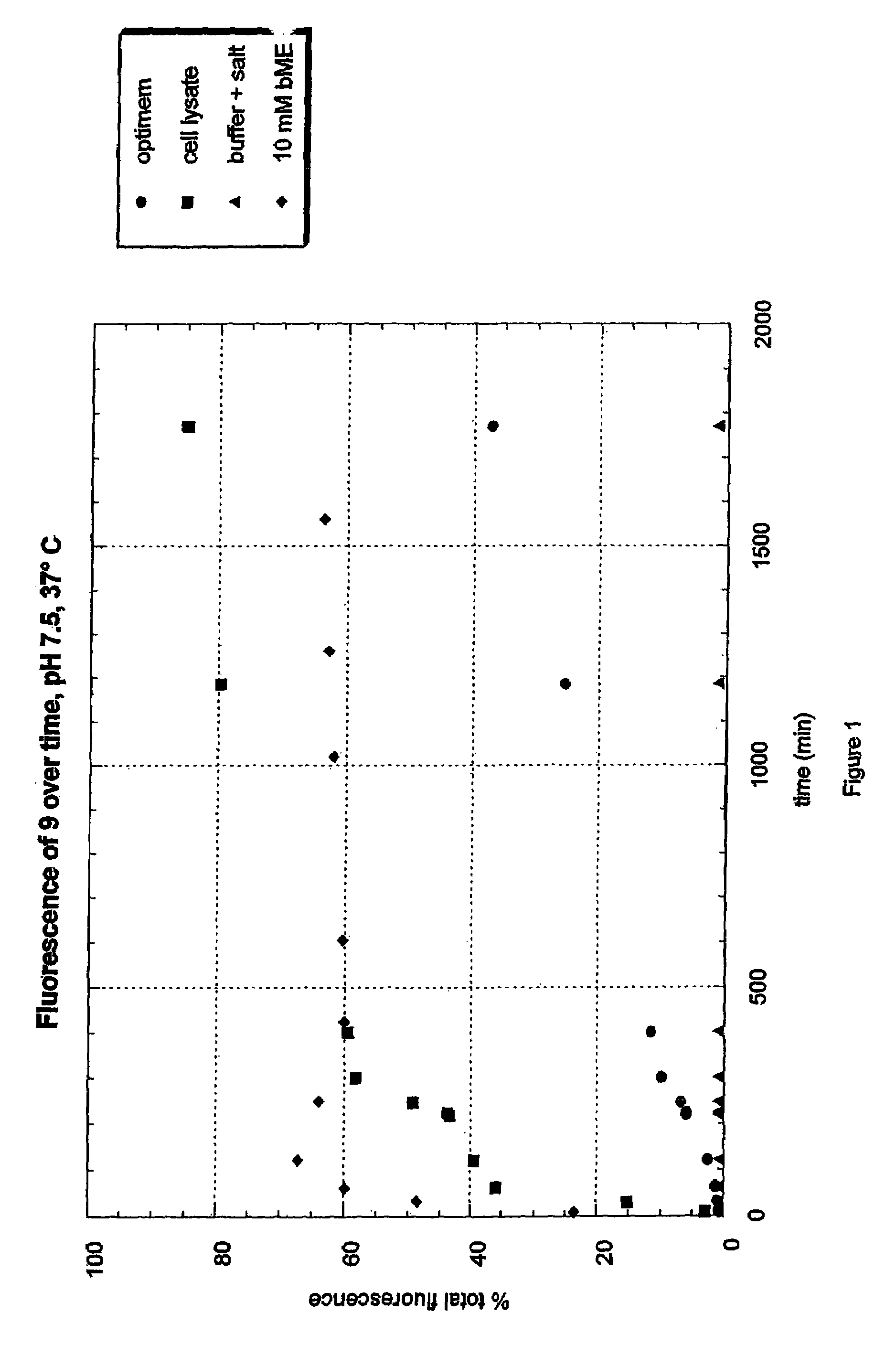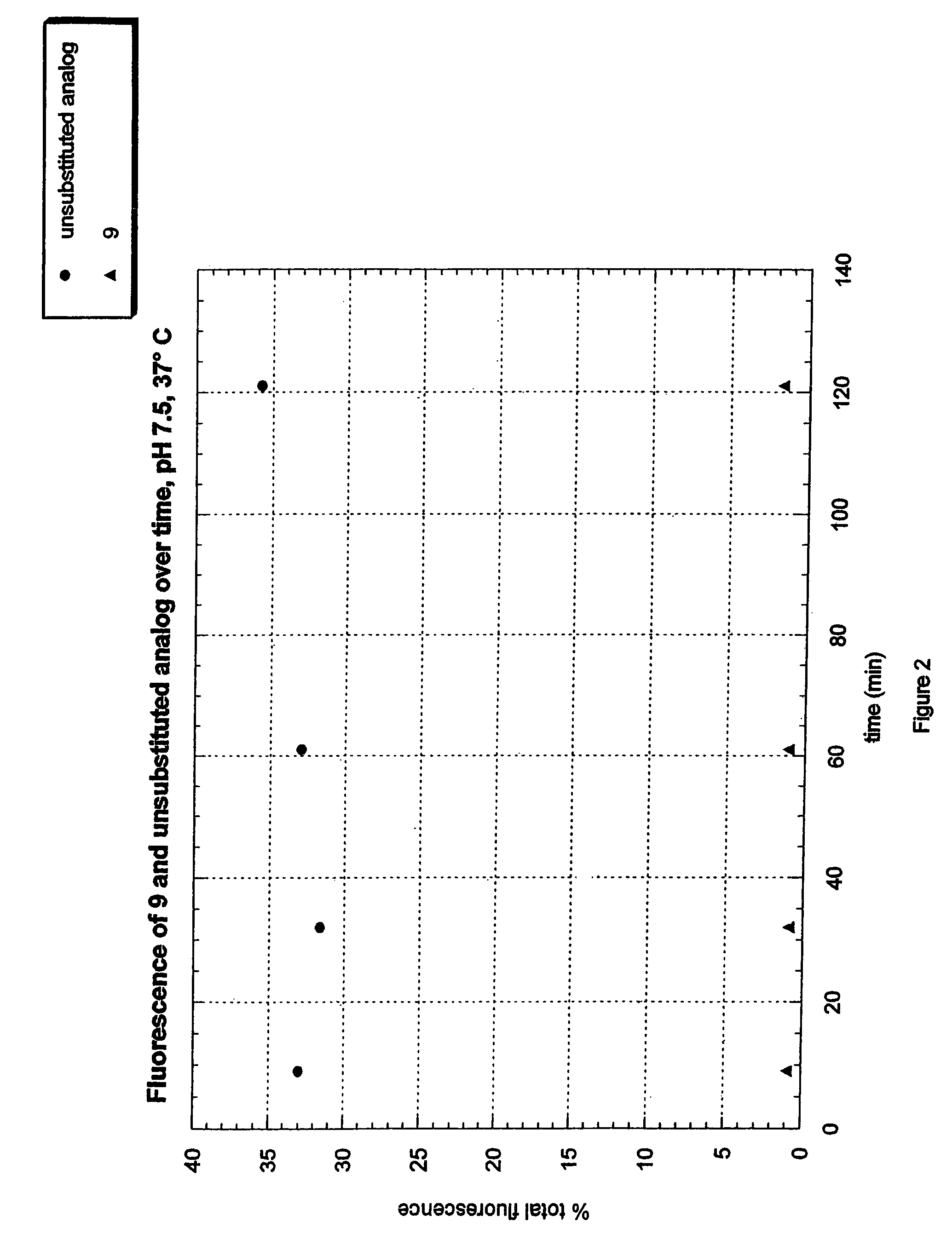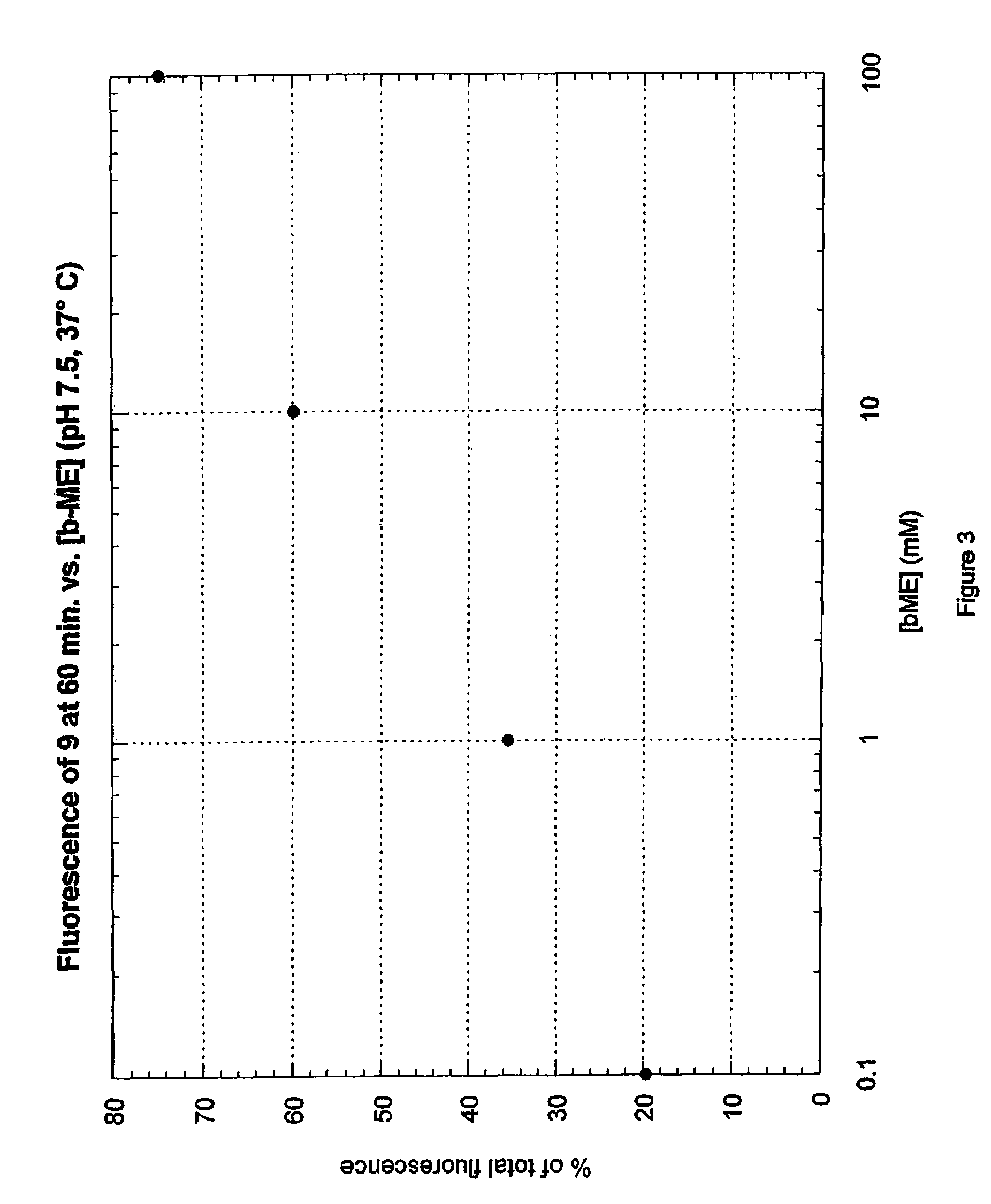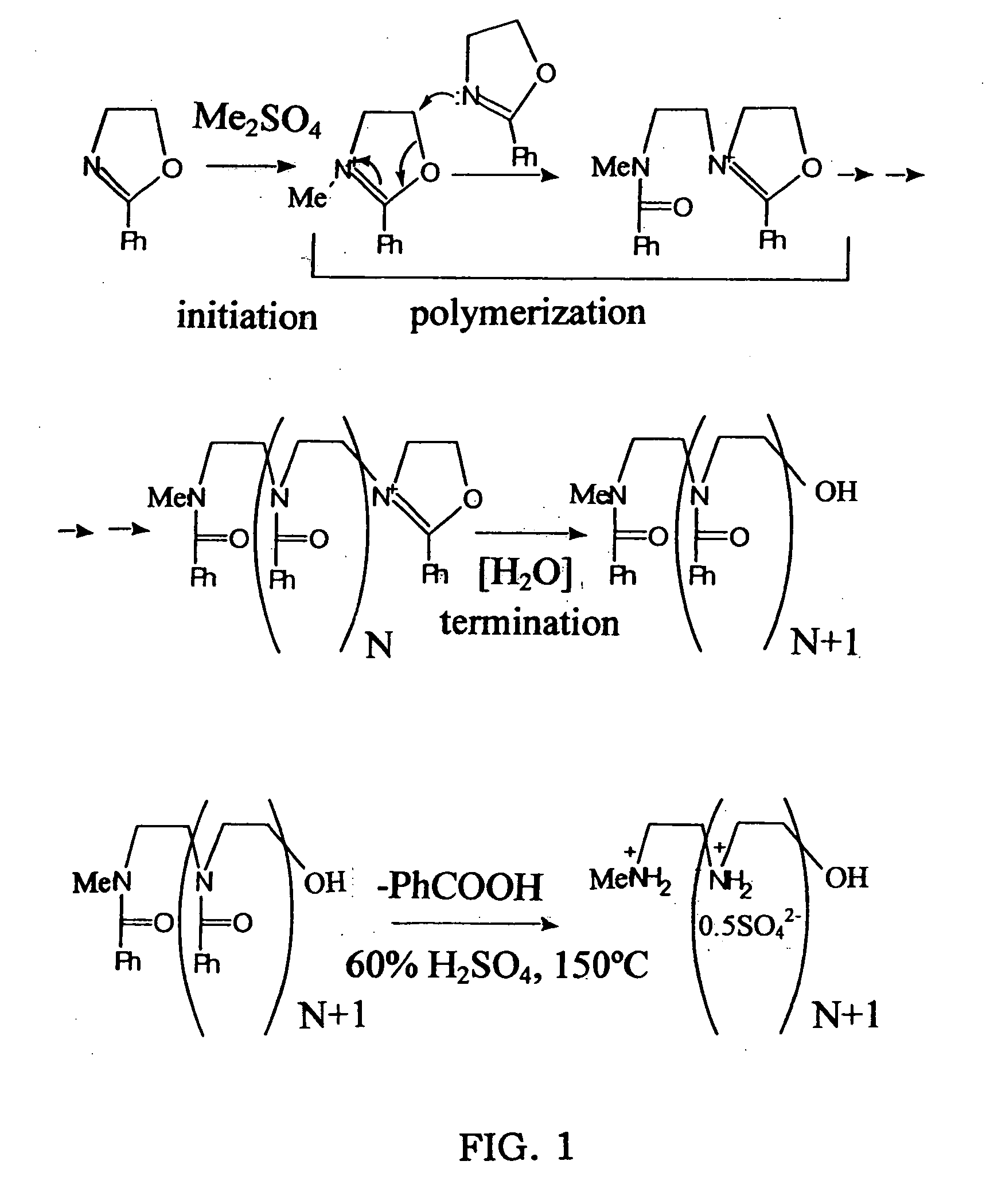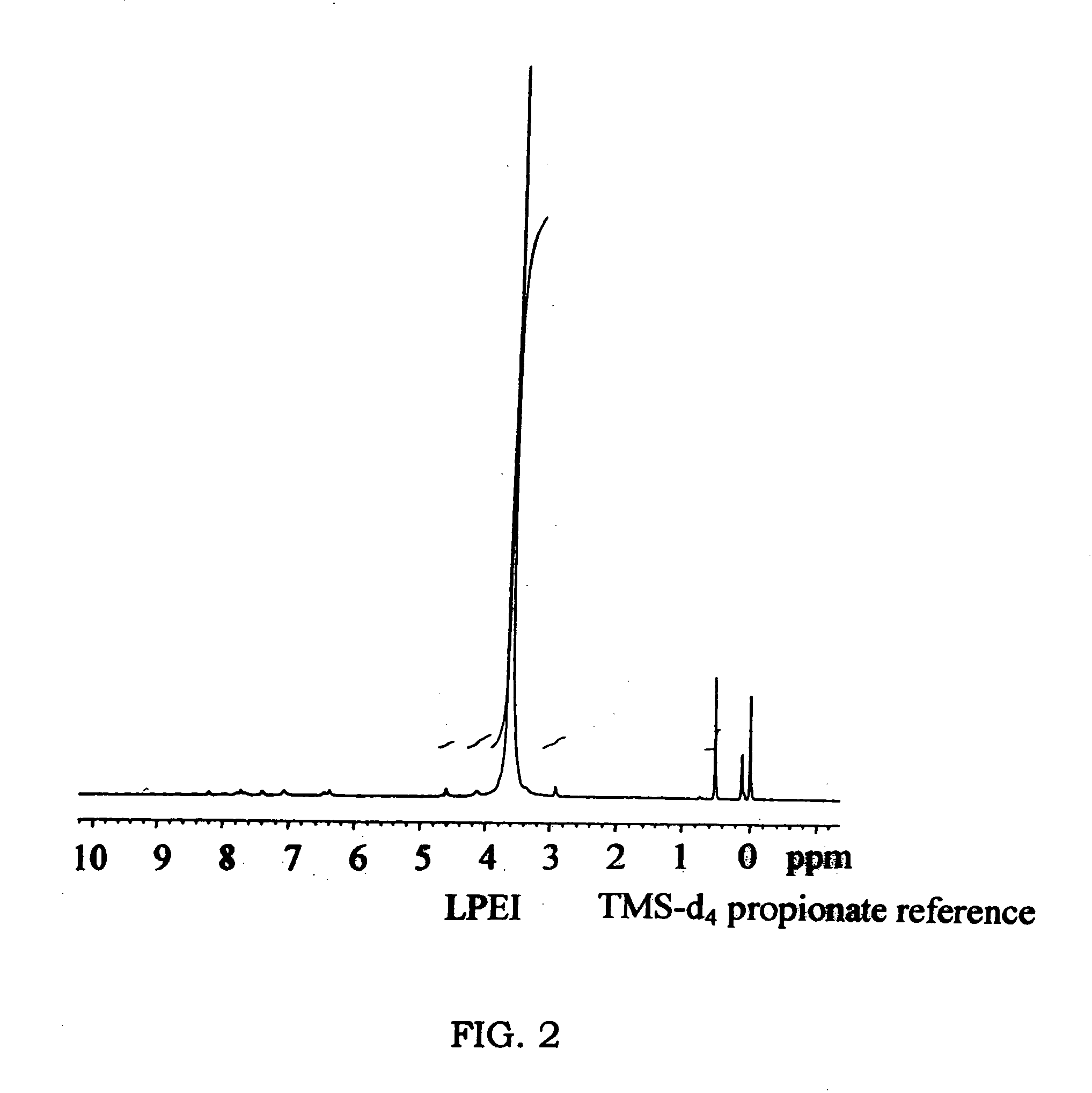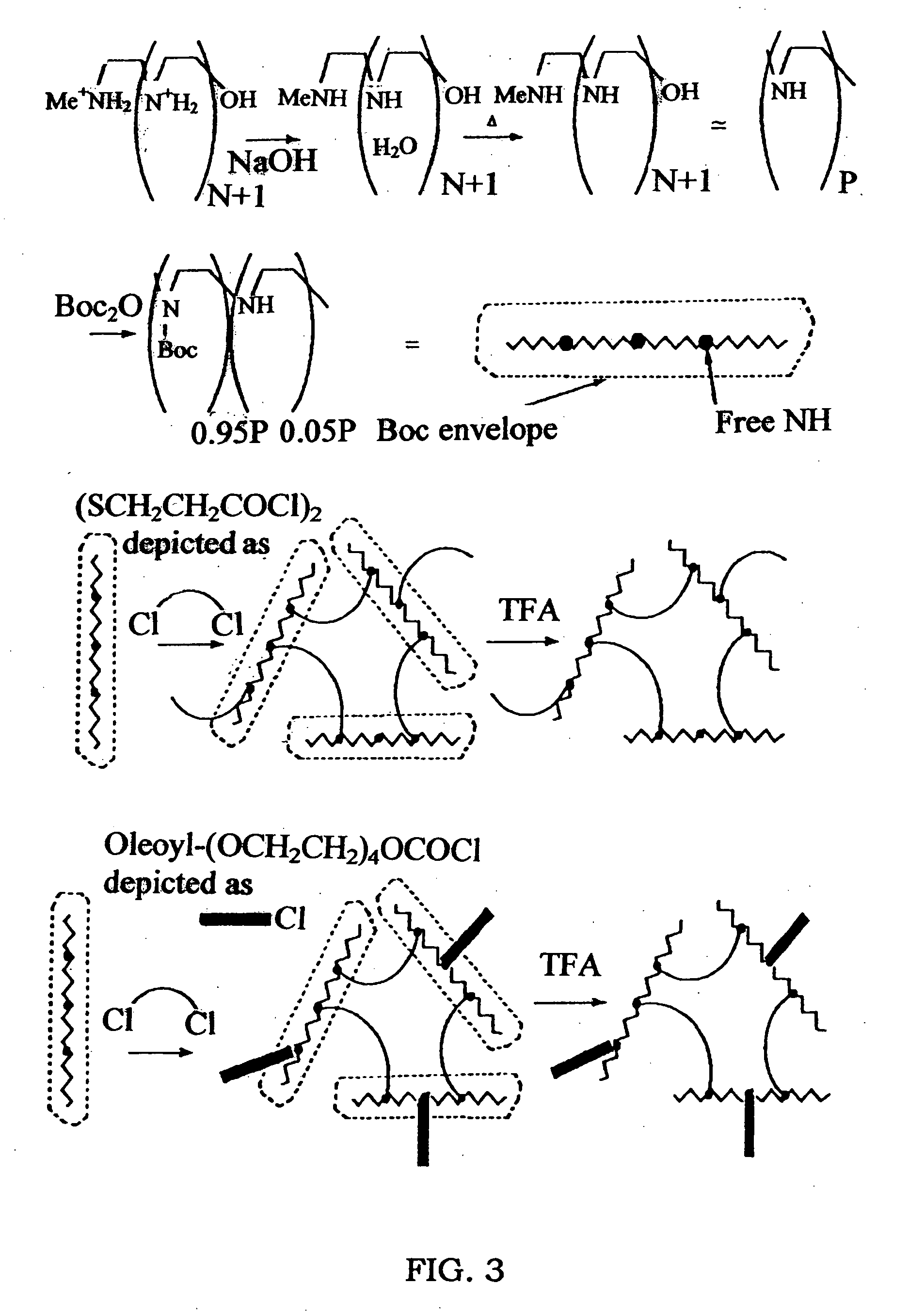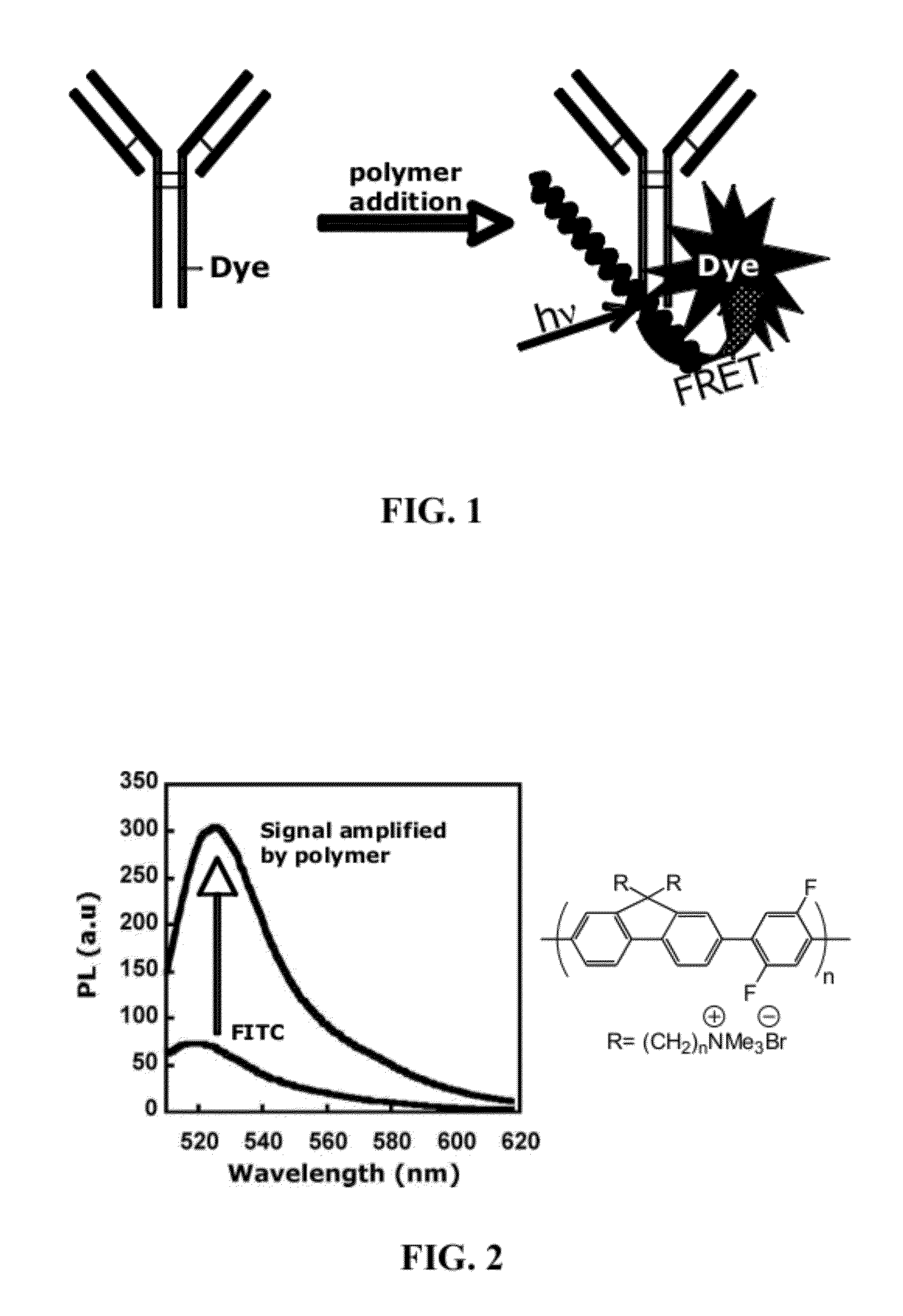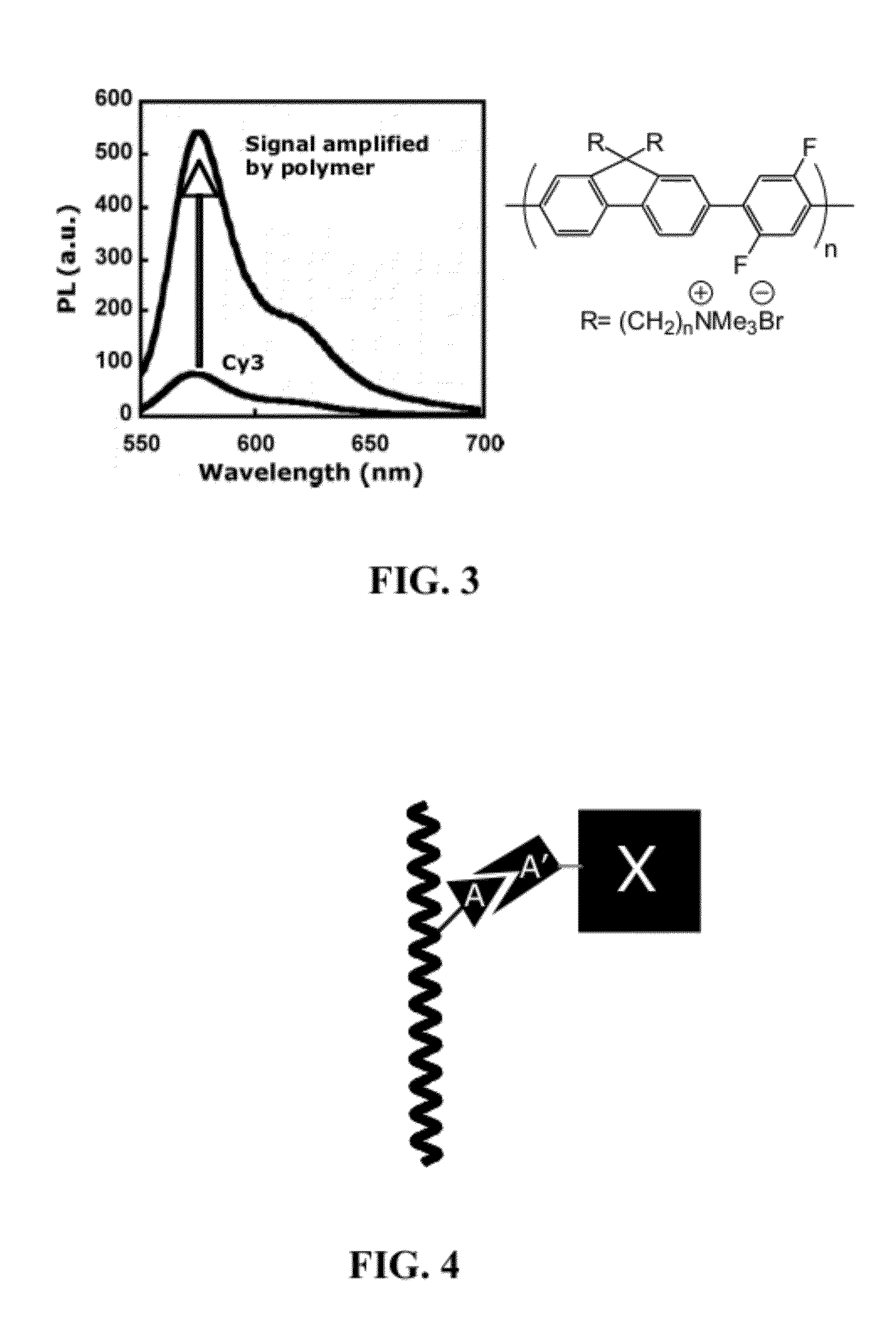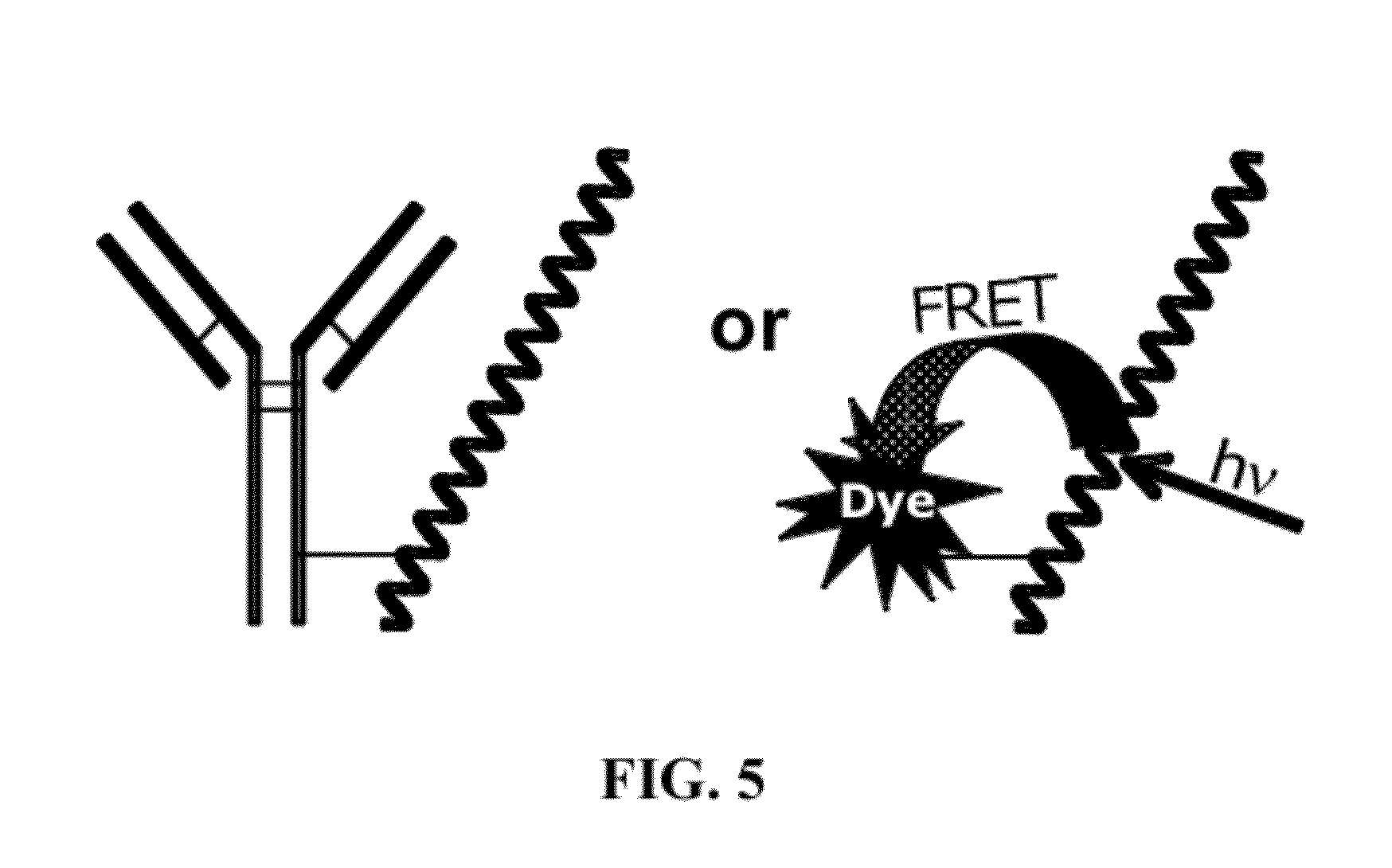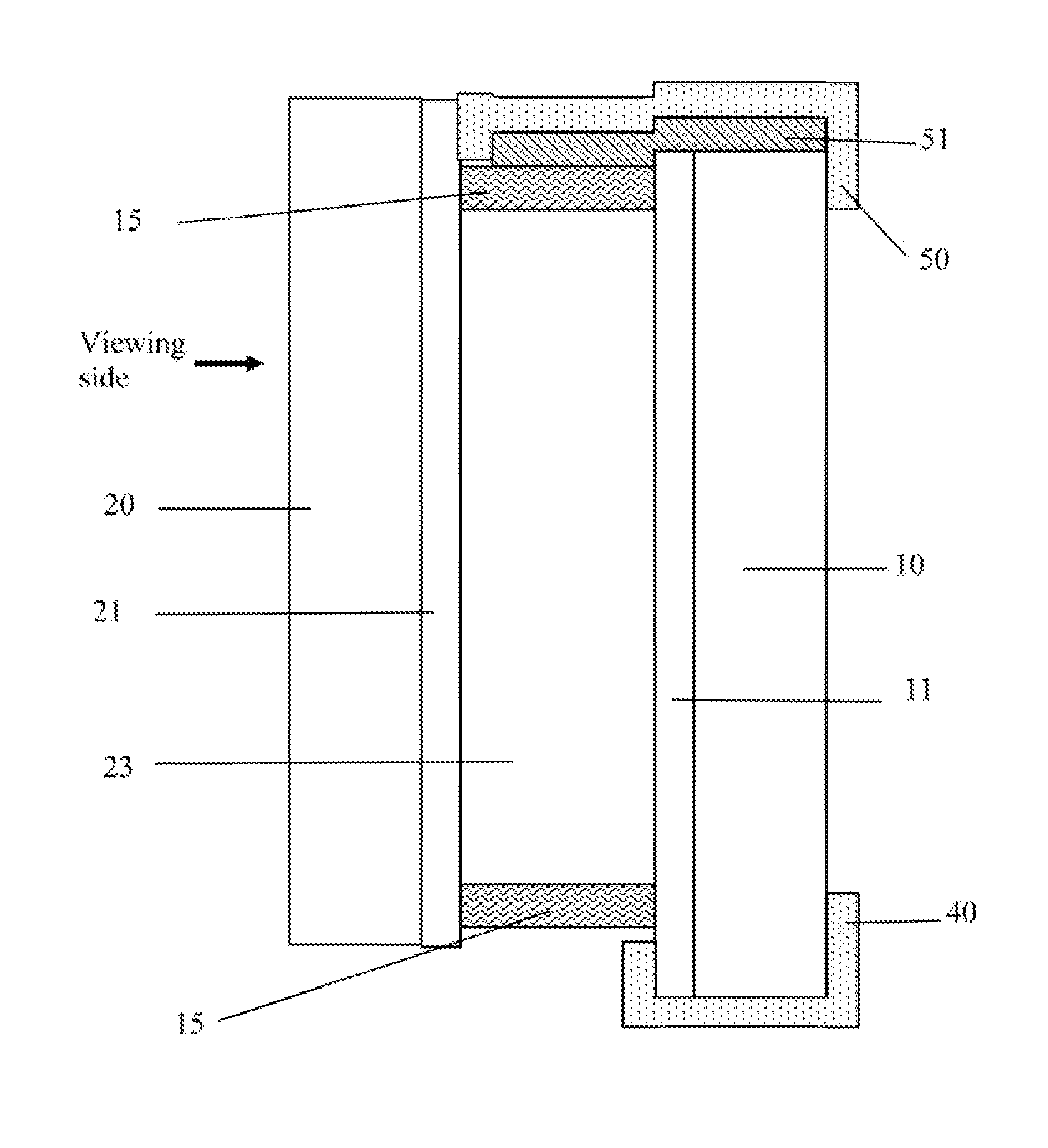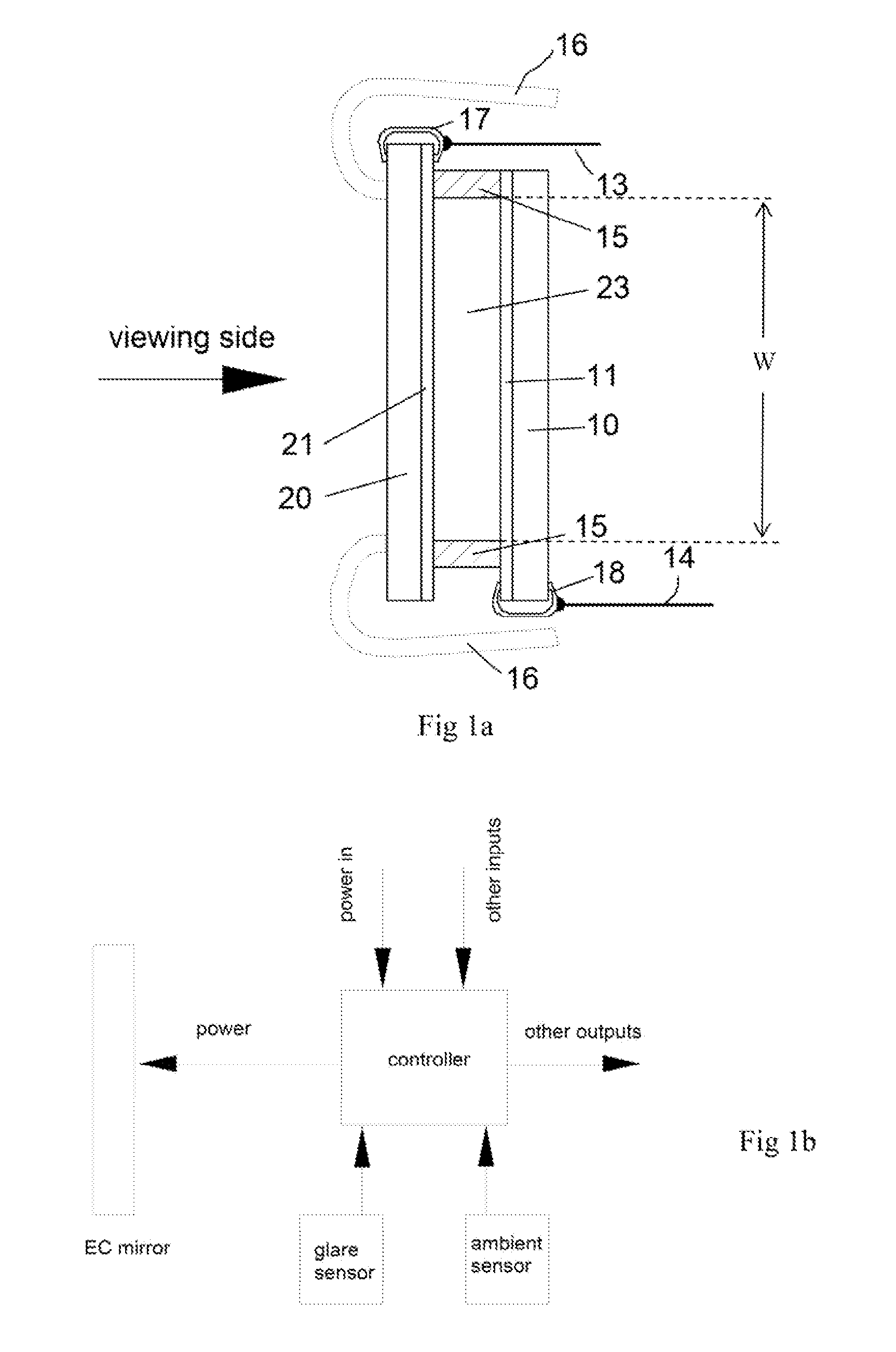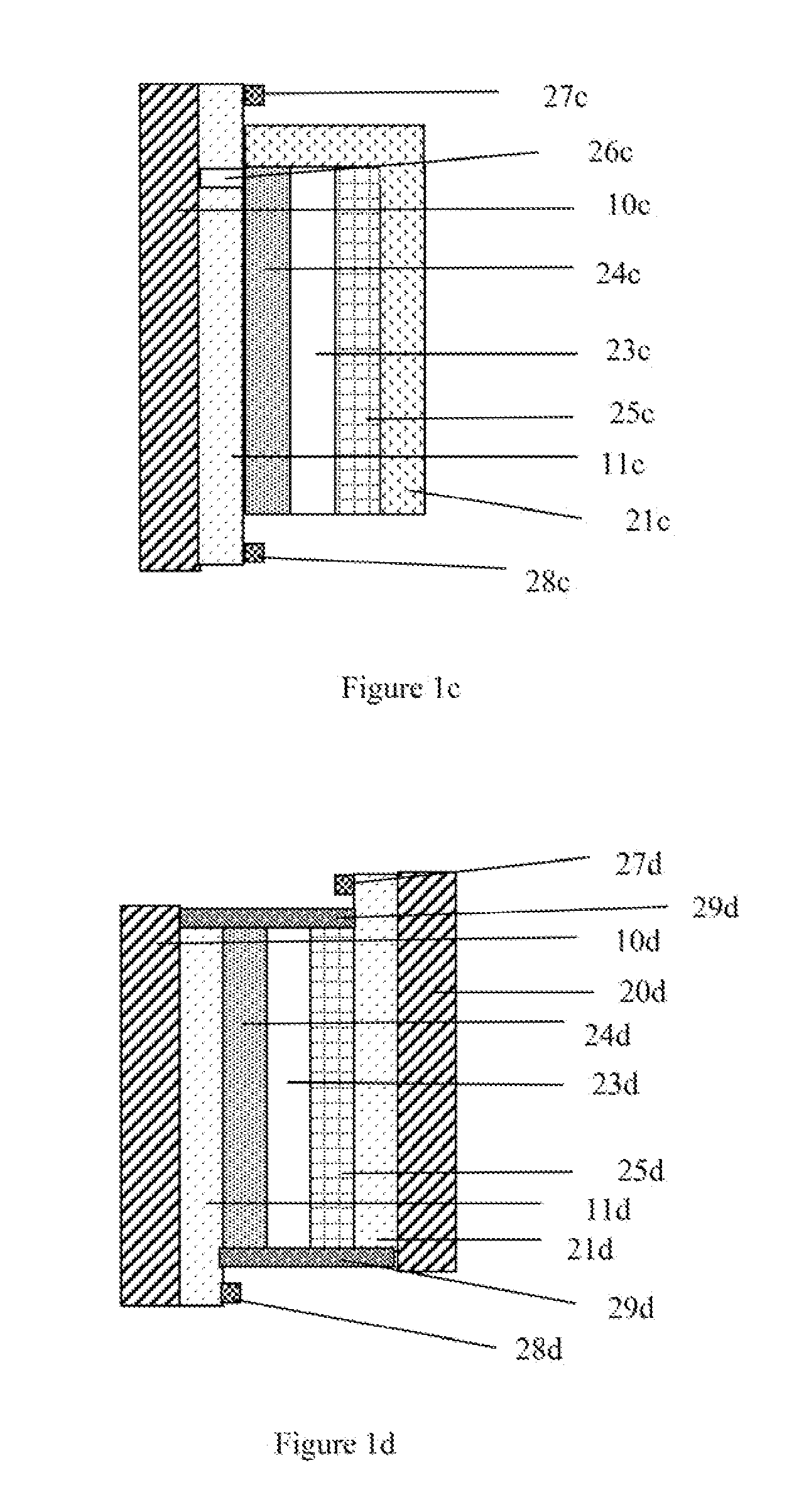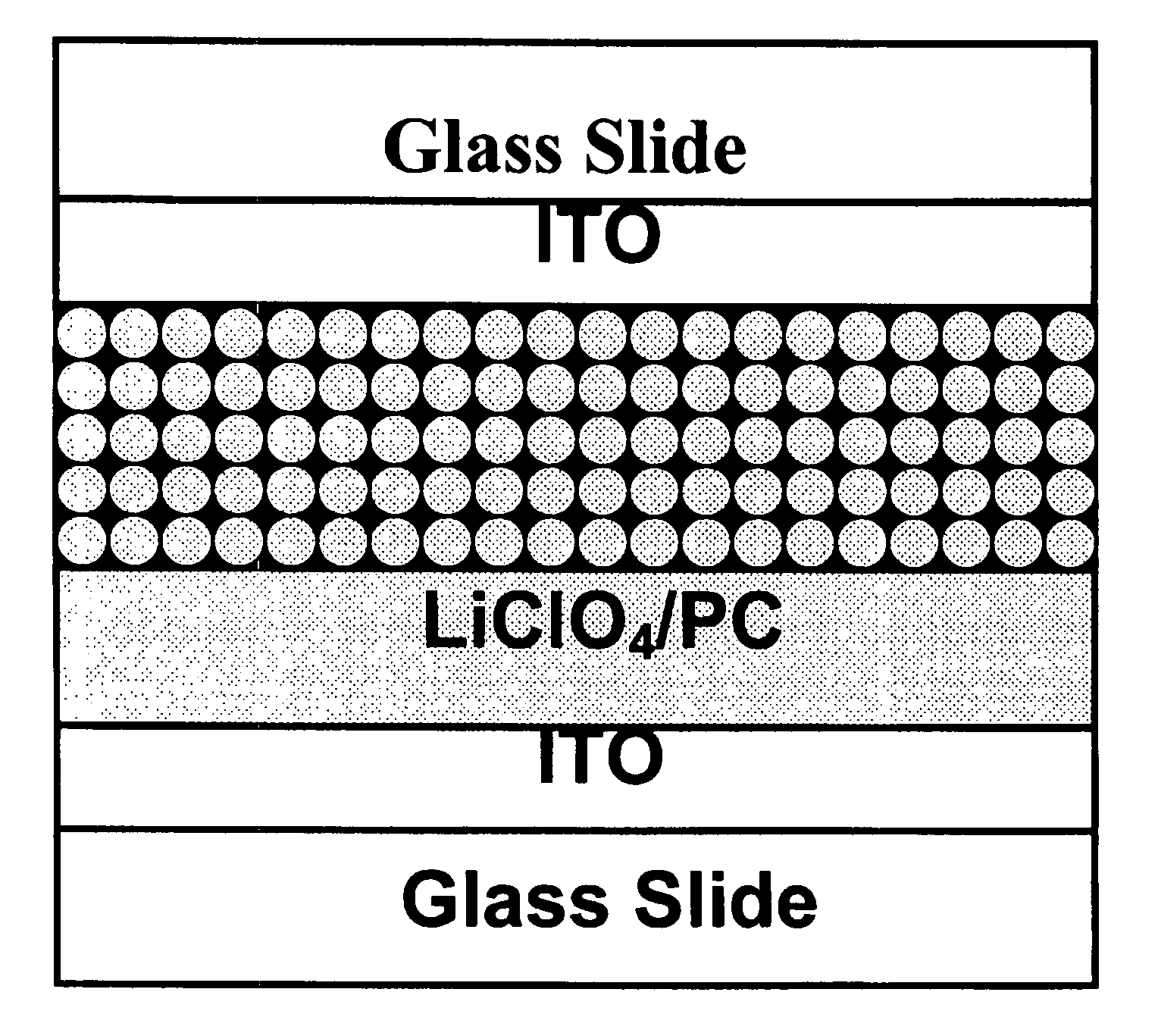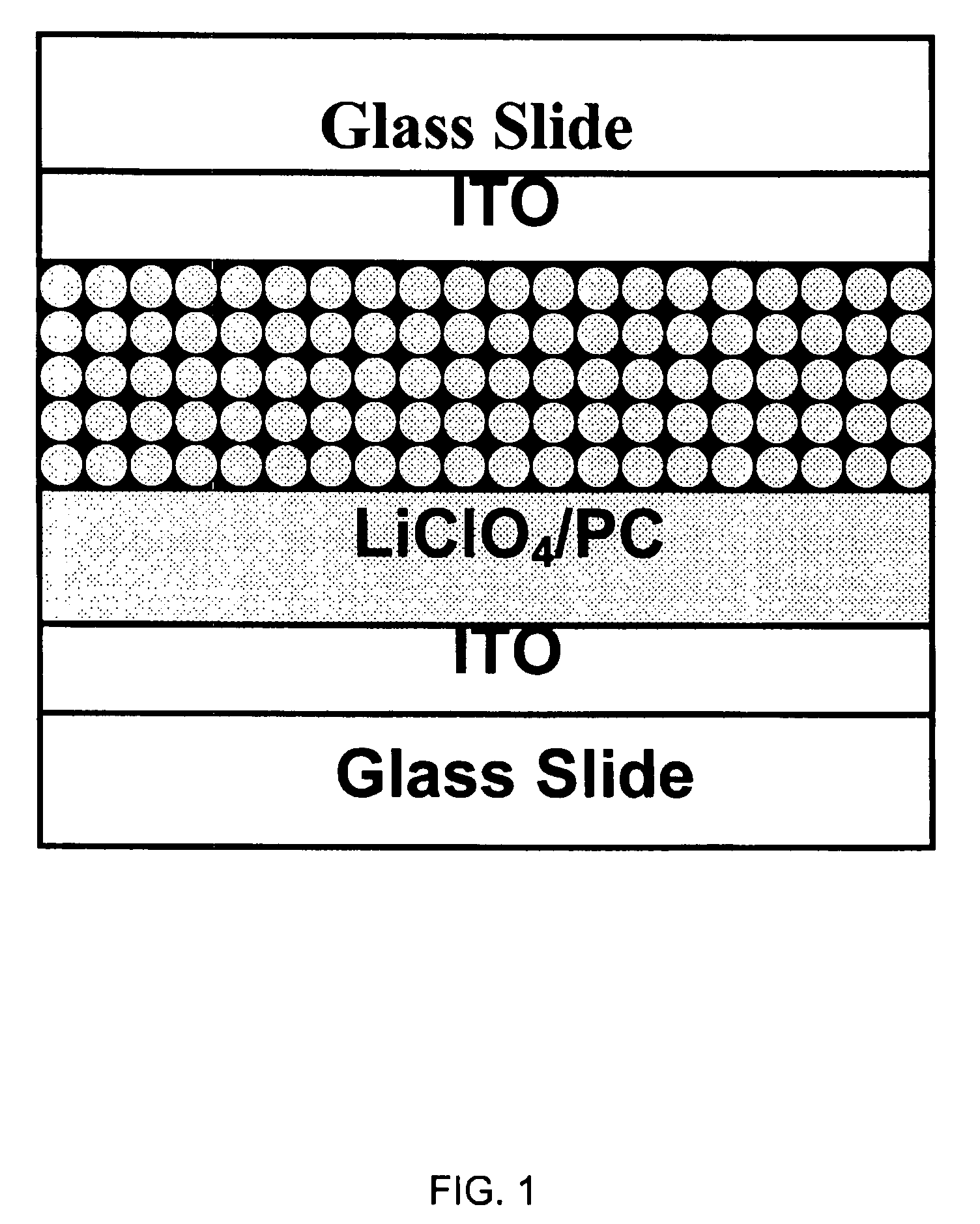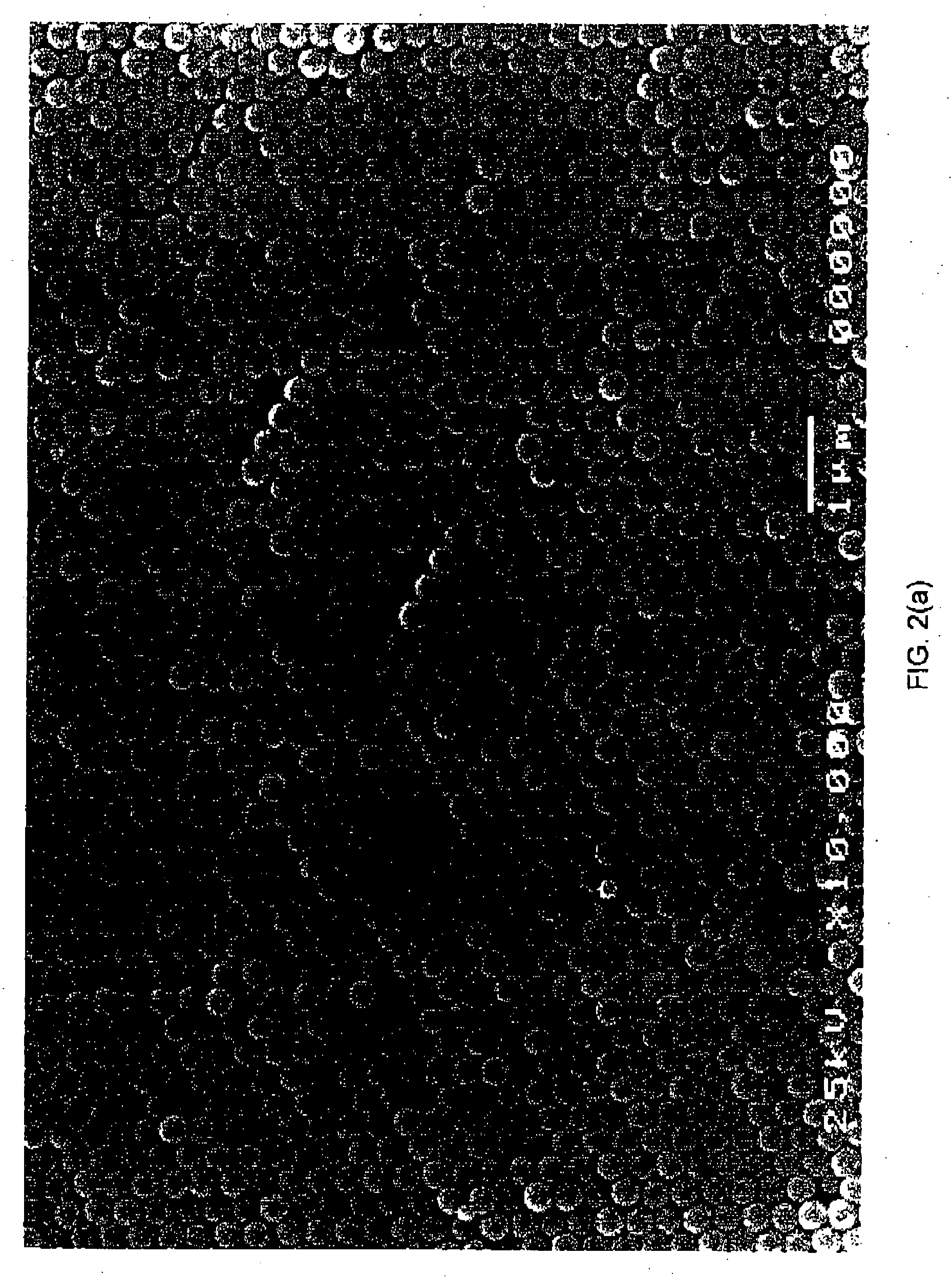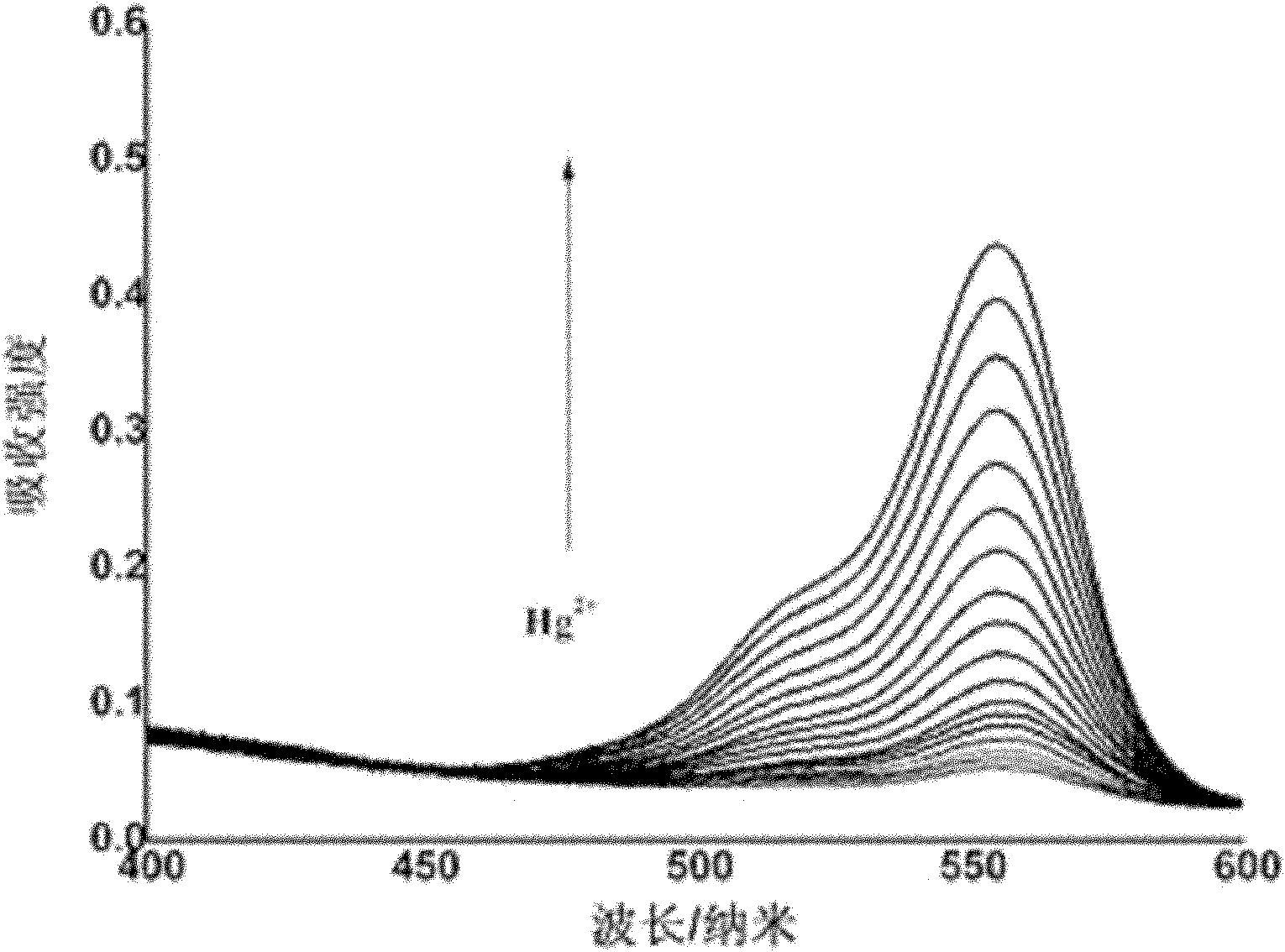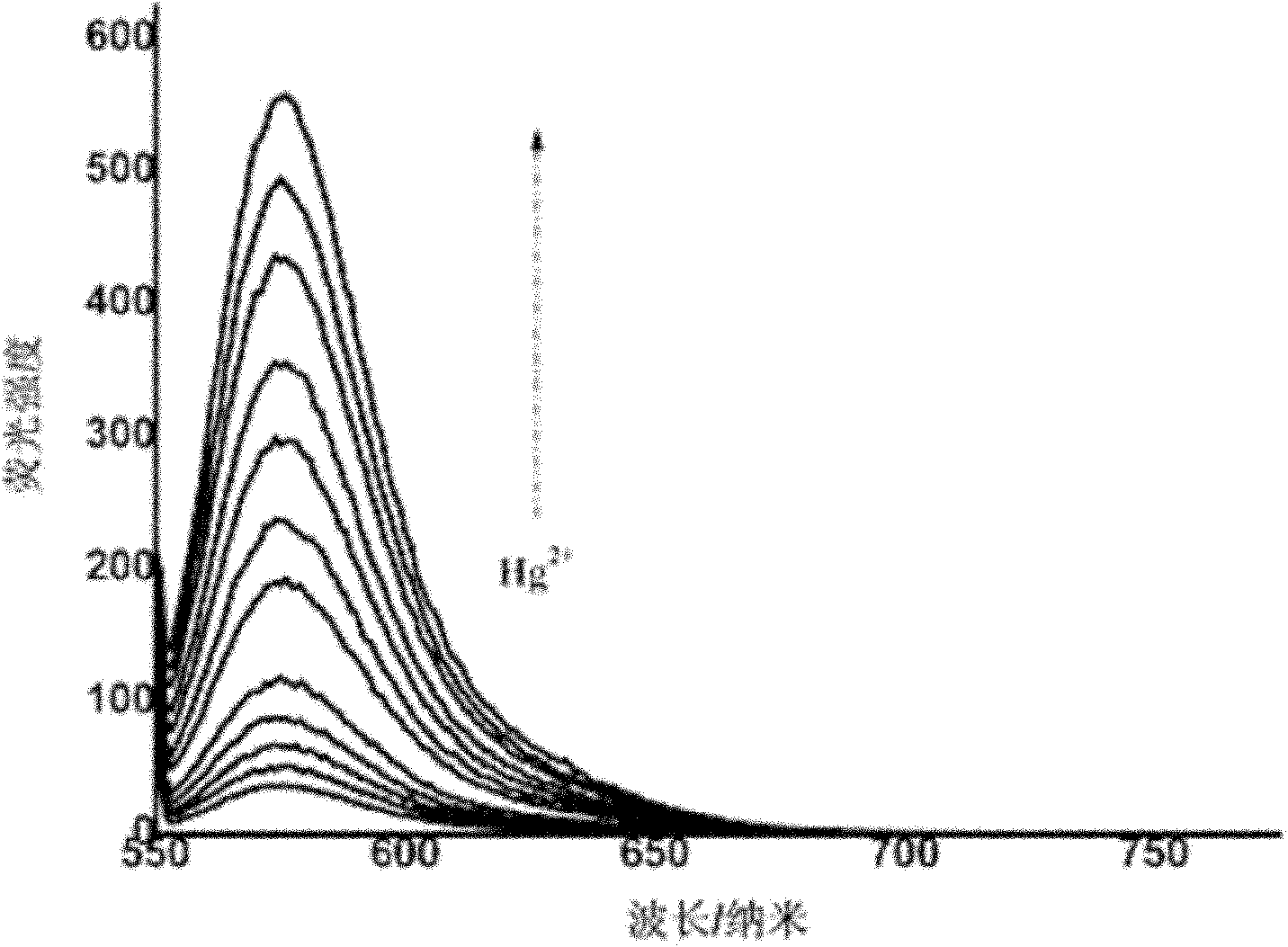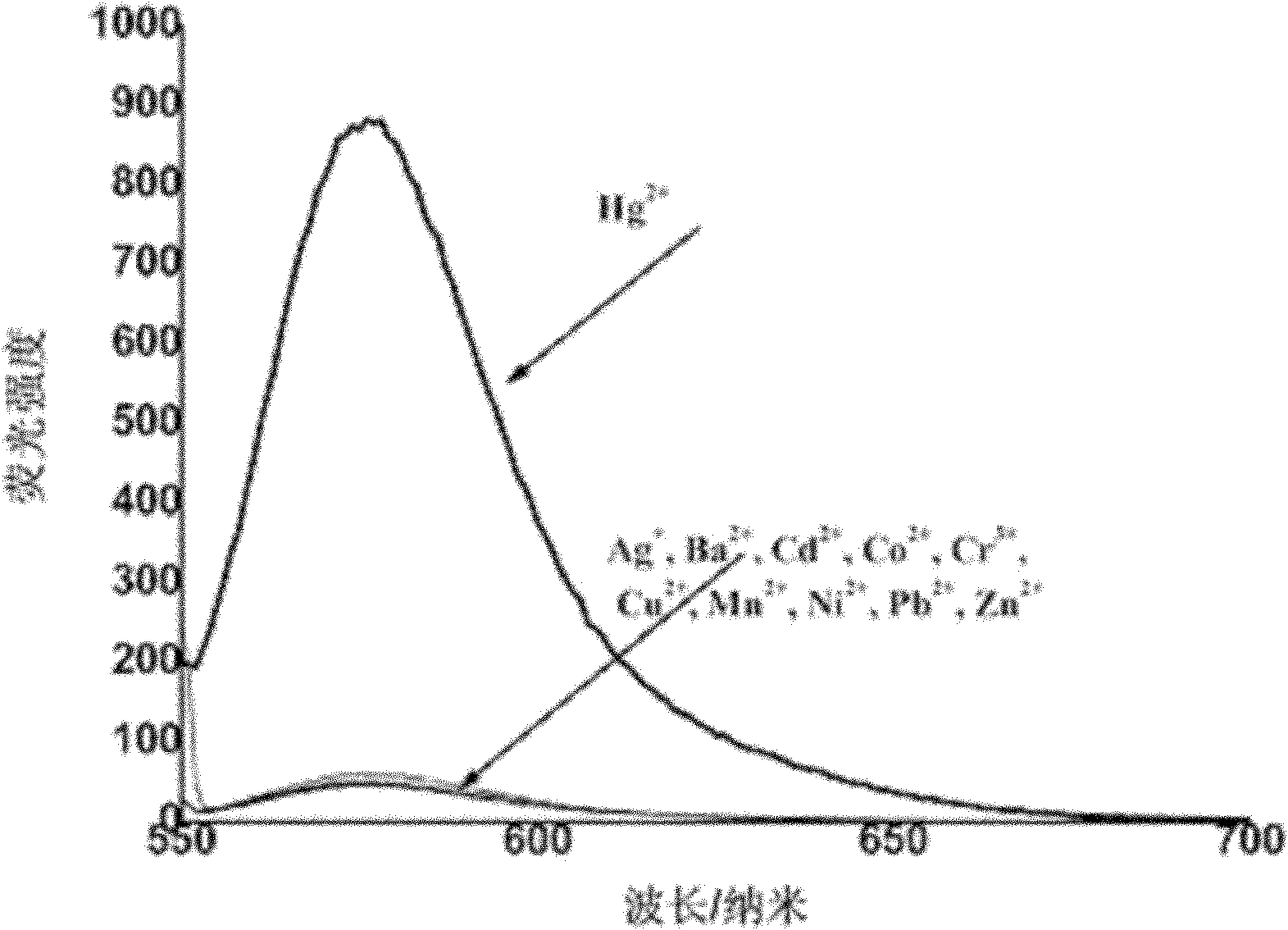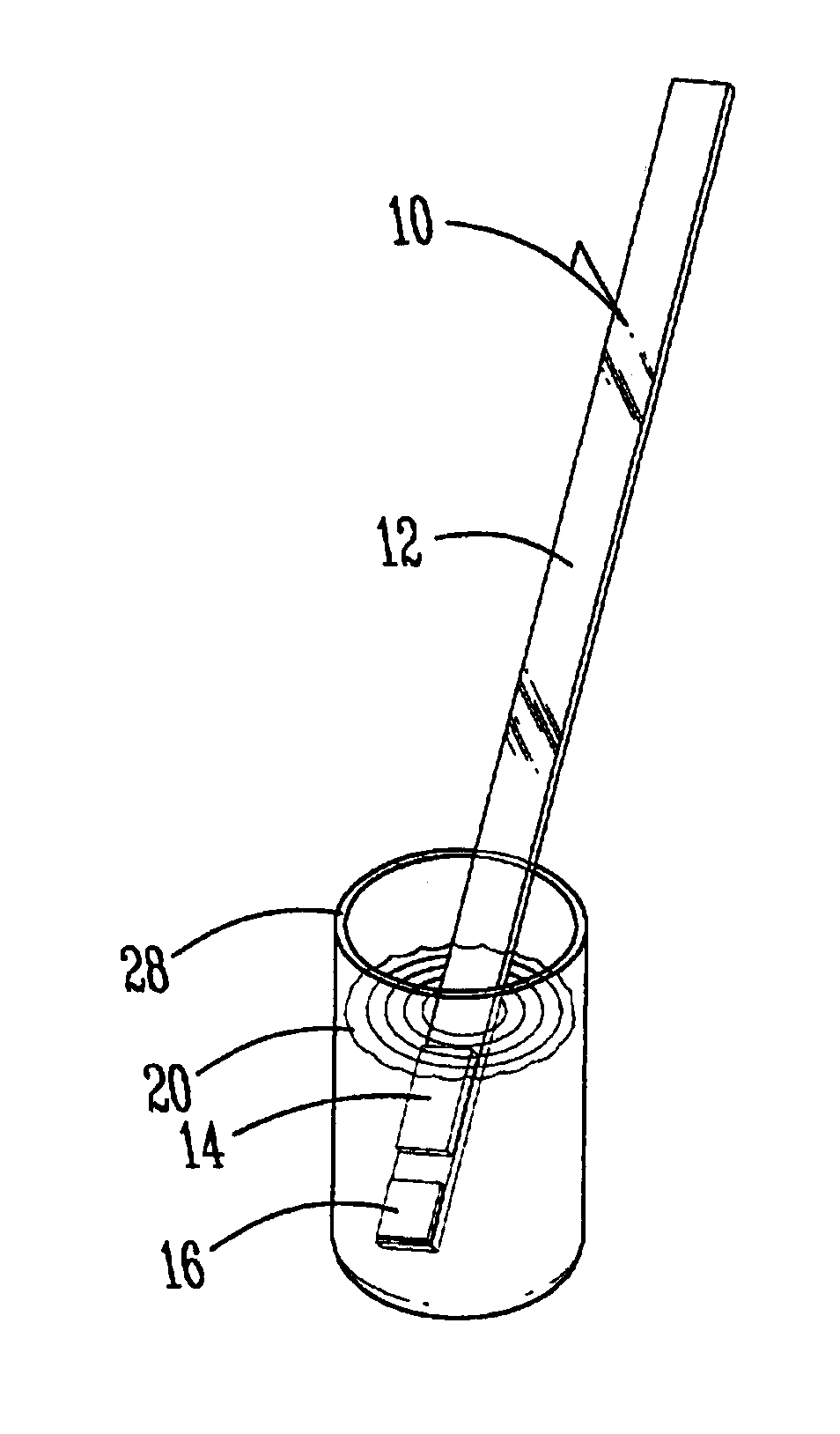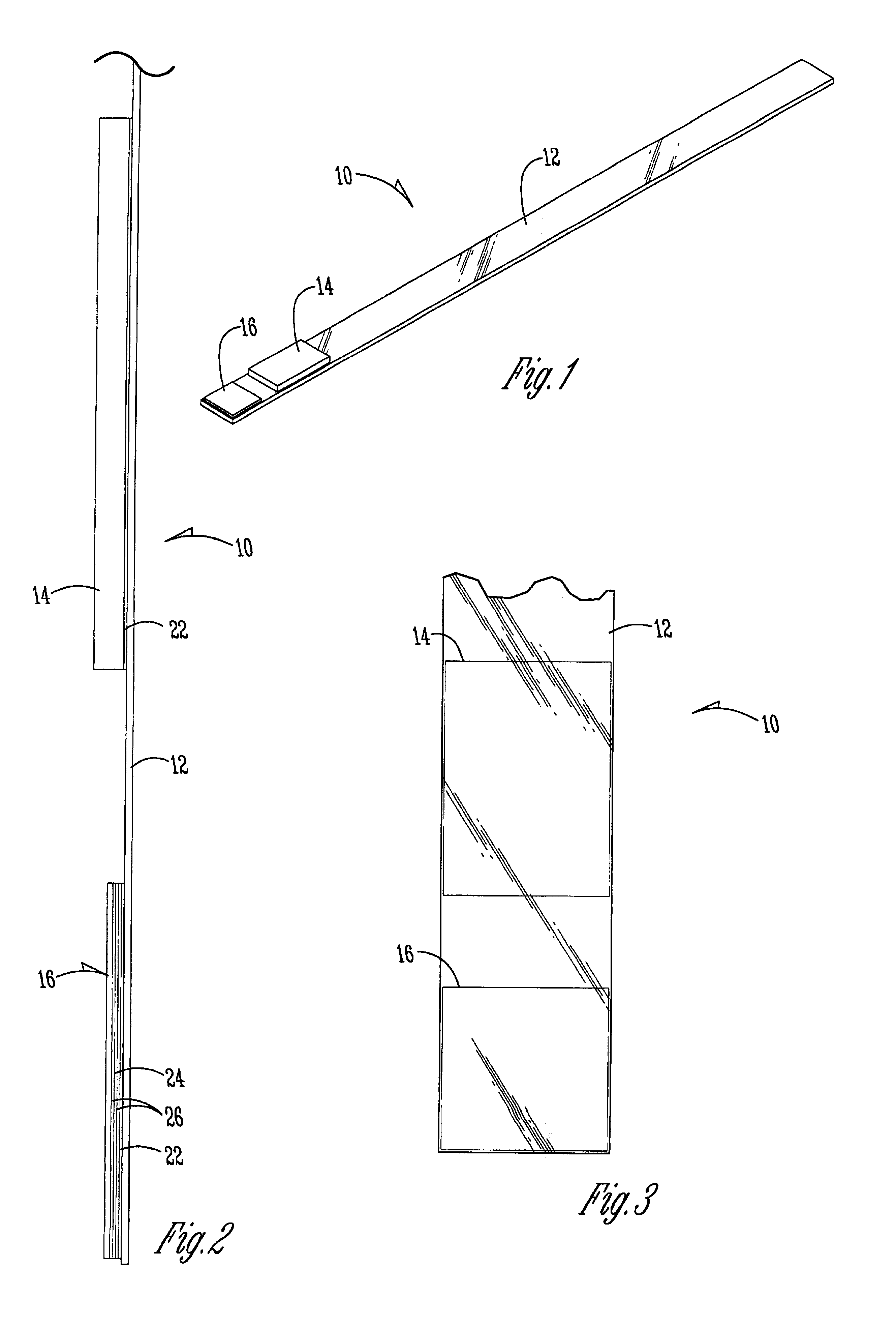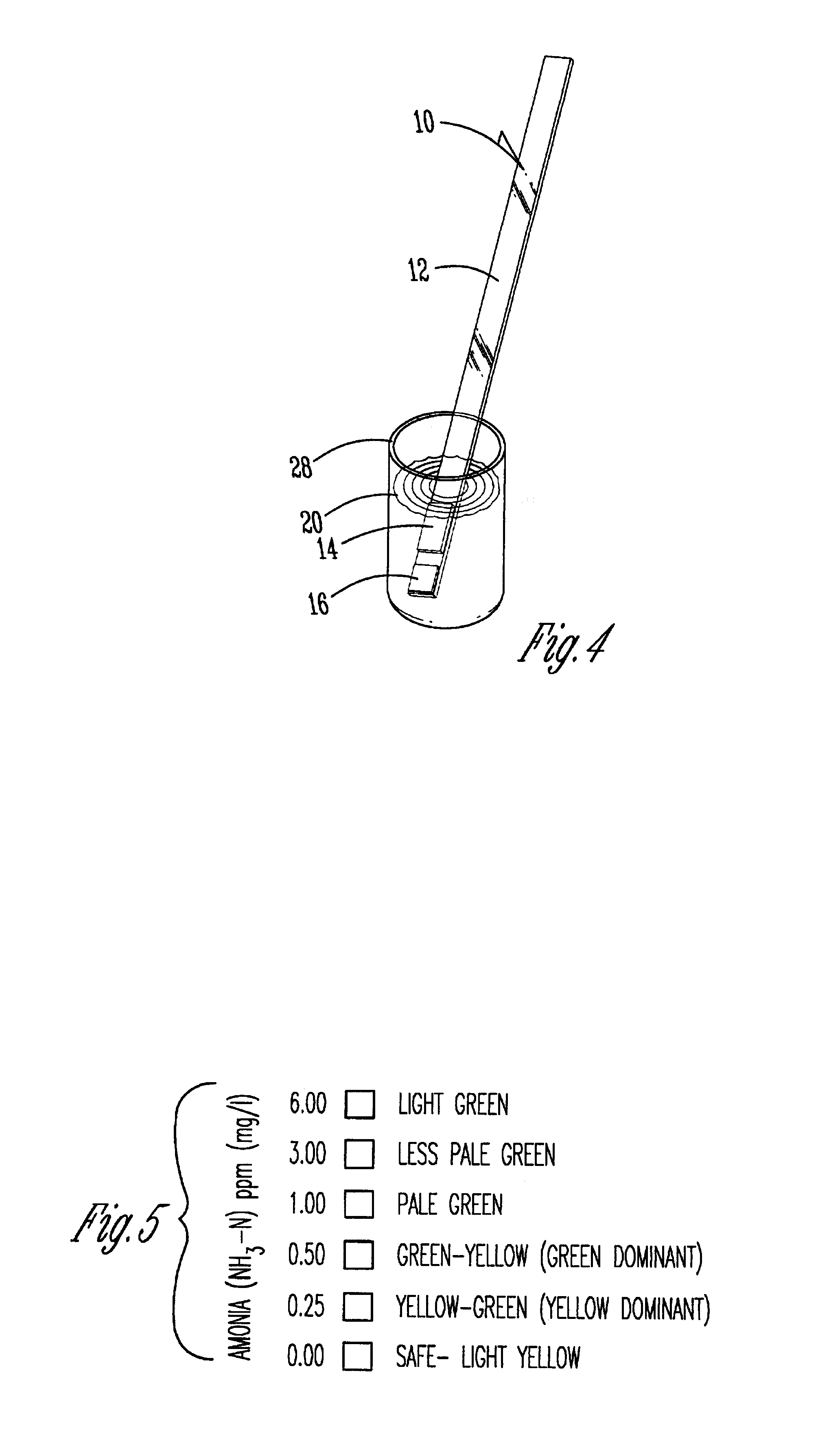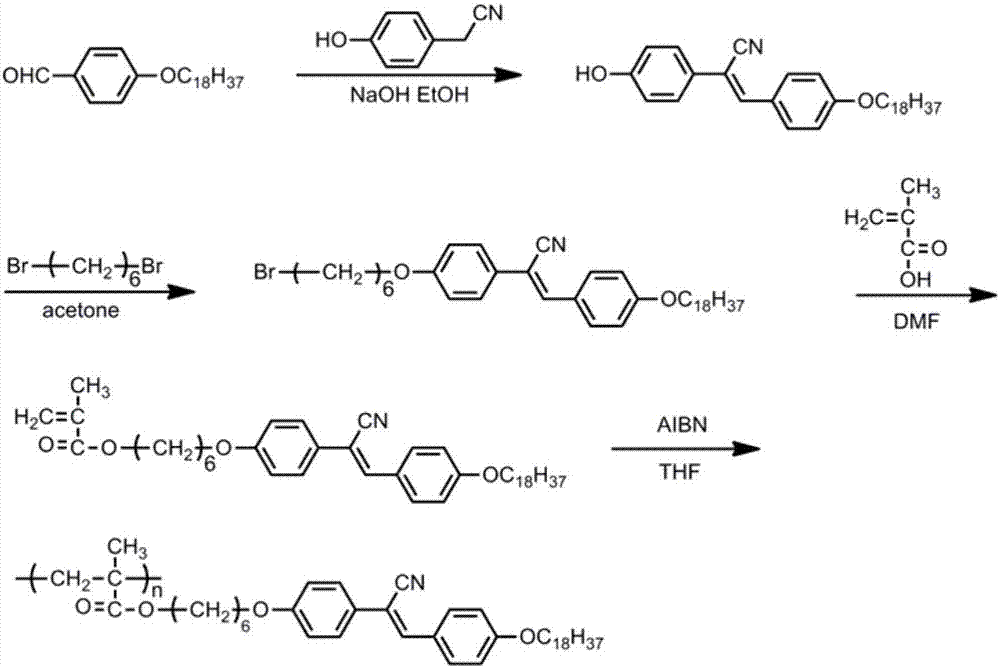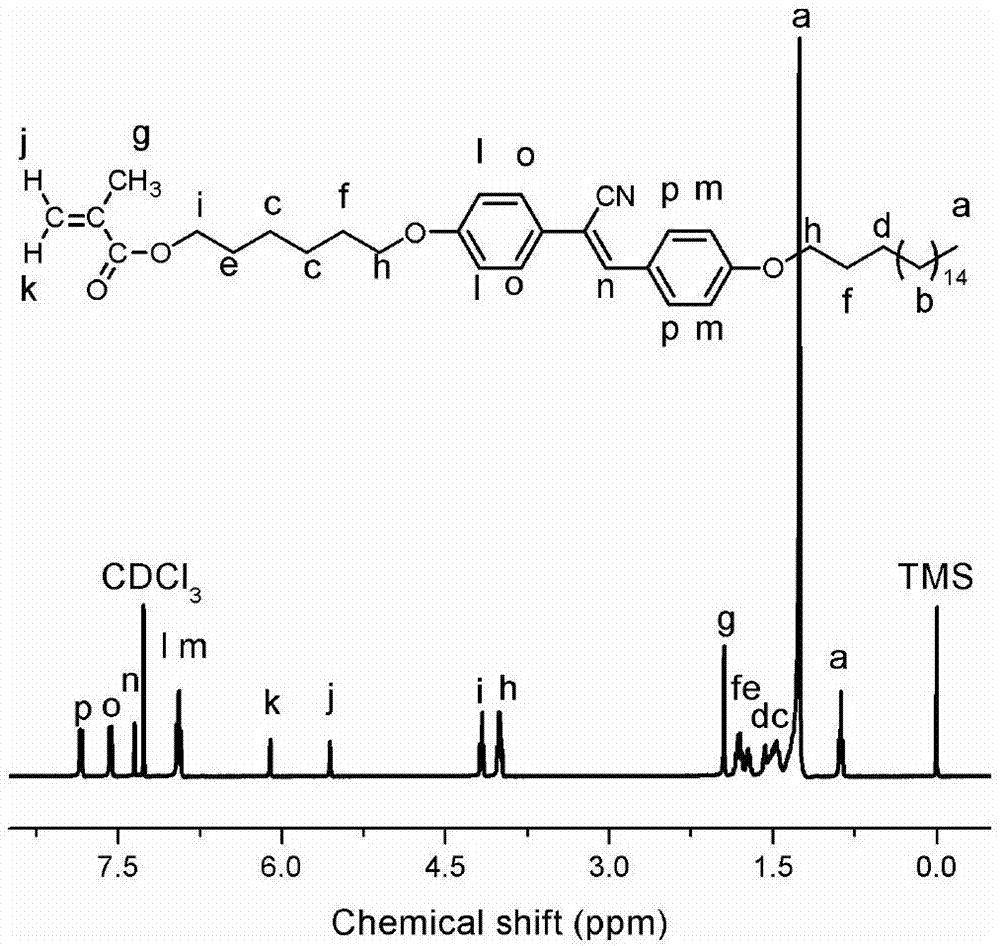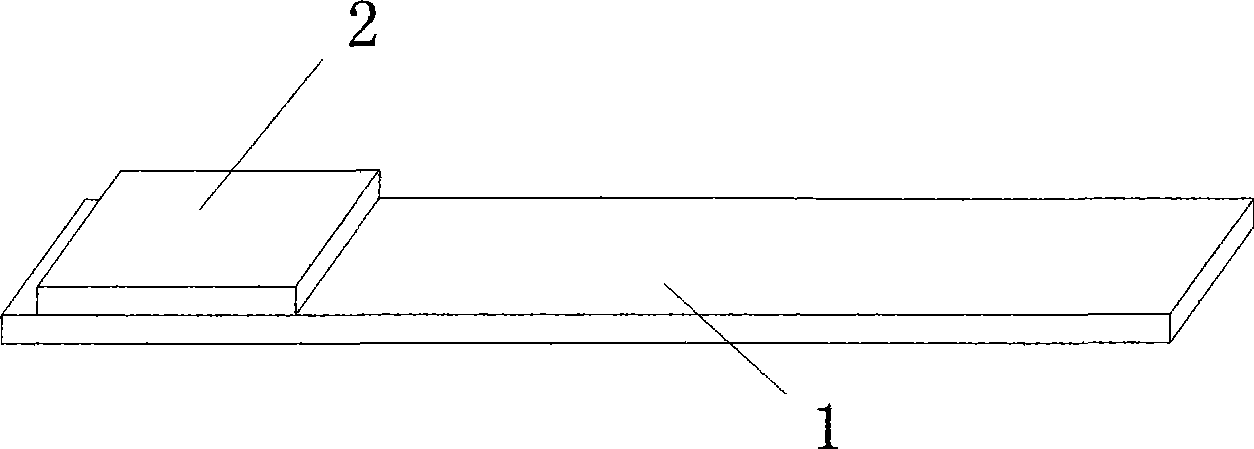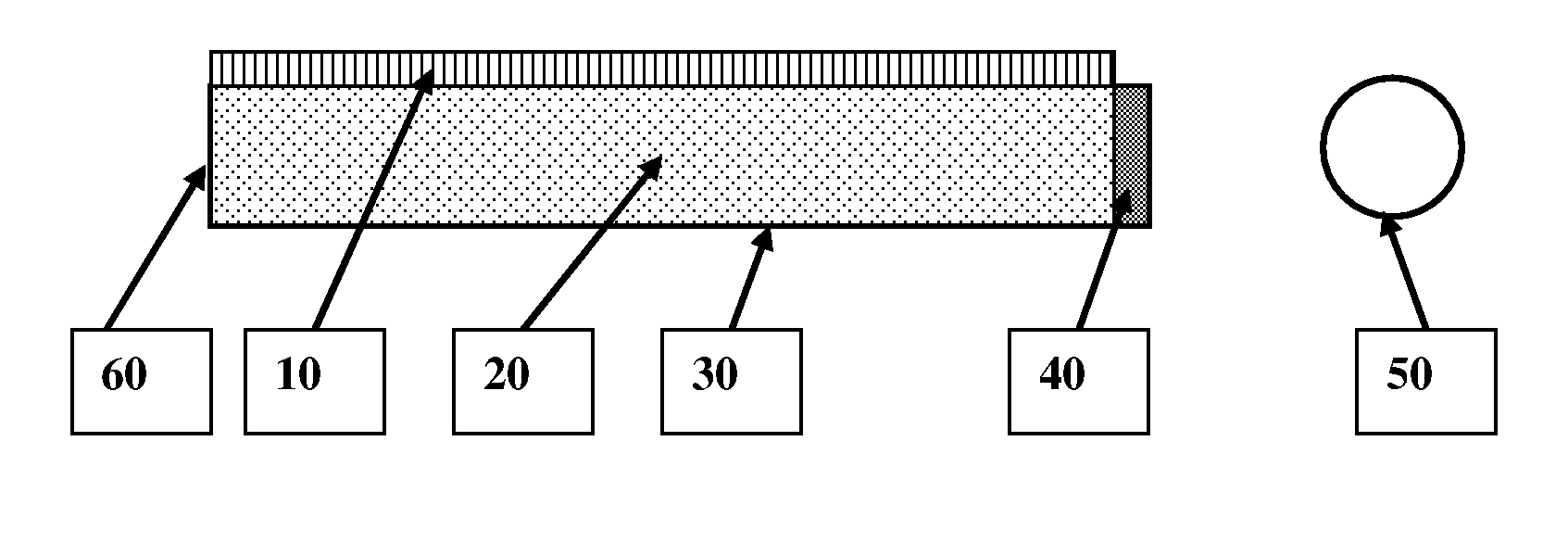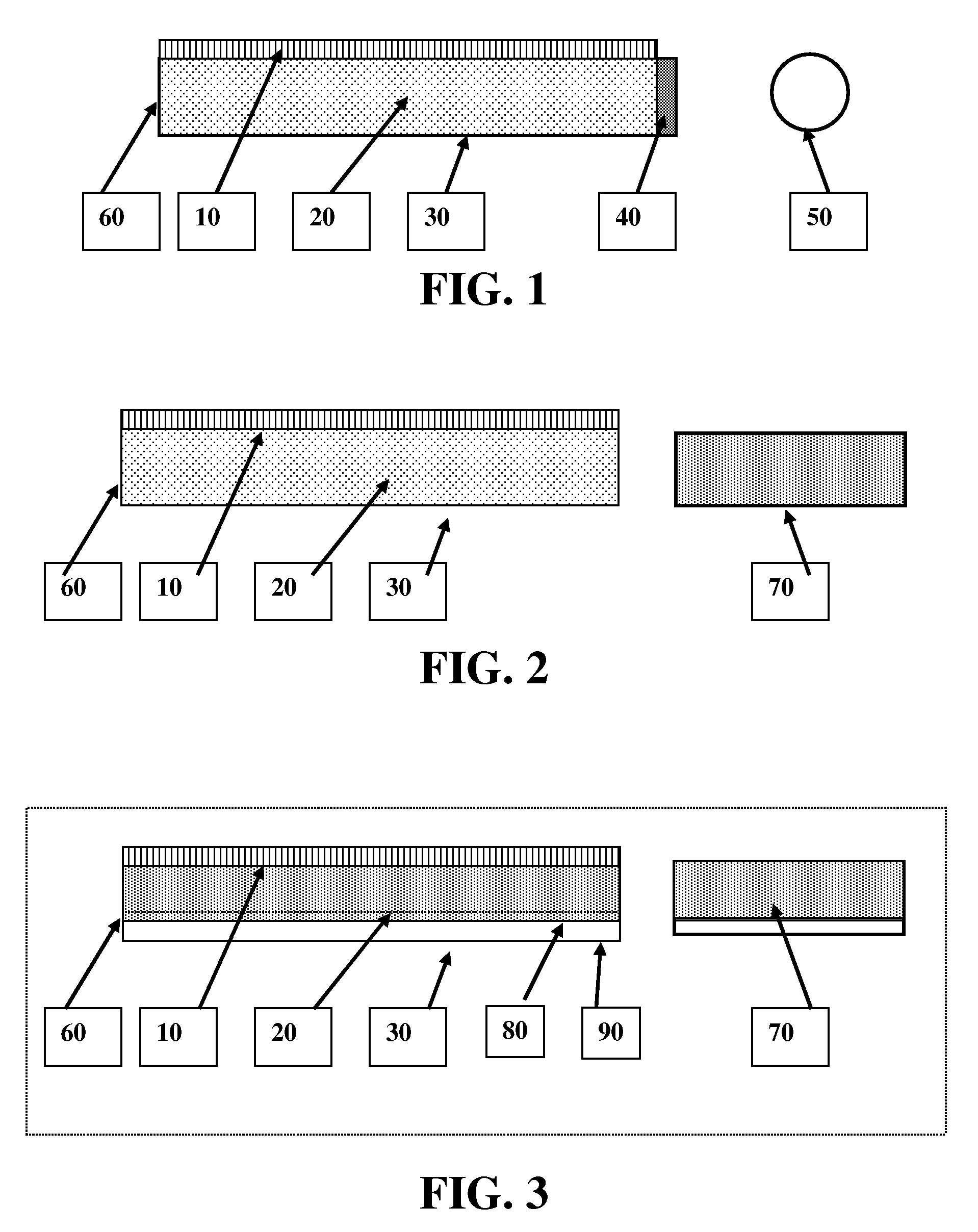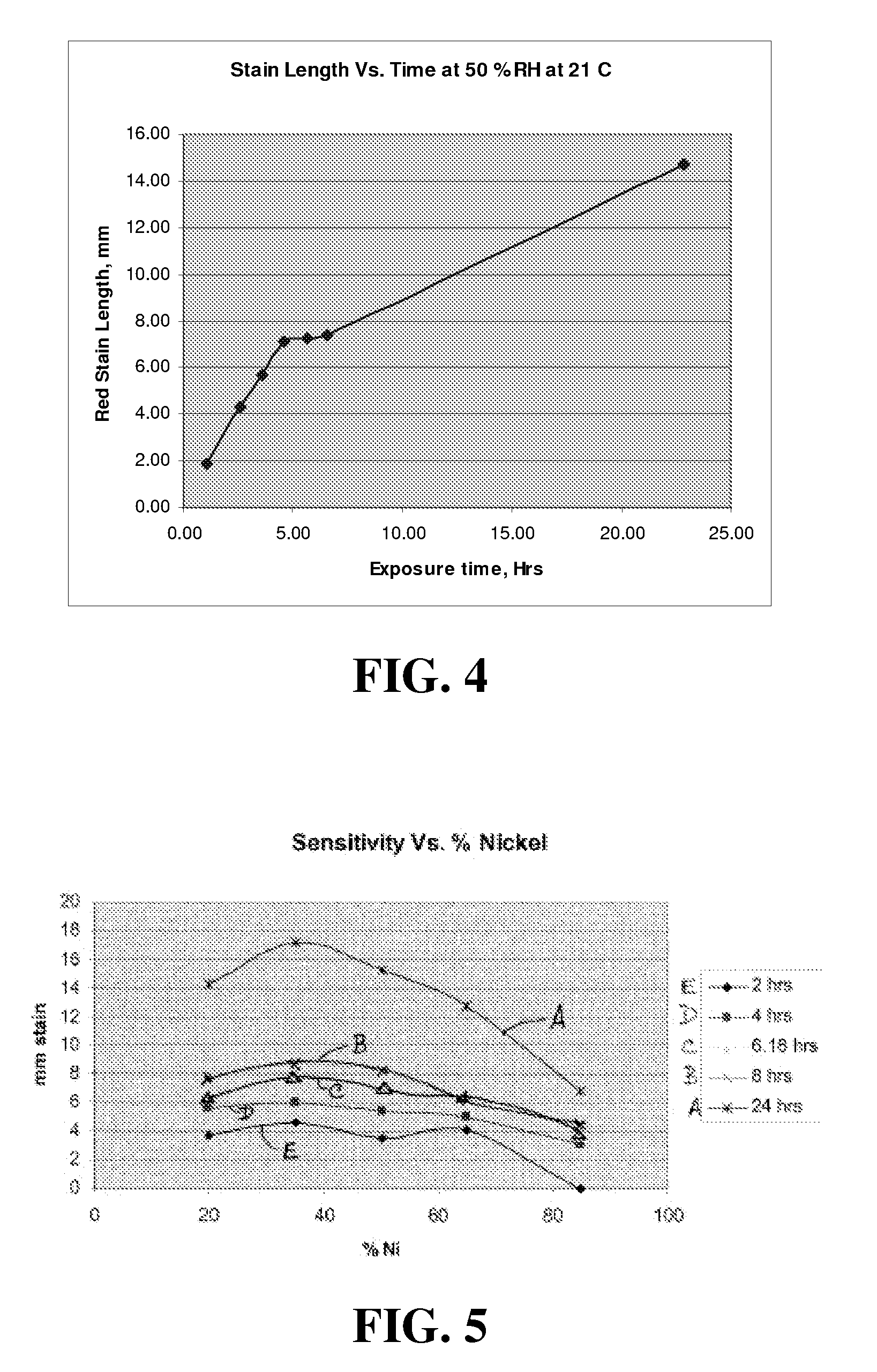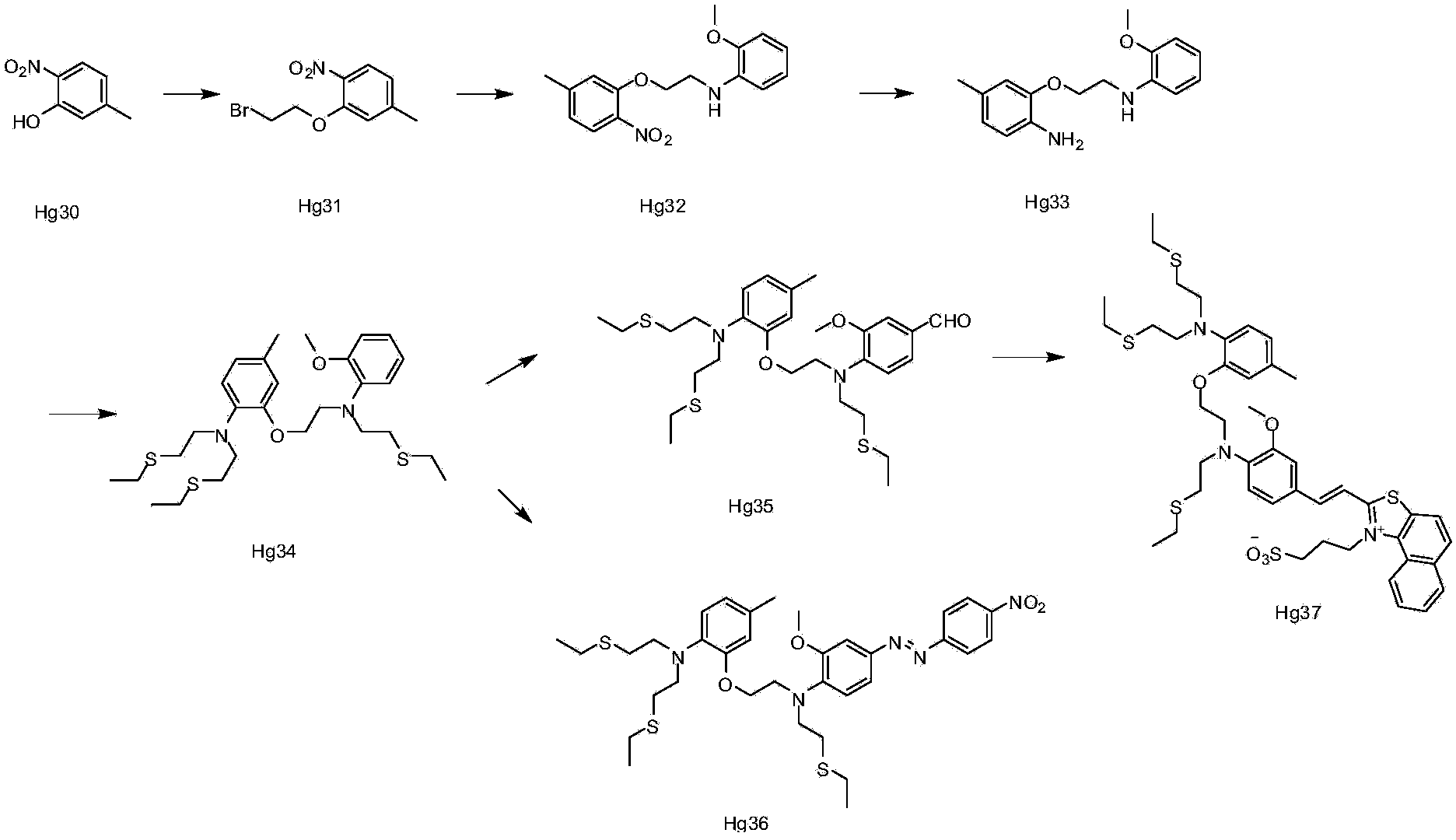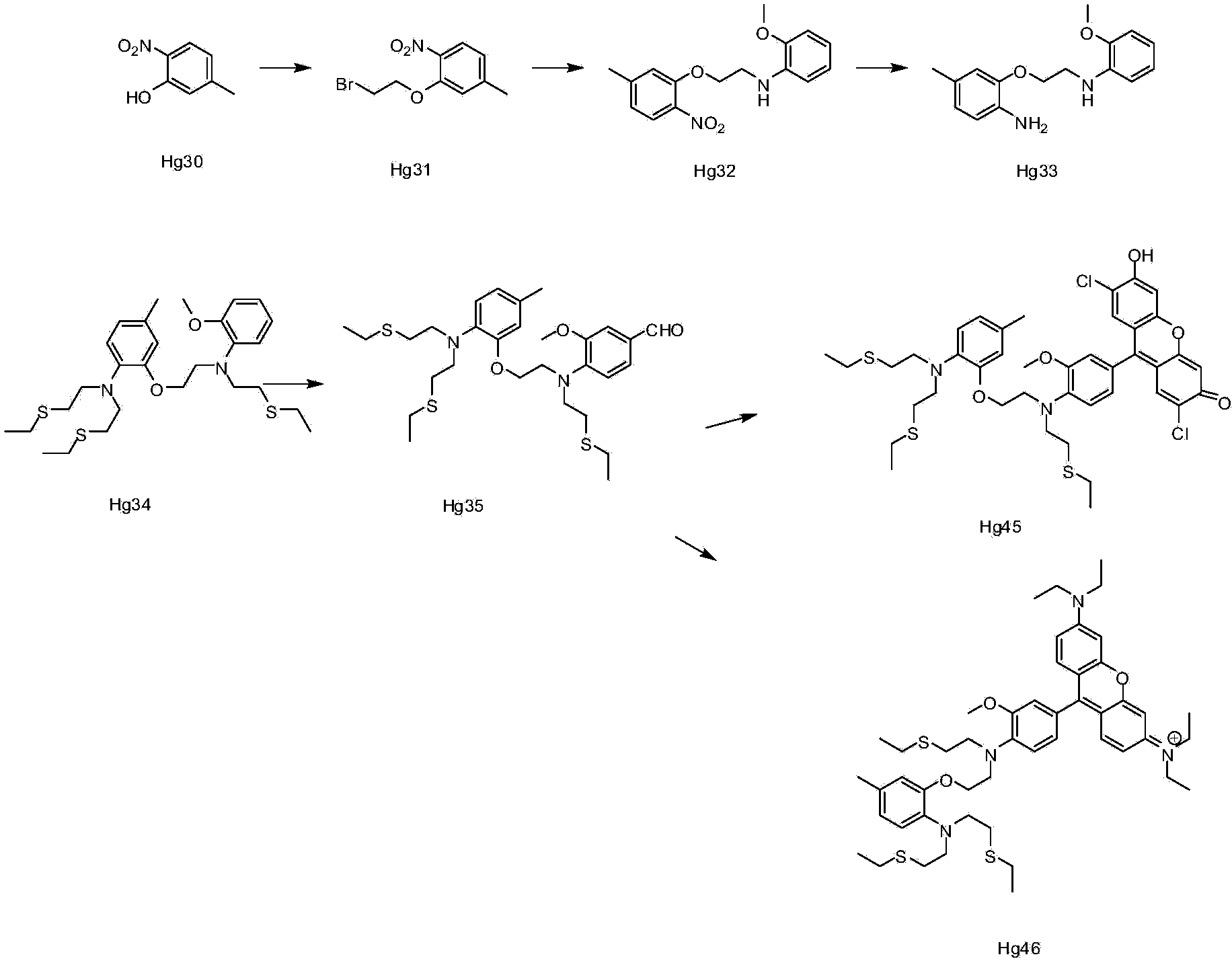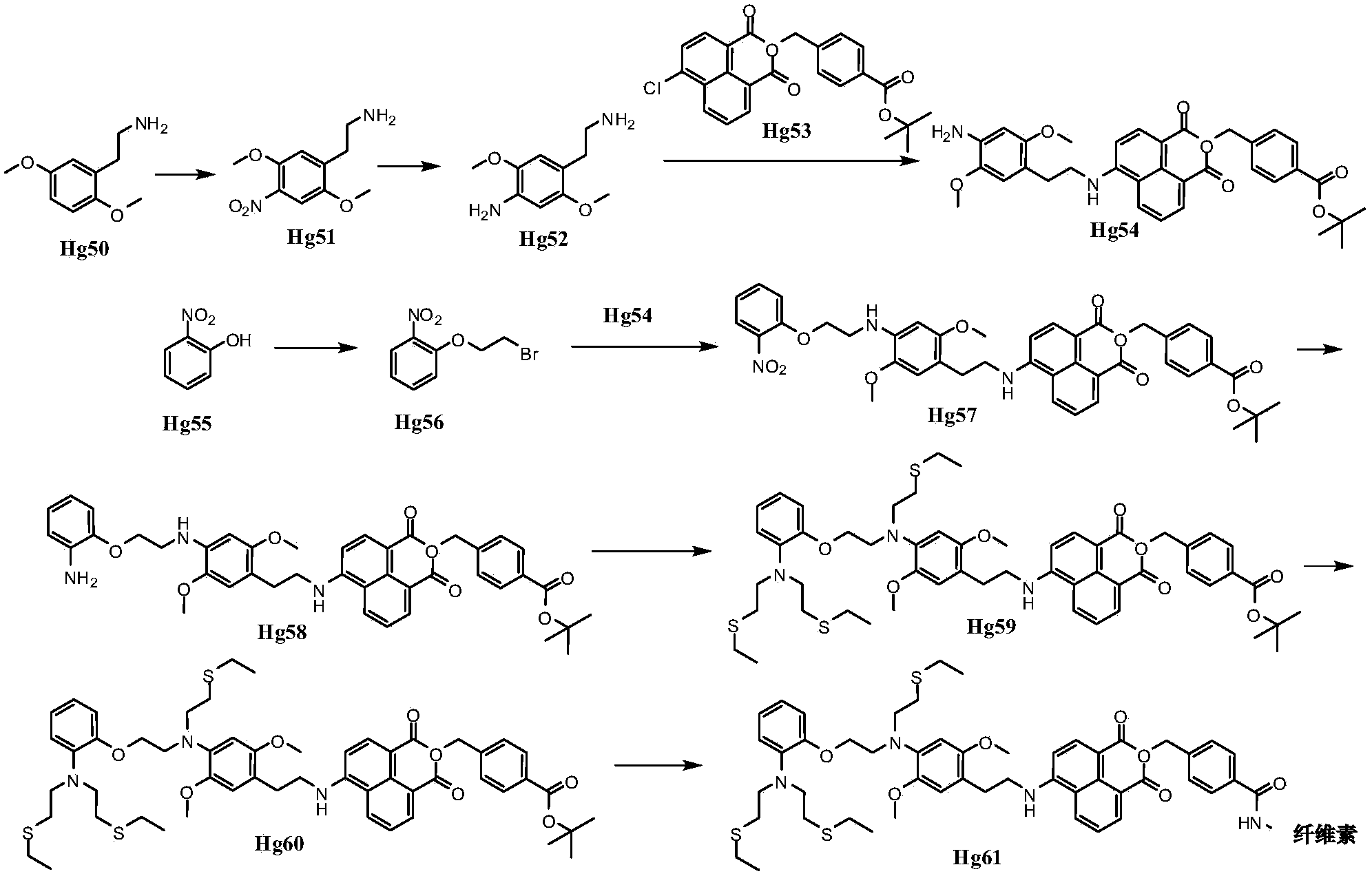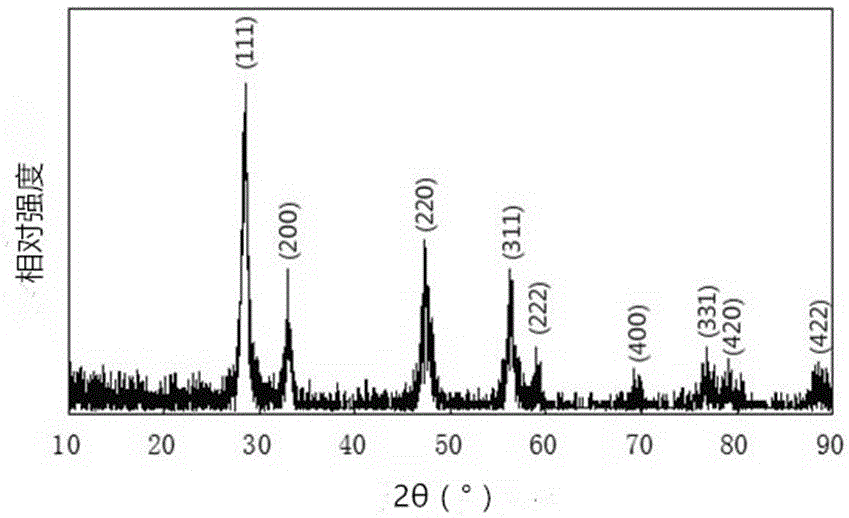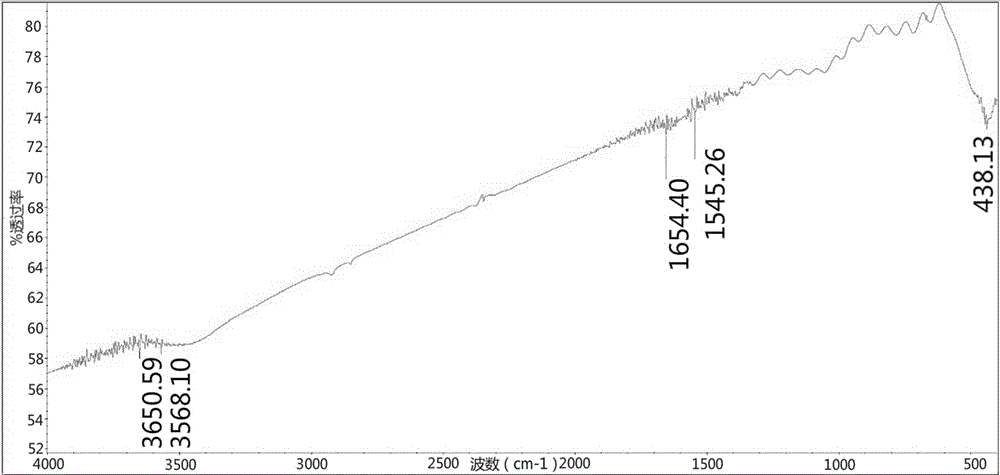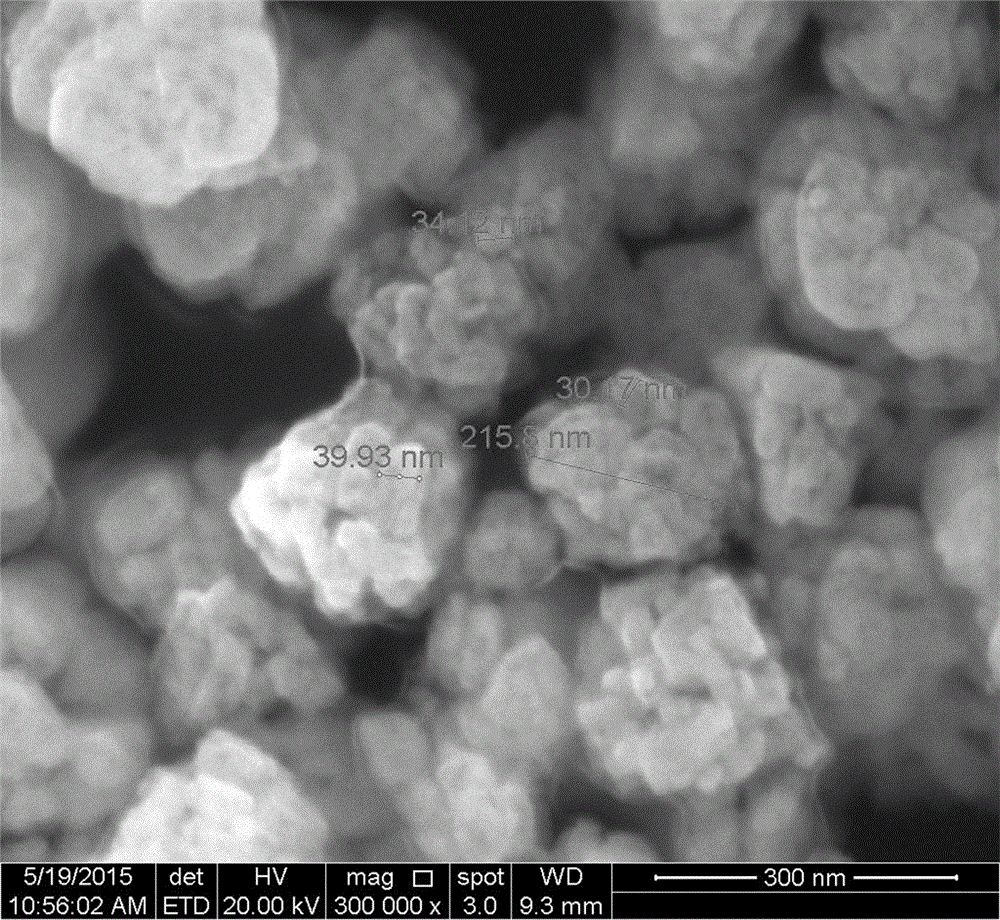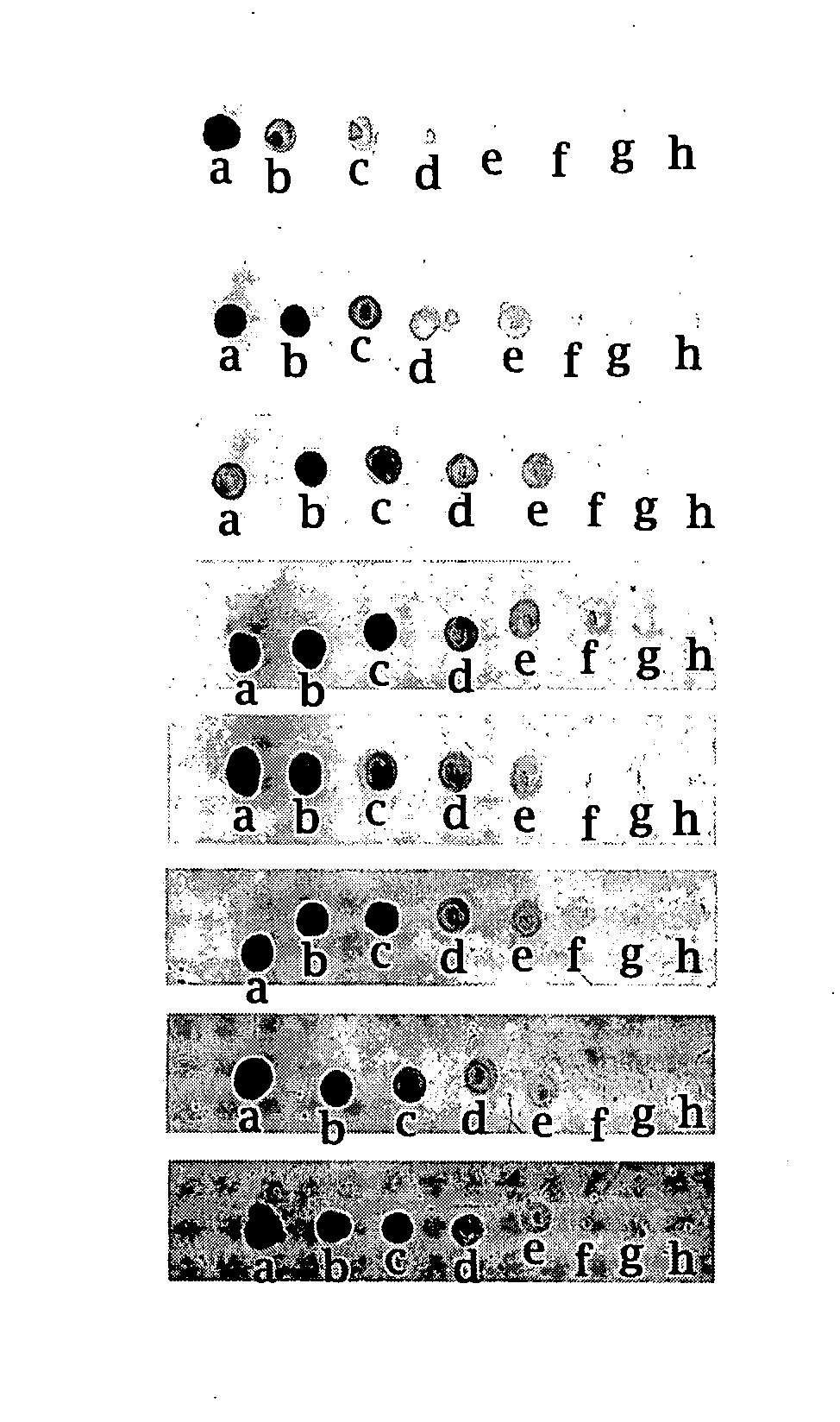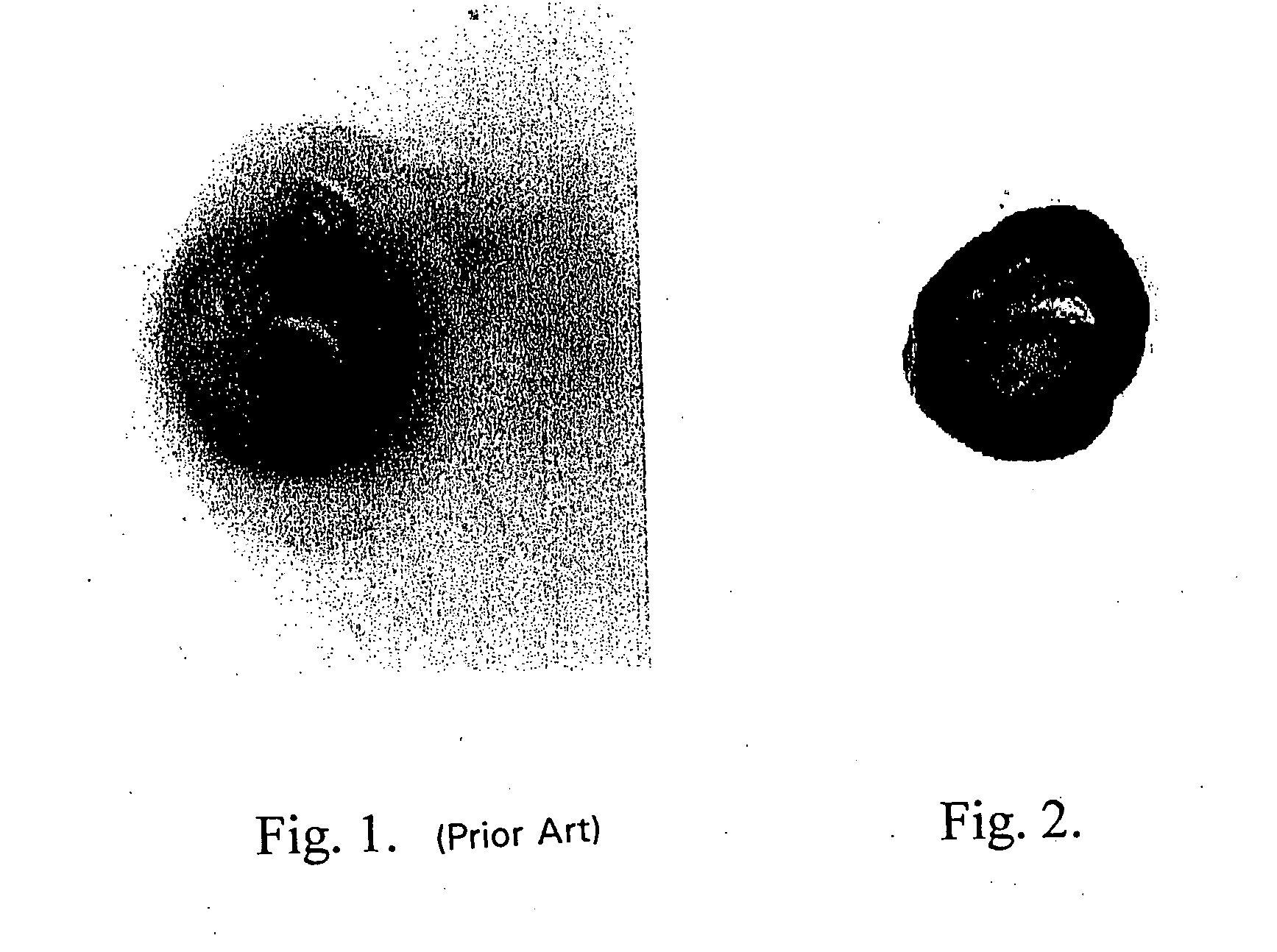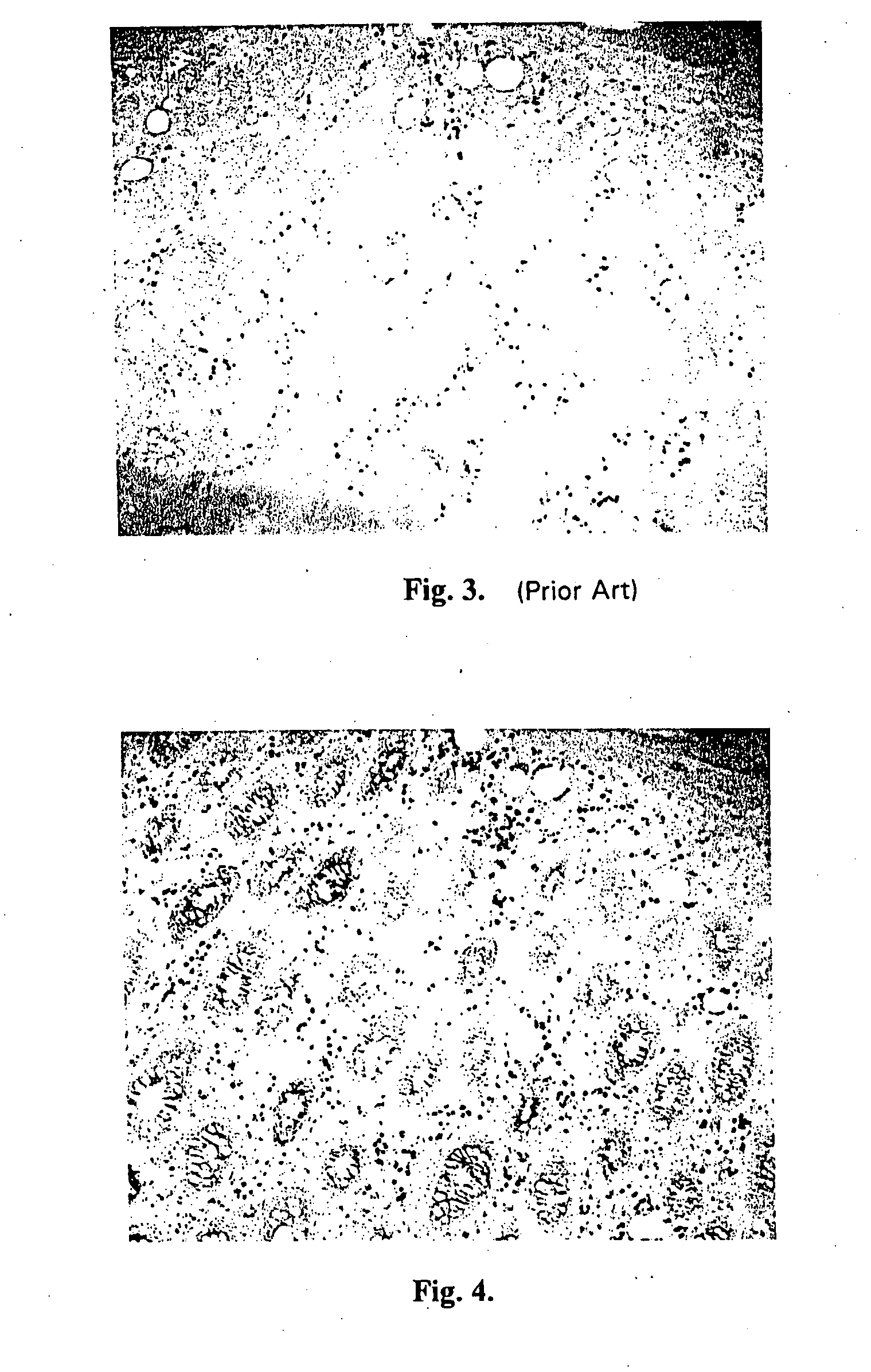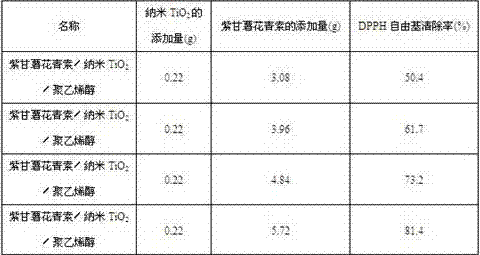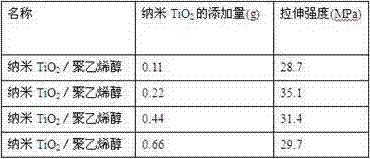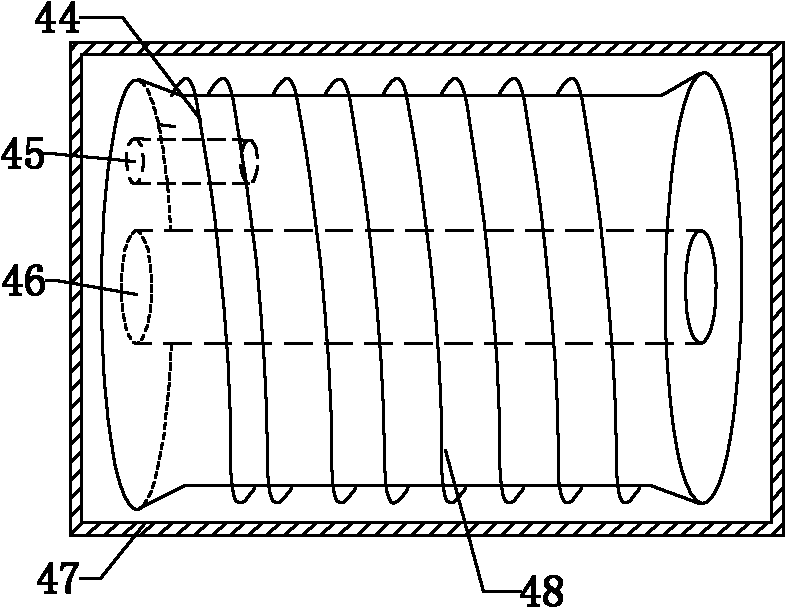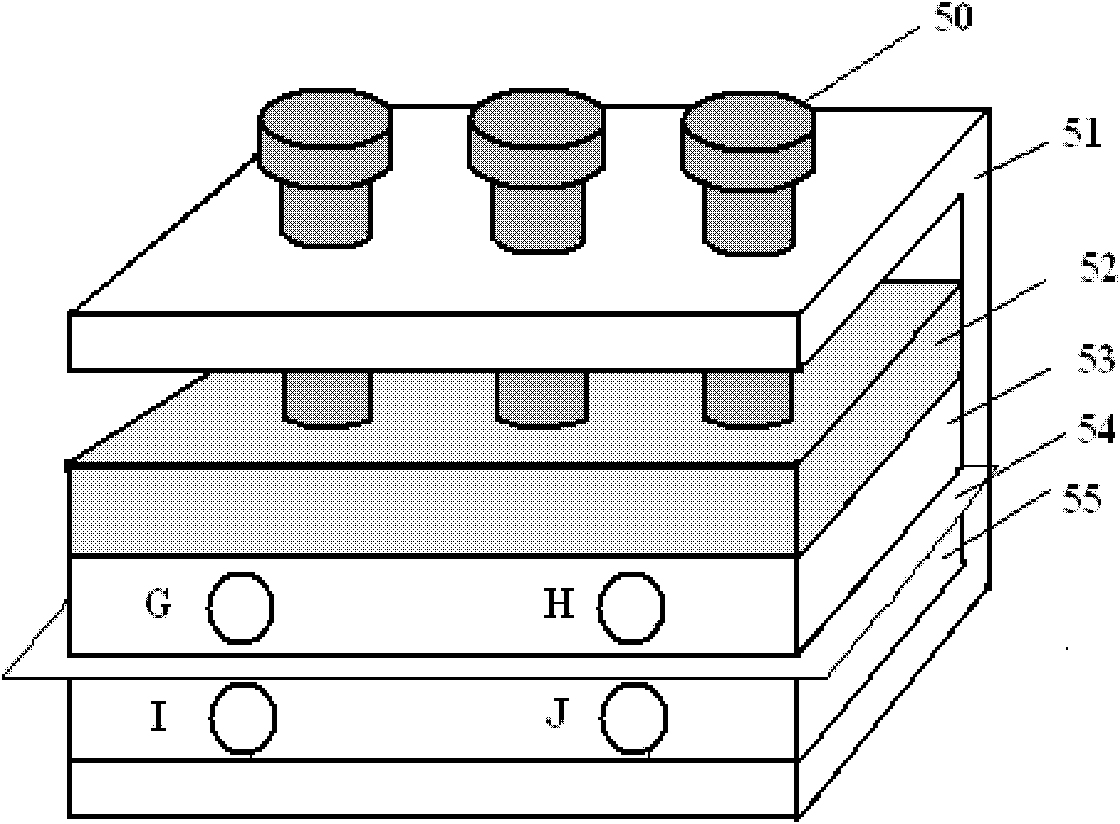Patents
Literature
Hiro is an intelligent assistant for R&D personnel, combined with Patent DNA, to facilitate innovative research.
594 results about "Chromogenic" patented technology
Efficacy Topic
Property
Owner
Technical Advancement
Application Domain
Technology Topic
Technology Field Word
Patent Country/Region
Patent Type
Patent Status
Application Year
Inventor
Chromogenic refers to photographic processes that work by forming a conventional silver image and then replacing it with a dye image. Most films and papers used for color photography today are chromogenic.
Chromogenic glazing
A transparent chromogenic assembly in which color changes are selectively effectable over predefined areas comprises a pair of facing transparent substrates (15, 21, 28) each covered with a conductive layer divided into individual energizeable areas each provided with a set of busbars (187, 188). A passive layer may be superimposed over one of the substrates, its color being chosen so that the color and the transmissivity of the passive layer accommodates the range of color change and transmissivity of the electrochromic layer to maintain the transmitted color of the panel in a warm or neutral shade. Various other chromogenic windows, devices and systems are also disclosed.
Owner:SCHOTT AG
Chromogenic window assembly construction and other chromogenic devices
A chromogenic window panel assembly, and a chromogenic skylight each includes an outer panel and a chromogenic member having an optical property which varies according to an applied signal. A chromogenic light pipe includes a light harvesting member and a chromogenic member having an optical property which varies according to an applied signal. A chromogenic vehicle sunroof, a chromogenic aircraft window assembly, and a chromogenic window assembly each includes a panel having a particular panel contour corresponding to a surface contour and a chromogenic panel having an optical property which varies according to an applied signal. A chromogenic block includes two panels and a chromogenic panel having an optical property which varies according to an applied signal.
Owner:DONNELLY CORP
Chromogenic window assembly construction and other chromogenic devices
A chromogenic window panel assembly, and a chromogenic skylight each includes an outer panel and a chromogenic member having an optical property which varies according to an applied signal. A chromogenic light pipe includes a light harvesting member and a chromogenic member having an optical property which varies according to an applied signal. A chromogenic vehicle sunroof, a chromogenic aircraft window assembly, and a chromogenic window assembly each includes a panel having a particular panel contour corresponding to a surface contour and a chromogenic panel having an optical property which varies according to an applied signal. A chromogenic block includes two panels and a chromogenic panel having an optical property which varies according to an applied signal.
Owner:DONNELLY CORP
Biodegradable Cross-Linked Cationic Multi-block Copolymers for Gene Delivery and Methods of Making Thereof
ActiveUS20120009145A1Easy to controlGuaranteed effective sizeCosmetic preparationsOrganic active ingredientsCross-linkGene delivery
A biodegradable cross-linked cationic multi-block copolymer of linear polyethylenimine (LPEI) wherein the LPEI blocks are linked together by hydrophilic linkers with a biodegradable disulfide bond and methods of making thereof. The biodegradable cross-linked cationic multi-block copolymer may also contain pendant functional moieties which are preferably receptor ligands, membrane permeating agents, endosomolytic agents, nuclear localization sequences, pH sensitive endosomolytic peptides, chromogenic or fluorescent dyes.
Owner:CLSN LAB
Biodegradable cross-linked cationic multi-block copolymers for gene delivery and methods of making thereof
ActiveUS8057821B2Easy to controlGuaranteed effective sizePowder deliveryGenetic material ingredientsCross-linkGene delivery
A biodegradable cross-linked cationic multi-block copolymer of linear polyethylenimine (LPEI) wherein the LPEI blocks are linked together by hydrophilic linkers with a biodegradable disulfide bond and methods of making thereof. The biodegradable cross-linked cationic multi-block copolymer may also contain pendant functional moieties which are preferably receptor ligands, membrane permeating agents, endosomolytic agents, nuclear localization sequences, pH sensitive endosomolytic peptides, chromogenic or fluorescent dyes.
Owner:CLSN LAB
Fluorescent Methods and Materials for Directed Biomarker Signal Amplification
ActiveUS20080293164A1Solid-state devicesPharmaceutical non-active ingredientsFluorescenceChromogenic
Methods and compositions are provided that include a multichromophore and / or multichromophore complex for identifying a target biomolecule. A sensor biomolecule, for example, an antibody can be covalently linked to the multichromophore. Additionally, a signaling chromophore can be covalently linked to the multichromophore. The arrangement is such that the signaling chromophore is capable of receiving energy from the multichromophore upon excitation of the multichromophore. Since the sensor biomolecule is capable of interacting with the target biomolecule, the multichromophore and / or multichromophore complex can provide enhanced detection signals for a target biomolecule.
Owner:SIRIGEN
Microcapsules having improved printing and efficiency
InactiveUS6544926B1Efficient use ofSharpness of image printing qualitiesPretreated surfacesGlass/slag layered productsChromogenicColloid
Dual shell microcapsule aggregate particles and copy materials coated therewith, such aggregate particles having inner shells surrounding chromogenic nucleus material, and outer shells encompassing multiple such inner shells to form aggregate particles thereof. The inner shells are derived from polar pre-polymer compositions. The outer shells are derived from complex colloids such as gelatin and gelatin derivatives. The outer shell material causes agglomeration of the inner shells into aggregate particles, thus increasing the sizes of the particles without increasing the sizes of the respective inner-shell microcapsules which contain the chromogenic material.
Owner:ENCAPSYS LLC
Sealants and conductive busbars for chromogenic devices
ActiveUS20110267673A1Improve performanceLow costCooking-vessel materialsAdditive manufacturing apparatusNanoparticleChromogenic
This invention discloses conductive busbars and sealants for electrooptic devices including electrochromic mirrors and windows. The conductive busbars are formed from materials comprising nanoparticles, and the sealants comprise of additives that promote a two phase morphology and use of adhesion promotion additives with crosslinkers. Methods to deposit busbars and then to connect these busbars to electrical connectors are also disclosed.
Owner:AJJER
Aqueous-Triggered Color-Appearing Inks
The invention describes a color-developing composition that contains at least four major components: (1) a leuco dye or a combination of leuco dyes, (2) an electron-withdrawing color-developer agent or a combination of color-developers that can form colored complexes with the leuco dyes, (3) a separator or combination of separators that when present in sufficient amounts, can prevent the formation of the colored complexes between the color-developer and leuco dyes, all contained within (4) an encapsulation matrix that includes at least one film-forming and one aqueous-insoluble polymer. All of the foregoing components are dissolved together in a volatile organic solvent medium to form a homogeneous solution that can be applied as an ink on substrates, which can be incorporated as part of absorbent articles or personal care products.
Owner:KIMBERLY-CLARK WORLDWIDE INC
Peptide substrates for HCV NS3 protease assays
InactiveUS6251583B1SsRNA viruses positive-sensePeptide/protein ingredientsPeptide substrateFluorescence
Novel chromogenic, fluorogenic and fluorescence polarization substrates which are useful in HCV NS3 protease and inhibitor assays.
Owner:MERCK SHARP & DOHME CORP
Thermo-sensitive discoloration material microcapsule and preparation method thereof
InactiveCN102477290AGood chemical stabilityGood solvent resistanceTenebresent compositionsMicroballoon preparationEmulsionChange color
The invention discloses a thermo-sensitive discoloration material microcapsule and a preparation method thereof. The microcapsule is composed of a core material and a wall material for covering the core material, wherein the core material comprises a thermo-sensitive discoloration compound composed of a chromogenic reagent, a color-developing agent and a solvent; the wall material is a melamine resin pre-polymer; the mass ratio of the thermo-sensitive discoloration compound to the melamine resin pre-polymer is 1:(1-2). The preparation method comprises the following steps of: mixing the chromogenic reagent, the color-developing agent and the solvent to form a thermo-sensitive discoloration solution under the heating condition; adding an emulsifying agent solution into the thermo-sensitive discoloration solution and emulsifying a commixed solution to obtain an emulsion; adjusting the pH value to 3-6 and adding the melamine resin pre-polymer into the emulsion; reacting at a temperature for 60-70 DEG C for 1-1.5 hours and then cooling to 30-40 DEG C; then adding a dispersant; and washing and drying to obtain the thermo-sensitive discoloration microcapsule. According to the method provided by the invention, the influences on human bodies and environments are greatly reduced; the operation is simple, the prepared microcapsule products can fast change color and fade and the effect is obvious, so that the thermo-sensitive discoloration material microcapsule can be widely applied in the fields of anti-counterfeiting textile and printing and the like.
Owner:BEIJING CTA TEX CHEM
Counterfeit-proof labels having an optically concealed, invisible universal product code and an online verification system using a mobile phone
The prevention of counterfeiting labels for various products is addressed by introducing counterfeit-proof labels having an optically concealed, invisible universal product code.The label is printed on a high-resolution micro optic photo chromogenic material. The color bars of the code are optically split and compressed in high resolution image elements and arranged at the pre-calculated optical blind angles in relation to the optical center of the lenticule and the viewing distance of the label, and due to the optical effect of the micro lenticule, the complete color product code is not visible when viewing at a normal viewing distance.The camera of a mobile phone photographs the label at a close-up distance, with the lens of the camera regrouping the split image elements of all the color bars to reconstruct the product code that will be displayed on the screen of the mobile phone. The consumer can match the printed reference code on the label or the product with the product code displayed on the screen for visual identification, or the color photo of the universal product code can be sent by the mobile phone installed with a related software to an Anti-counterfeiting Control Center for computer matching and verification and the consumer will be advised of the result in a matter of seconds.
Owner:LO ALLEN K
Fluorogenic dyes
Owner:NOVARTIS VACCINES & DIAGNOSTICS INC
Biodegradable cross-linked cationic multi-block copolymers for gene delivery and methods of making thereof
ActiveUS20060093674A1Effective particle sizeSafe and efficientPowder deliveryGenetic material ingredientsGene deliveryCross-link
A biodegradable cross-linked cationic multi-block copolymer of linear polyethylenimine (LPEI) wherein the LPEI blocks are linked together by hydrophilic linkers with a biodegradable disulfide bond and methods of making thereof. The biodegradable cross-linked cationic multi-block copolymer may also contain pendant functional moieties which are preferably receptor ligands, membrane permeating agents, endosomolytic agents, nuclear localization sequences, pH sensitive endosomolytic peptides, chromogenic or fluorescent dyes.
Owner:CLSN LAB
Conductive busbars and sealants for chromogenic devices
This invention discloses conductive busbars and sealants for electrooptic devices including electrochromic mirrors and windows. The conductive busbars are formed from materials comprising nanoparticles, and the sealants comprise of additives that promote a two phase morphology and use of adhesion promotion additives with crosslinkers. Methods to deposit busbars and then to connect these busbars to electrical connectors are also disclosed.
Owner:AJJER
Chromogenically tunable photonic crystals
Owner:UNIVERSITE DE MONCTON
Preparation of hydrophilic polymer and application thereof in detecting mercury ions based on change of fluorescence and color
InactiveCN102153700AIncrease contentQuick responseMaterial analysis by observing effect on chemical indicatorOrganic dyesSolubilityGlycidyl methacrylate
The invention discloses preparation of hydrophilic polymer and application thereof in detecting mercury ions based on the change of fluorescence and color, particularly a rhodamine B hydrazide grafted hydrophilic polymer probe applied to the detection of mercury ions in aqueous medium based on the change of fluorescence and color and a kit and test paper applied to the detection of the mercury ions by using the probe, belonging to the technical field of material preparation and heavy metal ion detection. The polymer containing a rhodamine chromophore is prepared by subjecting rhodamine B hydrazide and propylene oxide on the side chain of polyvinylpyrrolidone-glycidyl methacrylate which is a water-soluble polymer to ring-opening reaction, has good water solubility and can be applied to selectively detecting the mercury ions by using visual colorimetry and fluorescence detection. The probe realizes the high-sensitivity and high-selectivity rapid quantitative or semi-quantitative detection of the trace mercury ions in the aqueous medium, has a simple synthetic route, low cost and convenience of use, is applicable to amplified synthesis and actual production and has great application prospects in the field of medicine, biology and environmental science and the like.
Owner:JIANGNAN UNIV
Quick acting toxic ammonia test for aqueous samples
InactiveUS7033839B1Material analysis by observing effect on chemical indicatorWater/sewage treatmentAmmonia levelsColor response
A method, test reagent and device usable as a test strip for detecting toxic ammonia levels in water samples such as aquarium water. The volume of the water to be tested contacted with a soda lime reagent to raise the pH to at least 10, and simultaneously contacted with a hydrophobic barrier membrane capable of allowing only ammonia gas to pass through. The membrane is coated with a pH chromogenic indicator mixture which changes color if ammonia gas passes through. The color response of the sample is compared with standard color charts to determine the toxic ammonia potential.
Owner:HACH CO
Side-chain liquid crystal polymer with aggregation-induced emission property and preparation method thereof
InactiveCN107011469AEasy to synthesizeEasy to purifyLiquid crystal compositionsBenzaldehydeSide chain
The invention discloses a side-chain liquid crystal polymer with aggregation-induced emission property and a preparation method thereof. A substituted cyano-distyrene compound is generated by using a substituent-containing para benzaldehyde derivative and hydroxybenzyl cyanide through Knoevenagel reaction, so that, on one hand, the substituted cyano-distyrene compound can react with polymerizable double bond-containing acids such as saturated dihalide, methacrylic acid or acrylic acid in sequence to generate a polymerizable monomer and a side-chain liquid crystal polymer with a flexible spacer is obtained through free radical polymerization; and on the other hand, the substituted cyano-distyrene compound can directly react with polymerizable double bond-containing acyl chloride such as methacryloyl chloride or acryloyl chloride to generate the polymerizable monomer and a side-chain liquid crystal polymer free of the flexible spacer is obtained through free radical polymerization. A fluorescent chromogenic group and a liquid crystal unit are combined into one; the method is simple in synthesis and easy to purify, and the obtained polymer has an obvious aggregation-induced emission effect, has excellent liquid crystal property and has a good application prospect.
Owner:XIANGTAN UNIV
Copper ion test paper and method for preparing same
InactiveCN101545867ARealize detectionEasy to makeMaterial analysis by observing effect on chemical indicatorSteepingPotassium sodium tartrate
The invention discloses a copper ion test paper, which comprises a substrate (1) and chromogenic test paper (2) fixed on the substrate (1), and is characterized in that the chromogenic test paper (2) is prepared by steeping filter paper in a steeping fluid, taking out the filter paper from the steeping fluid and drying the filter paper, wherein the steeping fluid consists of the following components by weight: 0.07 to 1.4 percent of sodium diethyl dithiocarbamate, 5.7 to 11.4 percent potassium sodium tartrate, 0.036 to 0.71 percent of soluble starch, and 86.49 to 94.194 percent of distilled water. The invention also provides a method for preparing the copper ion test paper. The test paper has the advantages of simple fabrication, low cost, convenient use, no pollution to the environment, and favorability for environmental protection; and besides, the test paper has wide test range, is not required to be operated by a professional, and is particularly applicable to quick field test of copper content.
Owner:KUNMING BOYIN SCIANDTECH CO LTD
Irreversible humidity exposure dose indicator device
InactiveUS20080163673A1Simple to useIntuitive readingMaterial analysis by observing effect on chemical indicatorMeasurement apparatus componentsWater vaporEngineering
An irreversible humidity exposure dose indicator device, including a housing sealed at a first end thereof and adapted at a second end thereof to admit ambient gas ingress into an interior volume containing chromogenic material. The chromogenic material in contact with water irreversibly absorbs such water to produce a change whose extent is correlative of cumulative exposure of the device to humidity. The device may be configured as an indicator card including an intermediate permeable membrane coated on a first side thereof with a layer of a deliquescent solid and being in contact on a second side thereof with a layer containing a reactive indicator, with a water-permeable layer adjacent to the layer containing the deliquescent coating, enclosed within a water-impermeable transparent enclosure. The device can include an opening to the permeable layer that is shielded by a removable member that is removed to initiate the dosimetric process, and permit water vapor to diffuse through the opening and liquefy the deliquescent material, so that the liquid permeates through the membrane and a visible indication of the location of the wet front is seen as the water contacts the chromogenic material. A scale can be printed on the exterior of the enclosure to permit a viewer to see the progress of the indication, e, g. of a color front.
Owner:APPEALING PRODS
Organic compound for measuring content of metal ions in water environment and application of organic compound
ActiveCN103772318AMild reaction conditionsSafe reaction conditionsMaterial analysis by observing effect on chemical indicatorFluorescence/phosphorescenceChemical compoundFluorophore
The invention discloses an organic compound for measuring the content of metal ions in a water environment. The compound is characterized in that N-[2-(N'N'-bi(alkylthiolethyl)aminophenyloxyethyl]-N-alkylthiolethyl-2-alkoxyphenylamine is used as a metal ion complex, a chromophore or fluorophore is introduced to a molecule of the N-[2-(N'N'-bi(alkylthiolethyl)aminophenyloxyethyl]-N-alkylthiolethyl-2-alkoxyphenylamine, and then, a color development indicator or fluorescent indicator of metal ions and particularly mercury, lead and silver ions is generated. The compound disclosed by the invention can also be fixed on a hydrophilic superpolymer, can be prepared into a nonexpendable reversible metal ion fluorescent probe by utilizing the characteristic of the chromophore or fluorophore, and can be suitable for continuously detecting the concentration of metal ions in various environments and particularly suitable for continuously detecting the concentration of mercury ions.
Owner:TIANJIN HEOWNS BIOCHEM TECH
High temperature resistant thermosensitive paper
Disclosed is high temperature resistant thermosensitive paper, a precoating is applied on the original thermosensitive paper; hollow ball resin is added in the precoating paint, a chromogenic layer is applied on the paper with the precoating; and a protective layer is applied on the paper with the chromogenic layer. The chromogenic layer comprises leuco dye, oxidant, sensitizer, lubricant, adhesive, filling calcining soil and anti-aging preparation. The protective layer is acrylamide and epichlorohydrin. In the novel thermosensitive paper process, color development occurs at 180 DEG C, and the bottom color occurs at 150 DEG C so as to solve the problem that common thermosensitive paper does not resist high temperature.
Owner:HENAN JIANGHE PAPER
Mesoporous flower-shaped CeO2, as well as preparation method and application thereof
InactiveCN105731515AThe preparation process is matureEasy to operateRare earth metal oxides/hydroxidesMaterial nanotechnologyCeriumHigh pressure
The invention belongs to the technical field of water treatment, and relates to mesoporous flower-shaped CeO2, a preparation method thereof and an application thereof as mimic oxidase to degrade wastewater containing reactive light yellow. The mesoporous flower-shaped CeO2 is a hollow type crystal consisting of a plurality of small particles with an average particle diameter of 214 nm. The preparation method comprises the following steps: firstly, by adopting CeCl3.7H2O as a cerium source, adopting urea as a precipitator and adopting PVP as a surfactant, preparing a CeO2 precursor under high pressure at a high temperature through a hydrothermal method; and roasting the precursor at a high temperature, thereby preparing a light yellow CeO2 nano material. According to the TMB chromogenic reaction, the prepared CeO2 has characteristics of mimic enzyme. The mesoporous flower-shaped CeO2 is used for reactive light yellow catalytic degradation reaction, so that the degradation rate of the reactive light yellow can be about 95% under the optimum proportion condition, and therefore, the mesoporous flower-shaped CeO2 has relatively good application prospects.
Owner:ZHENGZHOU UNIVERSITY OF AERONAUTICS
Combined reagent for detecting peroxide value of edible oil and fat and detection method thereof
InactiveCN102706872AImprove intuitive effectSimple and fast operationMaterial analysis by observing effect on chemical indicatorOrganic solventChromogenic
The invention discloses a combined reagent for detecting the peroxide value of edible oil and fat and a detection method thereof. The combined reagent comprises a solvent, a reduction reagent and a chromogenic reagent, wherein the solvent is a polar organic solvent for dissolving a sample; the reduction reagent is used for reducing peroxide in the to-be-detected sample; and the oxidized reduction reagent reacts with the chromogenic reagent to produce a colored precipitated complex compound, namely ferric thiocyanate. The invention further discloses the detection method using the combined reagent. The detection method has the benefits that a colorimetry principle is adopted by the combined reagent, and the peroxide value of the to-be-detected sample is detected through reagent discoloration and chroma intercomparison, so that the detection method is simple, convenient and rapid and has high accuracy.
Owner:INST AGRO PROD PROCESSING ANHUI ACADEMY AGRI SCI
Site-specific enzymatic deposition of metal in situ
InactiveUS20070224625A1Easily rate of reactionMore sensitive detectionMicrobiological testing/measurementDisease diagnosisChromogenicMetal particle
The present invention provides compositions, kits, assembles of articles and methodology for carrying out processes that permit biological enzymes to act directly on metals and metal particles. In particular, the invention relates to use of enzymes to selectively deposit metal to the vicinity of a target molecule. The invention also relates to linking of metals to enzyme substrates, control of enzymatic metal deposition and applications of enzymatic metal deposition to sensitively and selectively detect target molecules such as biomarkers in various biological samples, such as chromogenic immunohistochemical (IHC) detection in situ by using bright field light microscope.
Owner:NANOPROBES
Preparation method for intelligent chromogenic antibiosis antioxidant freshness-retaining film
InactiveCN107082896AModerate fluidityModerate viscosityPhysical/chemical process catalystsAntioxidantOxidation resistant
The invention provides a preparation method for intelligent chromogenic antibiosis antioxidant freshness-retaining film. The method comprises the following steps: firstly preparing a mother solution of polyvinyl alcohol, adding nanometer titanium dioxide to prepare a PVA-nano TiO2 mixed solution, stirring fully, curtain coating on a glass plate through the solution, drying to form a film in an oven, measuring the mechanical properties and antibacterial properties of the film, screening out an optimum adding ratio of nano TiO2, preparing a purple sweet potato anthocyanin solution separately, added the purple sweet potato anthocyanin solution to a solution with an optimum mixing ratio, after stirring fully, curtain coating on the glass plate through the solution, and drying to form the film in the oven. Compared with other saccharides and protein-like films, the film has good mechanical properties, the combination of antibacterial properties and antioxidant properties can better extend the shelf life of food, the films can exhibit different color changes in different pH environments, and the film combines chromogenic, antibacterial, and antioxidant properties and has a wide range of uses in food packaging.
Owner:SHANGHAI OCEAN UNIV
Automatic analyzer of water soluble sulfide and analysis method
ActiveCN102253231ATest accuratePreparing sample for investigationColor/spectral properties measurementsPeristaltic pumpData connection
The invention discloses a full-automatic analyzer of a water soluble sulfide compound and an analysis method. The full-automatic analyzer comprises a sample pretreatment device and a chromogenic detection device, wherein the sample pretreatment device comprises an autoinjection device, a first peristaltic pump, a distillation reagent container, a first triple valve, a first line heat module, an on-line distillation module and an on-line degasser; and the chromogenic detection device comprises a second peristaltic pump, a current carrying bottle, a developer bottle, a ferric chloride solution bottle, a sampling ring, a six-way valve, a second backpressure regulator, a second triple valve, a first knotted reactor, a third triple valve, a second line heat module, a flow-through cell, a detector, a waste liquid bottle, a data connection cable, a computer processing system and a first backpressure regulator. The invention also discloses an analysis method of the water soluble sulfide compound. According to the full-automatic analyzer of the water soluble sulfide and the analysis method, samples can be continuously and automatically tested with the detection limit being 1 microgram / L, and the test is accurate and rapid.
Owner:BEIJING JITIAN INSTR CO LTD
Reversible thermochromic organic material microcapsule
InactiveCN102191032AReduce sizeUniform particle sizeTenebresent compositionsMicroballoon preparationOrganic solventGranularity
The invention relates to a reversible thermochromic organic material microcapsule which comprises a solvent, an organic chromogenic reagent, a developer, an emulsifier and a shell material. The reversible thermochromic organic material microcapsule is prepared by the following steps: dissolving the organic chromogenic reagent and developer in the organic solvent, adding the emulsifier, dispersing to required granularity, and adding the shell material to obtain the microcapsule, wherein the emulsifier is styrene maleic anhydride. By using the styrene maleic anhydride as the emulsifier, the invention overcomes the defects in other modes for preparing microcapsules, and has the advantages of high controllability, suitable microcapsule size, uniform granularity and favorable thermochromic effect.
Owner:陈铨荣
Features
- R&D
- Intellectual Property
- Life Sciences
- Materials
- Tech Scout
Why Patsnap Eureka
- Unparalleled Data Quality
- Higher Quality Content
- 60% Fewer Hallucinations
Social media
Patsnap Eureka Blog
Learn More Browse by: Latest US Patents, China's latest patents, Technical Efficacy Thesaurus, Application Domain, Technology Topic, Popular Technical Reports.
© 2025 PatSnap. All rights reserved.Legal|Privacy policy|Modern Slavery Act Transparency Statement|Sitemap|About US| Contact US: help@patsnap.com
